副詞節を導く従位接続詞
英語で「いつ」「どこで」「なぜ」「もし〜なら」をスムーズに言うには、
従位接続詞(when, because, if など)で
副詞節(説明のまとまり)を作るのが近道です😊
このレッスンでは、意味ごとに整理して「使い分けの感覚」を身につけます。
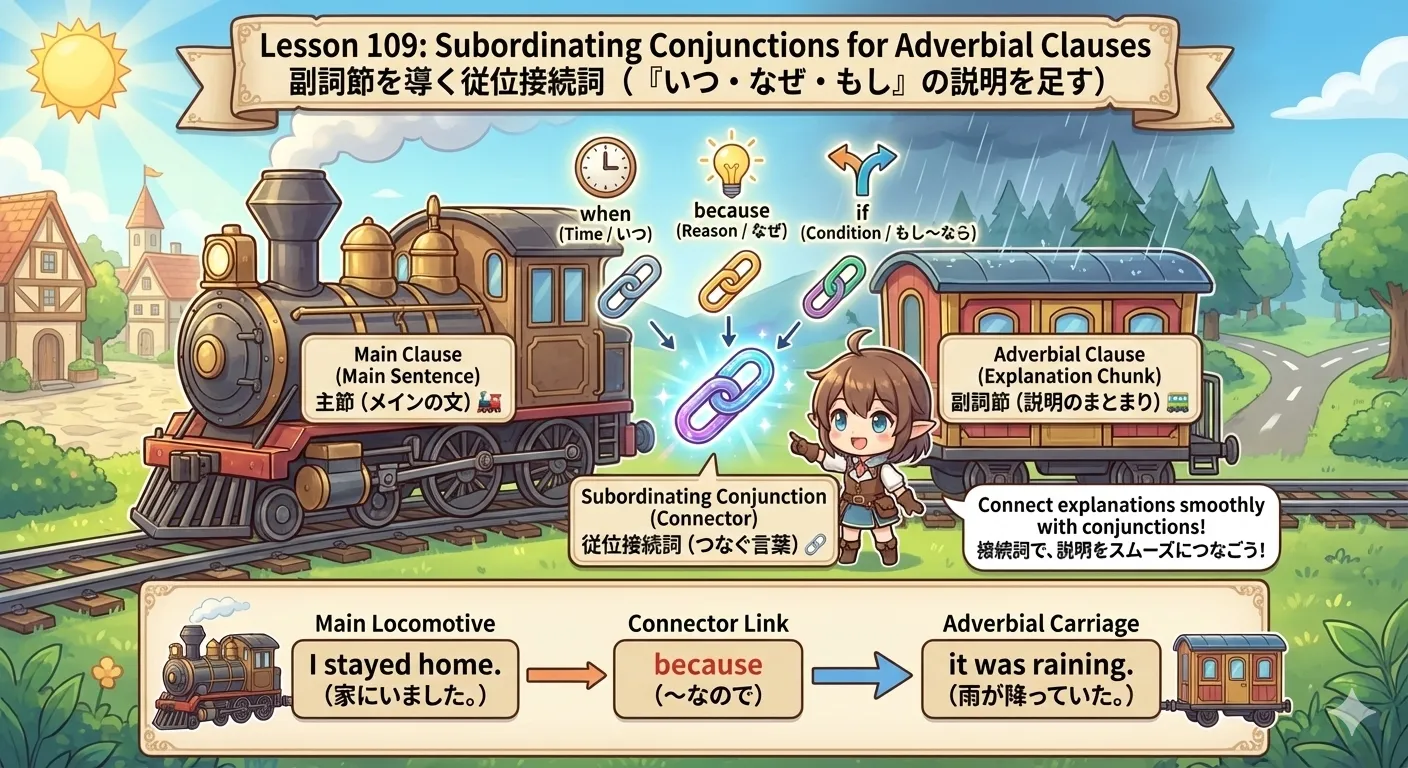
🎯 このレッスンでできるようになること
- 「理由」「条件」「時」など、意味の種類で接続詞を選べる
When + 文/Because + 文/If + 文のように、文のカタマリをつなげられる- 長い英文でも「どこが説明部分?」が見えて、読みやすく・書きやすくなる
今日は「1章だけ」でも前進です。小さな達成は、学習を続けるいちばん強い燃料になります🔥
I stayed home because it was raining.
(雨が降っていたので、家にいました。)
まずはこの形を“型”として覚えると、他の接続詞にも一気に広げられます😊
▮ 目次
✅ 迷ったら 「1 → 2 → 3 → 4 → 総まとめ」 の順がおすすめです。
📱 スマホは「見たい章だけ」開けばOK(子項目は折りたたみ式)。
-
1. 副詞節を導く従位接続詞(まずは全体像) 最初にここ「
接続詞 + 文」が、文の中で “時・理由・条件” などを説明するイメージをつかみます。 -
2. 時を表す(when / while / as / since ...) 最重要「いつ?」を答える節。
whenとwhileの感覚差(点/幅)をここで固めます⏰-
↳ 2-1.
when:「〜するとき/するとすぐに/いつも〜すると」“点”の時刻・きっかけ。会話でも超頻出。 -
↳ 2-2.
while:「〜する間/〜するうち」“幅(期間)”がポイント。進行形と相性◎。 -
↳ 2-3.
as:「〜している時/〜した途端に/〜しながら」“同時っぽさ”が強い。意味が多いので見分けも。 -
↳ 2-4.
since:「〜以来/〜してからずっと」“起点”を作る。主節が完了形になりやすい。 -
↳ 2-5.
after:「〜した後で/〜してから」“順番が後”。未来の話でも節は現在形になりやすい。 -
↳ 2-6.
before:「〜する前に/〜しないうちに」“順番が前”。beforeの「間に合う感」も押さえる。 -
↳ 2-7.
until / till:「〜するまで/〜するまでは…しない」“期限”を作る。否定とセットの意味も重要。 -
↳ 2-8.
once:「ひとたび〜すると/〜してしまえば」“一回スイッチが入ると…”のニュアンス。 -
↳ 2-9.
by the time:「〜までに/〜する時までには」“締切”系。主節が完了形になりやすい。 -
↳ 2-10.
each time:「〜するたびに」“毎回”。心の反応・習慣の描写に強い。 -
↳ 2-11.
every time:「〜するたびに」“いつも”。強めの反復で感情表現にも◎ -
↳ 2-12.
the first time:「最初〜したとき」“初回イベント”。物語が一気に自然になる。
-
↳ 2-1.
-
3. 場所を表す(where / wherever)「どこで?」を説明する節。
whereverは「どこでも」の広がりがポイント📍-
↳ 3-1.
where:「〜する所に/所はどこへでも」場所の“ピンポイント”。 -
↳ 3-2.
wherever:「〜する所はどこでも/どこに〜しようとも」場所の“無制限”。
-
↳ 3-1.
-
4. 原因や理由を表す(because / since / as / that ...)「なんで?」を作る節。
becauseは強い理由、since/asは“前提っぽい理由”が多い💡-
↳ 4-1.
because:「〜だから」最も直接的で強い理由。 -
↳ 4-2.
since:「〜だから/〜ゆえに」“もう分かってるよね”系の理由になりやすい。 -
↳ 4-3.
as:「〜だから」理由としては控えめ。別の意味も多いので注意。 -
↳ 4-4.
that:「(感情)〜なので」glad / happyなど感情形容詞と相性◎ -
↳ 4-5.
now (that):「今や〜だから」状況が変わった“今”を理由にする。 -
↳ 4-6.
seeing (that):「〜であるからには」“見れば分かる”感の理由。やや硬め。 -
↳ 4-7.
considering (that):「〜を考えると」“条件を踏まえて”の理由づけ。
-
↳ 4-1.
-
5. 目的を表す(so that / in order that / ...)「〜するために」。助動詞が入りやすいのが目印🎯
-
↳ 5-1.
so (that):「〜するために/〜となるように」口語で一番よく使う。 -
↳ 5-2.
in order that:「〜する目的で」文語寄り。丁寧で硬め。 -
↳ 5-3.
for fear (that):「〜しないように」否定語なしで“否定目的”。 -
↳ 5-4.
in case:「〜するといけないから」“念のため”の用心。 -
↳ 5-5.
lest:「〜しないように」やや古風・文語。見かけたら得点。
-
↳ 5-1.
-
6. 結果を表す(so ... that / such ... that)「とても〜なので、結果として…」。強調の語順も登場⚡
-
↳ 6-1.
so + (形/副) + that:「それで/そのため」“程度の強さ” → 結果へ。soで「どれくらい?」を強調します⚡ -
↳ 6-2.
such + 名詞 + that:「非常に〜なので…」“名詞のすごさ” → 結果へ。suchで「何がすごい?」を強調します🎯
-
↳ 6-1.
-
7. 譲歩を表す(though / although / even if ...)「〜だけれども」。反対条件(逆風)を置いても、主節はちゃんと成立する🌀 見分けは
even though(事実) /even if(仮定) /〜 as 〜(倒置) /while(対比の譲歩)。-
↳ 7-1.
though / although:「〜だけど」どちらも逆接。「thoughは会話寄り」「althoughは文章寄り」をつかみます🗣️📄 -
↳ 7-2.
形/副/名 + as:「〜だけれども」(倒置の譲歩)先に強調してから「でも〜」へつなぐ倒置の譲歩(例:Tired as I was)。 名詞が前に出るときは冠詞を付けない形になりやすいのも目印。 -
↳ 7-3.
V + as + S + may/will:「どんなに〜しても」「どんなに〜してみても」。Try as I mayみたいに、努力しても状況が変わらない“強い譲歩”を文章で作れる。 -
↳ 7-4.
even if:「たとえ〜だとしても」(仮定の譲歩)仮定の譲歩。「起きるか分からないけど、起きても主節は同じ」という形(たとえ〜だとしても)。 -
↳ 7-5.
even though:「実際に〜なのに」(事実の譲歩)事実の譲歩。「実際に〜なのに」。現実の情報を前置きして、“それでも主節”へ進める。 -
↳ 7-6.
whether ... or ...:「AでもBでも」「AでもBでも」。選択肢を並べてどっちでも結論は同じを一発で言える(“両方OK”の整理)。 -
↳ 7-7.
no matter + 疑問詞:「何が/誰が…でも」「何が/誰が/どこで…でも」。no matter whatなどで例外なしを強く押し出す(押しが強いタイプ)。 -
↳ 7-8.
while(譲歩):「〜なのに/一方で」(対比)時間のwhileじゃなくて対比の「〜なのに/一方で」。文頭に来ることが多く、上品な逆接になる。
-
↳ 7-1.
-
8. 条件を表す(if / unless / as long as ...)「もし〜なら」。条件節は未来の話でも現在形になりやすいのが大定番🔑 見分けは
unless(否定条件) /in case(万が一) /providing・on condition(硬めで条件を明示)。-
↳ 8-1.
if:条件の基本「もし〜なら」条件(もし〜なら)→ 結果、の土台。節(文のかたまり)の置き場所も確認します。 -
↳ 8-2.
unless:〜でない限り(if not の省エネ)if notを1語で言える省エネ表現(否定条件を短く締める)。 -
↳ 8-3.
in case(条件):万が一〜なら起こる確率が低めの含み。目的のin case(念のため)と近いので文脈で判定。 -
↳ 8-4.
as / so long as:〜する限り・〜さえすれば必要条件のしばり。 ※10-1(期間のas long as)と混同しやすいので、意味で切り分け。 -
↳ 8-5.
suppose / supposing (that):仮に〜なら?思考実験。相談・提案・質問の導入でよく使う(話をやわらかく始められる)。 -
↳ 8-6.
providing / provided (that):その条件なら(やや文語)条件をきっちり明示して文語(かたい文章)っぽい丁寧さ・正式感が出せます。 -
↳ 8-7.
on condition (that):〜という条件で(取り決め感)契約・約束の香りが強く、条件提示の硬さが出る。
-
↳ 8-1.
-
9. 様態を表す(as / like / as if)「どんなふうに?」の説明🎭 3点セットで覚える:
as=その通りに(方法) /like=〜みたいに(似てる) /as if=まるで〜みたいに(見え方)。as ifは仮定法っぽい形が出ることも。-
↳ 9-1.
as:その通りに(方法・手順)「言われた通りに」のas。やり方が一致する感じをつかみます。 -
↳ 9-2.
like:〜みたいに(似てる・雰囲気)口語で軽めのlike。名詞と相性がよい「似てる」を整理します。 -
↳ 9-3.
as if / as though:まるで〜みたいに(見え方・距離感)見た目はそうでも事実とは限らない、という“距離感”が出る。仮定法(想像の話)っぽさも入口だけ紹介します。
-
↳ 9-1.
-
10. 制限や範囲を表す(as long as / as far as)「どこまで?どれくらいまで?」の範囲しばり📏 条件というより「レンジ(期間・知識・できる範囲)」を決める表現。特に
as far as I knowは超定番。-
↳ 10-1.
as long as(範囲):〜の間ずっと(期間レンジ)8-4の条件(〜する限り)と同じ形なので、意味(期間 or 条件)で判断。 -
↳ 10-2.
as / so far as(範囲):知ってる限り・できる限り知識・到達範囲の定番で、as far as I know/as far as possibleが鉄板。
-
↳ 10-1.
-
🧾 総まとめ:副詞節を導く従位接続詞の要点チェック 迷ったらここ「意味(時・理由・条件…)」と「見分け(when/while/as など)」を1分で回収して、理解を固めます✅
1. 副詞節を導く従位接続詞(まずは全体像)
when / because / if / though などは、 「文のかたまり(副詞節)」を足して 「いつ?どこで?なぜ?どんな条件で?」を説明します🧩 まずは“地図カード”で全体を一枚にまとめて、あとから迷子にならないようにしましょう🧭✨ 💡 続けるコツ: 今日は「副詞節=主節に“情報を追加する文”」だけ掴めばOK!理解が増えるたびに脳はごほうびを感じて、次も続けやすくなります🔥
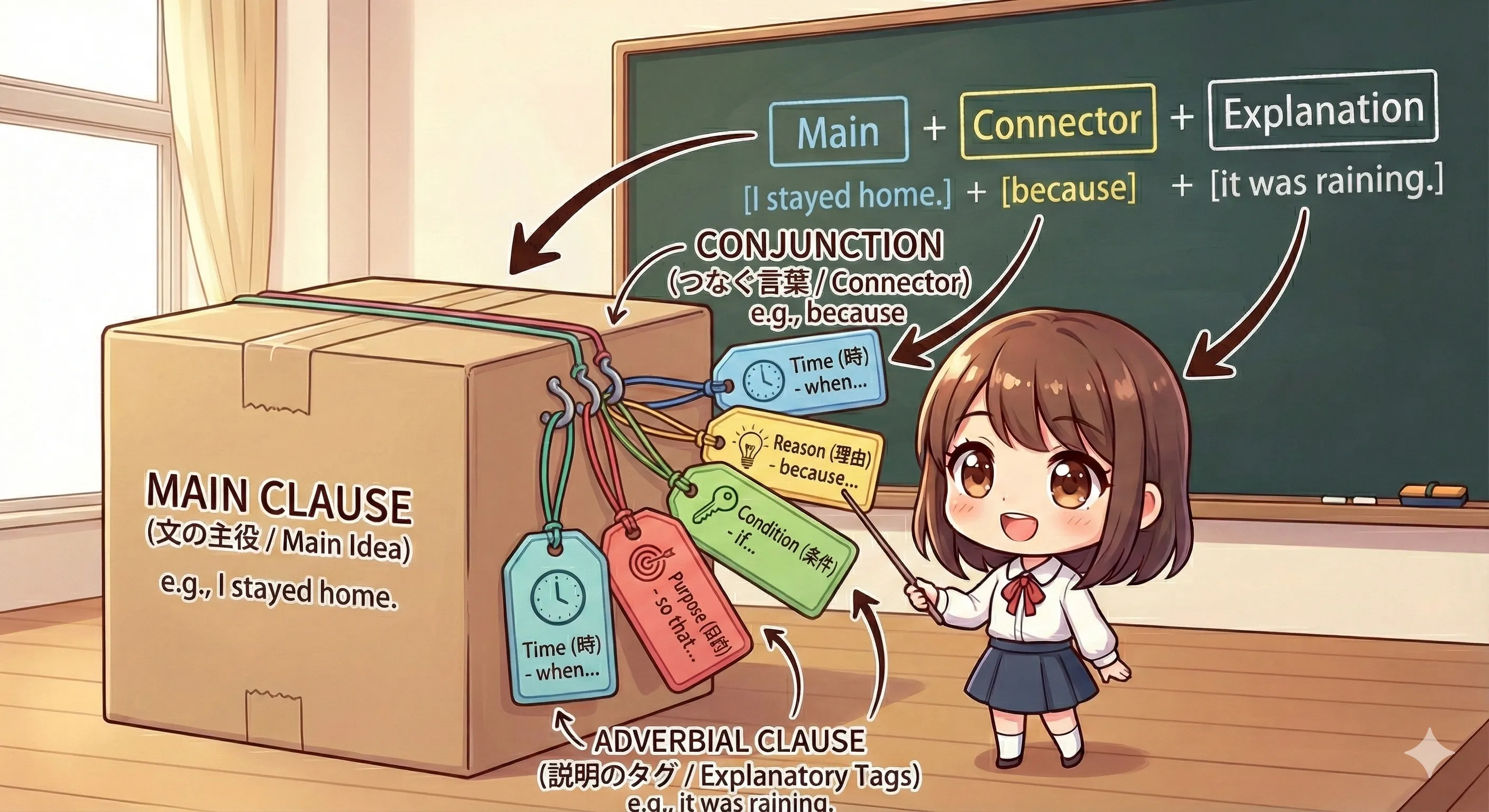
副詞節は、主節(メインの文)を説明する文です。 つまり「主役(主節)」に「いつ?どこで?なぜ?もし?なのに?」などの情報を足して、 文をもっと正確にします🎯
🎨 骨格の見せ方:主節(主役) + 副詞節(説明)
例:I smiled. (私は笑った。)
例:when I saw you (あなたを見たとき)
I smiled when I saw you .
(あなたを見たとき、私は笑った。)
-
接続詞(ここでは
when)が、 副詞節のスタート合図🏁 - 主節は主役。まずここだけ読んでも意味が取れる🎯
- そのあとに「いつ?なぜ?もし?」を足すと、文が一気にわかりやすくなる📌
脳は「分類できた!」だけで、学習を“成功体験”として記録します✅ まずは主節=主役、副詞節=説明の2色ルールだけ覚えればOKです。
🧭 見分けの3つの軸(これだけで迷子になりにくい)
when/while/because/if/though など
so ... that / such ... that / no matter + wh- / 形 + as など
3つの軸は「迷いを減らすチェックリスト」✅ まずは軸①(意味)→軸②(接続詞)→軸③(型)の順に見るだけで、理解が急に安定します。
🗺️ 地図カード:読む前の道しるべ(全体を1枚で)
when / while / as / since / after / before / until …
where / wherever
because / since / as / now (that) …
so (that) / in order that / for fear (that) / in case / lest
so + 形/副 + that / such + 名詞 + that
though / although / even if / even though / while …
if / unless / as long as / provided / on condition …
as / like / as if / as though
as long as(範囲) / as far as
最低限の注意点(ここだけ覚えればOK)
- 副詞節は「主節を説明するおまけ文」。主役はいつも主節👑
-
同じ単語でも意味が変わることがある:
as(時/理由/様態)やwhile(時/譲歩)など。→ 迷ったら軸①(意味)へ戻る🧭 -
条件・時は「未来の話でも節は現在形になりやすい」ことが多い(例:
If it rains, I will...)🔑 ※細かい例外は各セクションで扱うので、ここでは“傾向”として覚えればOK。
⏱️ ミニ診断(1分チェック)
直感でOK!「この節は何を表す?」を選ぶだけで、分類の感覚がつかめます✅
I stayed home because it was raining.
(雨が降っていたので、家にいた。)
because は「なぜなら〜」の入口になりやすい🚪
I’ll call you when I arrive.
(着いたら電話するね。)
when は「いつ?」を足すことが多い⏰
I’ll go even if it rains.
(たとえ雨が降っても、行くよ。)
even if は「たとえ〜でも」の仮定の逆風🌀
2. 時を表す(when / while / as / since ...)
ここでは、「いつ起きた?」を説明する
副詞節(文のかたまりで“追加説明”する部分)
をまとめて案内します🕰️
キーワードは when while as since before after など。
それぞれに 得意な時間の形(瞬間/最中/順番/期限/回数) があるのがポイントです。
ここでは詳しい説明に入る前に、「まずはざっくりイメージをつかむ」ことを目標にしましょう。
むずかしい用語が出てきたら、 (小学生にもわかる言いかえ) を一緒に添えます。たとえば「継続(ずっと続くこと)」「起点(スタート地点)」のように、意味がすぐ浮かぶ形にします😊
従位接続詞 × 時 入口(案内) Lesson 109 / Section 2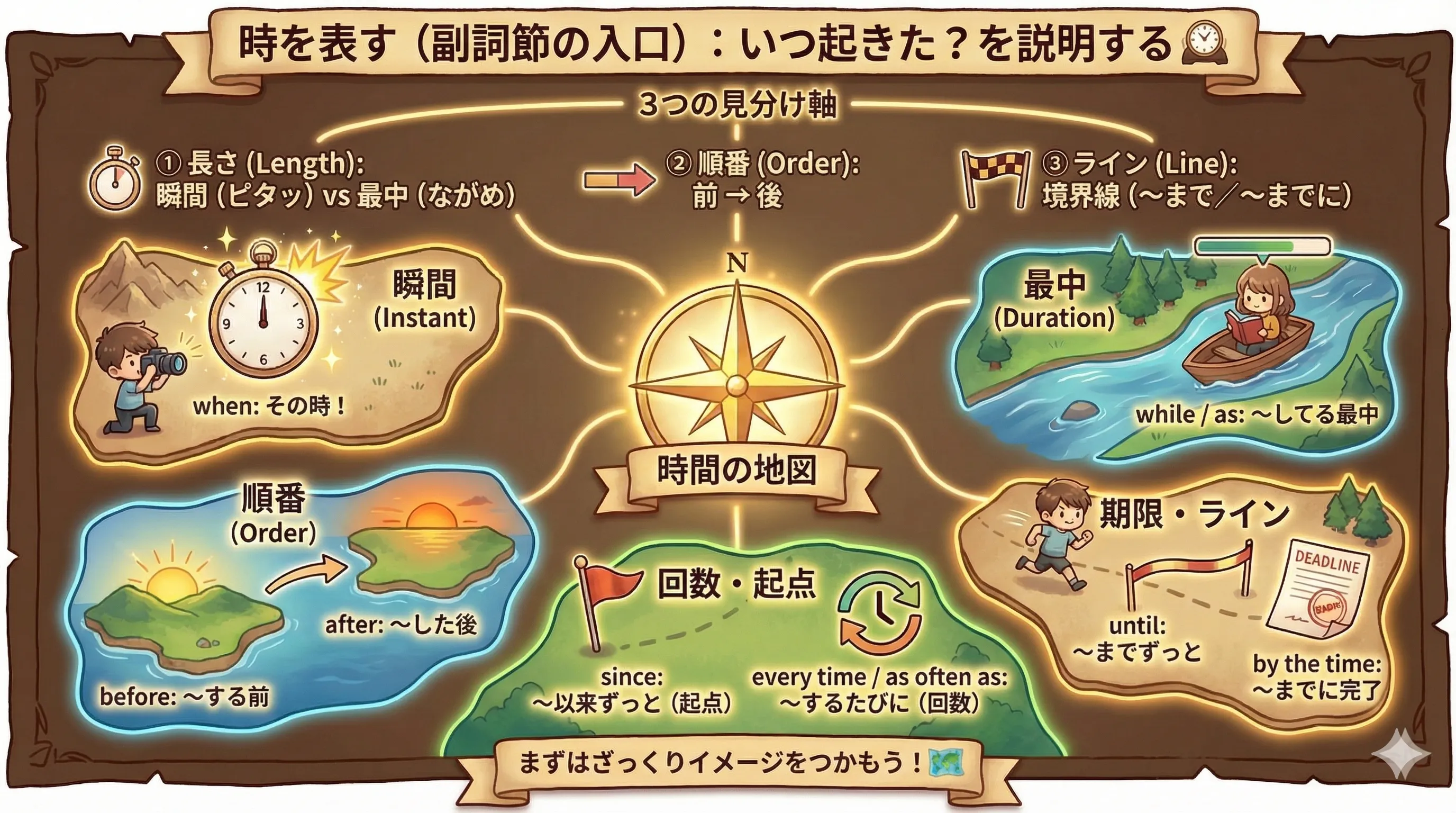
🗺️ “時を表す”の地図カード:まずは3つの見分け軸で迷子を防ぐ
2-1〜2-12は、全部「いつ?」の話ですが、実は見分けはシンプルです。
① 長さ:瞬間(ピタッ)か/最中(ながめ)か
② 順番:前→後を言いたいか
③ ライン:「〜まで」「〜までに」の境界を引きたいか。
ここまで読めたあなたは、もう準備はバッチリです✅(あとは気になるところから進めばOK)
例:when は「その時!」、while は「〜してる最中」、
before/after は「順番」、until/by the time は「ライン(境界線)」のイメージです。
(イメージ=頭に浮かぶ絵)
⚠️ 最低限の注意点(ここで1回だけ)
-
未来のことでも、時を表す節では
willを使わず 現在形 になりやすいです (未来でも“予定表みたいに”書くイメージ)。 -
while/asは「動きの途中」を出しやすいので、 進行形と相性が良いことが多いです (〜しているところ)。 -
sinceは「いつから?」の起点がテーマ。 「どれくらい続いてる?」に話がつながりやすいです (スタート地点)。
⏱️ 1分ミニ診断(読む順番のおすすめ)
while / as(2-2 / 2-3)before / after(2-6 / 2-5)until / by the time(2-7 / 2-9)🧭 次はどこから読む? 2-1 ~ 2-12 へのナビゲーション
どれから読んでもOKです。いちばん「使いそう」「気になる」ものからで大丈夫。
迷ったら、まず when → while → before/after の順がスムーズです。
人は「完璧に分かってから始める」よりも、 「だいたい分かった状態でまず動いてみる」 方が、記憶に残りやすく、学習が続きやすいと言われます。
まずは1つだけ(例:
when)読んでみましょう。小さく進むほど、強いです🔥
2-1. when:「〜するとき/するとすぐに/いつも〜すると」
when は、「いつ?(タイミング)」を説明する
副詞節(文のかたまりで“追加説明”する部分)
を作ります🕰️
ポイントは ①同じ時/②直後(すぐ)/③毎回(習慣) の3パターン。
まず「どの when?」を決めるだけで、理解が一気にラクになります。
ここでは詳しい説明に入る前に、「まずはざっくりイメージをつかむ」ことを目標にしましょう。
むずかしい用語が出てきたら、 (小学生にもわかる言いかえ) を一緒に添えます。たとえば「主節(メインの文)」「従属(おまけ側)」のように、意味がすぐ浮かぶ形にします😊
when
3パターン
入口(案内)
Lesson 109 / 2-1
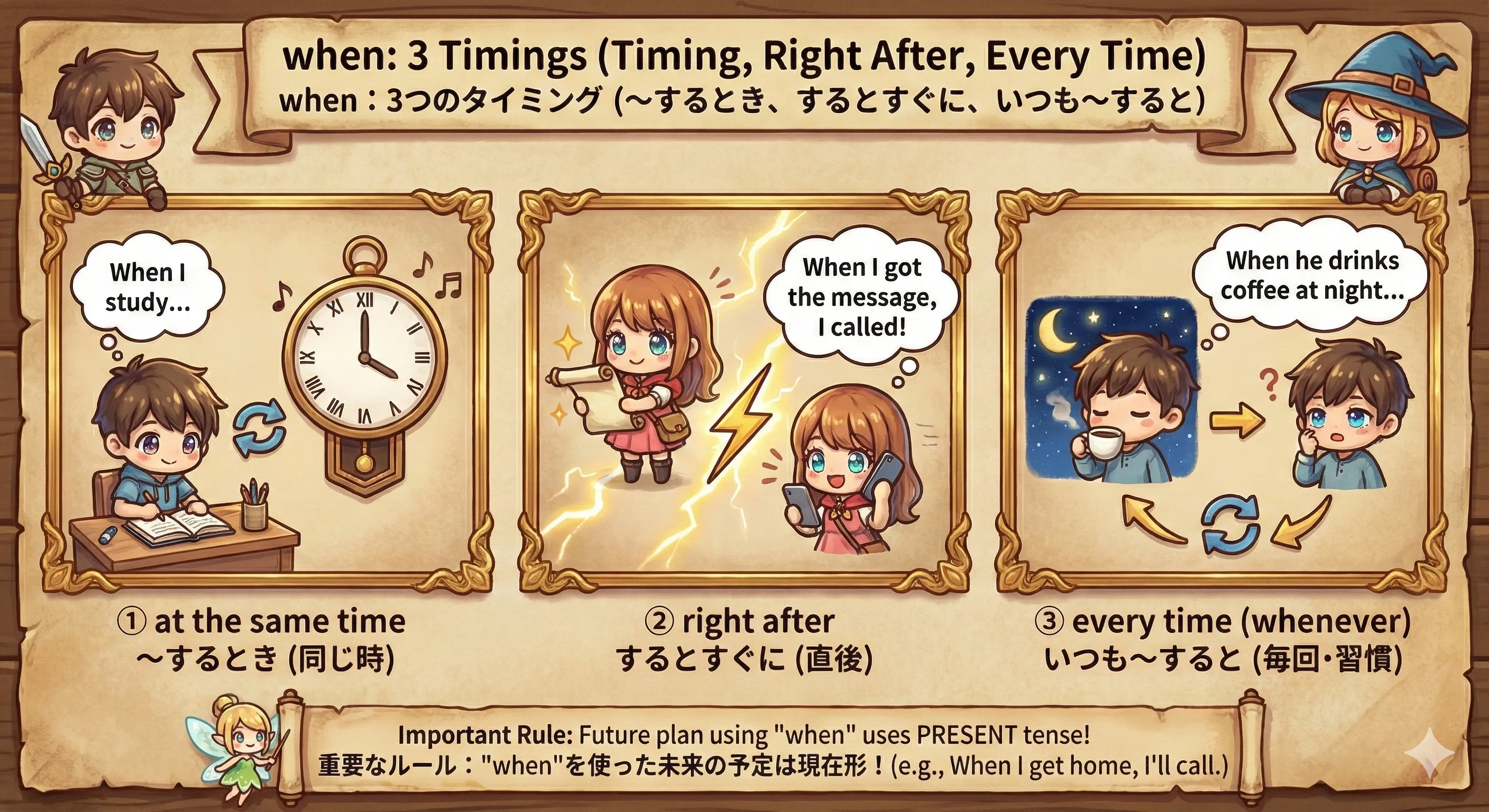
🧭 when はまずこの3パターンで見分ける
「〜するとき」=同じタイミングの話。
予定・習慣・過去、ぜんぶ出ます。
「〜するとすぐ(直後)に」=合図みたいな when。
“起きたらすぐ次!”の流れ。
「〜するときはいつも」=繰り返し(毎回)の話。
口語でもよく使う定番です。
文法は「全部覚えてから」より、3択で当てる → 例で修正の方が早いです。 まずは ①②③のどれか を決めにいきましょう。
📌 3パターンをもう一段だけやさしく(語注つき)
when 節は「いつ?」の説明係。
主節(メイン)と同じ“時”の話をつなぎます。
- 未来の話でも、
when節は現在形になりやすい(定番ルール) - (時を表す節=未来でも現在形になりがち)
「起きたらすぐ次!」の流れ。
when節=スイッチ、
主節=動き出す、みたいに考えると楽です🔘
似た意味で as soon as もありますが、when でも“直後”が言える場面が多いです。
When S + V, ... が「〜するときはいつも…」のニュアンスになることがあります。
(繰り返し=同じことが何回も起きる)
日本語で「〜すると、だいたいこうなる」の言い方に近いです。
未来の話でも、
when 節は 現在形になりやすい。例:
When I get home, I'll call you.(× When I will get home...)
🗣️ ミニ例文(when の3パターンを一気に)
when節は「いつ?」の目印。未来の話でも when節は現在形がよく出ます。
when が「合図」になって、主節がすぐ起きる感じを作れます。
when は “いつも〜すると” のニュアンスになりやすいです。
⏱️ 1分チェック(どの when?)
直感でOK。①「時」/②「直後」/③「毎回」 のどれかを選びましょう。
-
(1)
When I hear that song, I feel nostalgic.
この when はどれ? -
(2)
When the train arrived, everyone stood up.
この when はどれ? -
(3)
When you get home, text me.
この when はどれ?
- (1) ③(毎回)「その曲を聞くと、いつも」
- (2) ②(直後)「到着したら(到着するとすぐ)」
- (3) ①(時)+ルール(未来でも when 節は現在形)
次は 2-2
while で「最中」の感覚を足していきましょう。
2-2. while:「〜する間/〜するうち」
while は、「時間がしばらく続く」感じを出すのが得意です⏳
主節(メインの文)に対して、副詞節(文のかたまりで“追加説明”する部分)が
「最中(やっている途中)」や
「そのうち(やってる間に変化が起きる)」
を作ってくれます。
ここでは「while=時間がのびる/背景を作る」だけ掴めばOK。細かい例は後で増やします😊
むずかしい言い方が出たら、 (小学生にもわかる言いかえ) もセットでいきます。たとえば「継続(ずっと続くこと)」「同時(いっしょに起きること)」みたいに、すぐ絵が浮かぶ形にします🧩
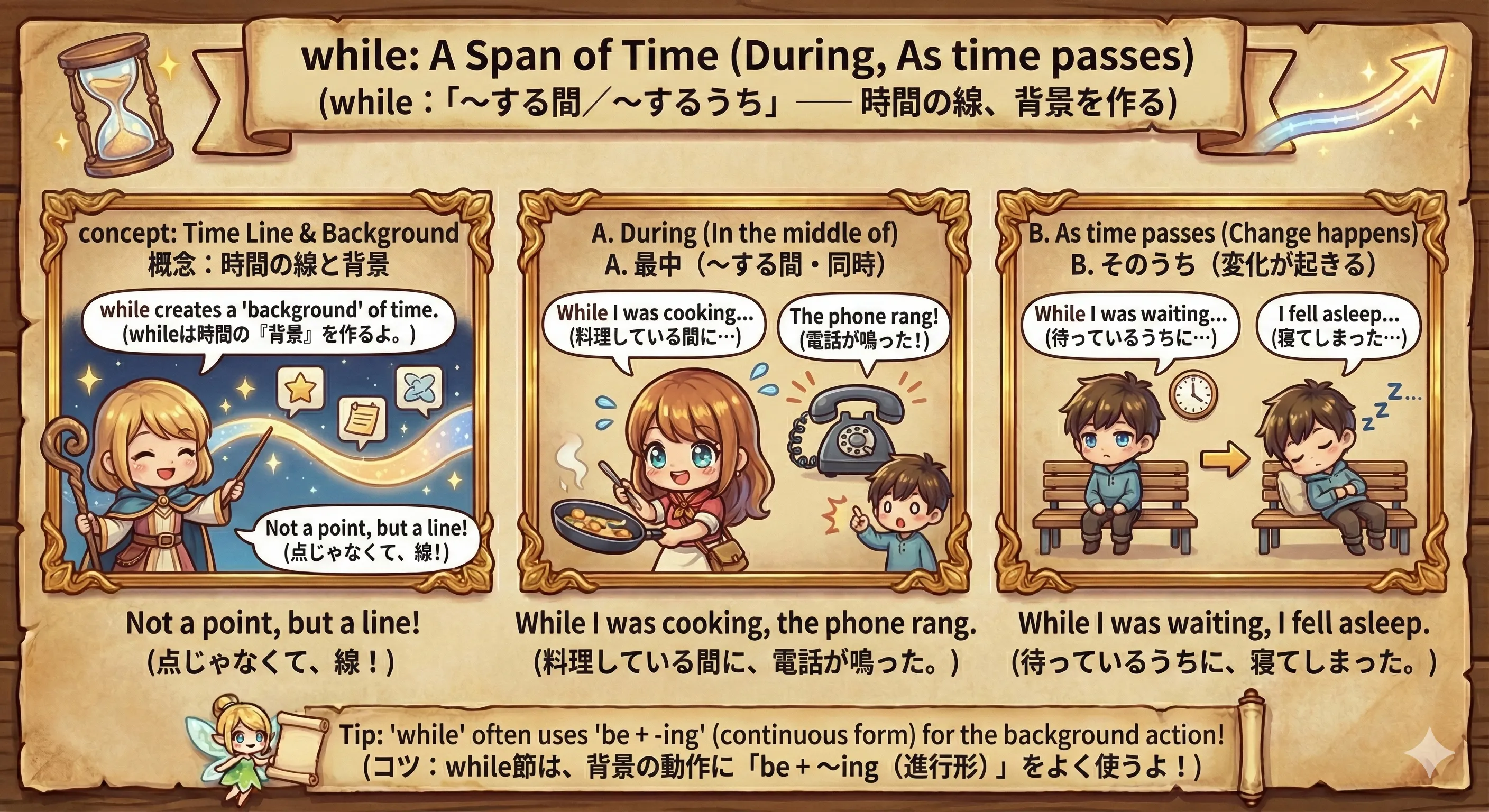
🖼️ イメージ:while節=背景(長めの時間)、主節=その中で起きること。
「点」より「線」の時間が似合います。
🧭
まずは2パターンだけ覚える:while の「間」/「うち」
「〜する間」:同時に起きる/背景の時間
while 節は 長めの時間を作りやすいので、
「その間に主節が起きる」イメージにするとスッキリします。
よくある形:while + S + be + ~ing
(〜している最中)
✅ 伸びるポイント:“背景づくり”が上手くなると、英文が自然に長く書けます。
「〜するうち」:いつの間にか変化が起きる
「やってる間に、気づいたら〜」の感じ。
変化や
気づき
が主節に来やすいです。
例:(待っているうちに雨が止んだ、など)
✅ こんな人におすすめ:「いつの間にか」を英語で言いたい人にぴったり。
while には「譲歩(〜なのに)」の用法もあります(セクション7で扱います)。ここ(時の while)では 「時間の線」を感じたらOK。 「逆なのに」の意味にしたいときは、前後の内容が“対立”しているかを見ます。
🗣️ ミニ例文(while=「最中」と「するうち」)
be + 〜ing と相性◎
while 節が「背景」、主節が「そこで起きた出来事」になりやすいです。
主節 + while + 節 でも自然に使えます。
while には「〜なのに(譲歩)」もあります(セクション7で扱います)。ここ(時の
while)は “最中・経過” が感じられるかで判定すると迷いにくいです。
⏱️ 1分チェック:この while は「間」?「うち」?
歩く(背景の時間)の中で「見つけた(出来事)」が起きた形です。 「そのうち」っぽく訳しても自然な場面があります(歩いているうちに見つけた、の感じ)。
毎日の練習という 継続(ずっと続くこと)の中で、 変化(上達)が起きています。
2つの出来事が 同時(いっしょに)に起きているのを並べています。 “時間がかぶっている”のがポイントです。
💡 次(as)に進むと、「while と as の違い(最中 vs 変化の流れ)」がもっとクリアになります。
2-3. as:「〜している時/〜した途端に/〜しながら」
as は、「同時に動く」感じが得意です🧭
ざっくり言うと、
「時間が進む流れの中で」
主節と副詞節がいっしょに進む
イメージ。
だから 「〜している時」 だけじゃなく、
「〜するやいなや(途端に)」 や 「〜しながら」 っぽいニュアンスも出せます。
ここでは細かいルールより、「as=流れの同時進行(いっしょに動く)」を先に掴みましょう😊
むずかしい用語が出たら、 (小学生にもわかる言いかえ) を添えます。たとえば「同時(いっしょに)」「変化(少しずつ変わる)」のように、意味がすぐ浮かぶ形にします✨

🖼️ イメージ:as は「時計の針が進むのと一緒に、出来事も進む」感じ。
“流れ”が見えたら勝ちです。
🧩
as の3つの顔:同時/途端/〜しながら
「同時進行の時間」:〜している時
as 節が「背景(時間の流れ)」になって、主節がその中で進みます。
while より “流れの一体感” が出やすいのが特徴です。
✅ 伸びるポイント:話の映像がつながる英文になります(映画っぽく描写できる🎬)。
「きっかけ→すぐ」:〜した途端に
as が「合図(きっかけ)」になって、主節がすぐ起きる感じ。
“〜したらすぐ” のスピード感が出ます⚡
✅ こんな人におすすめ:“起きた瞬間”をテンポよく書きたい人にぴったり。
「並行作業」:〜しながら
主節と as 節が ほぼ同じタイミングで進むと、
「〜しながら」の意味が自然に出ます。
口語だと while も強いですが、as は 文章が締まりやすいです。
✅ 伸びるポイント:1文で2つの動作をスマートに言えるようになります🧠
🔍 when / while / as のざっくり立ち位置
when:点(その時・その瞬間)while:線(最中・背景の時間が続く)as:流れ(一緒に進む・変化が見える)
💡 迷ったら「点・線・流れ」で選ぶと、かなり当たります。
as は「理由(〜だから)」の意味でもよく使います(セクション4で扱います)。ここ(時の as)では、“時間の流れ・同時進行”が感じられるかをチェックしてください。
🗣️ ミニ例文(as=「流れ」「合図」「〜しながら」)
as は「時間が進む流れの中で、主節も進む」感じが出やすいです。
as が「スイッチ」になって、主節が反応する感じを作れます。
as は「理由(〜だから)」でもよく使います(セクション4)。ここ(時の
as)は、“流れ・同時進行” が見えるかで判断すると安全です。
⏱️ 1分チェック:この as はどの顔?
💡 次の since は「起点(スタート地点)」がテーマ。点・線・流れがそろって、時間表現がかなり強くなります。
2-4. since: 「〜以来/〜してからずっと」
since は、「いつから?」をハッキリ決める合図です⏳
起点(スタート地点)
を置いて、そこから 今まで続く(ずっと続いている)ことを表します。
ここでは詳しい説明に入る前に、「since=スタート地点を指さす」とだけ掴めばOKです😊
むずかしい用語が出てきたら、 (小学生にもわかる言いかえ) を一緒に添えます。たとえば「継続(ずっと続くこと)」「起点(はじまりの場所・時)」のように言い換えます。
従位接続詞 × 時 2-4(起点) Lesson 109 / Section 2
🧭 イメージ:since は「ここから今まで」を指さす
since は「いつから?」に答える。
そして主節は「今につながる内容」になりやすい(例:ずっと続いている、今も影響がある)です。
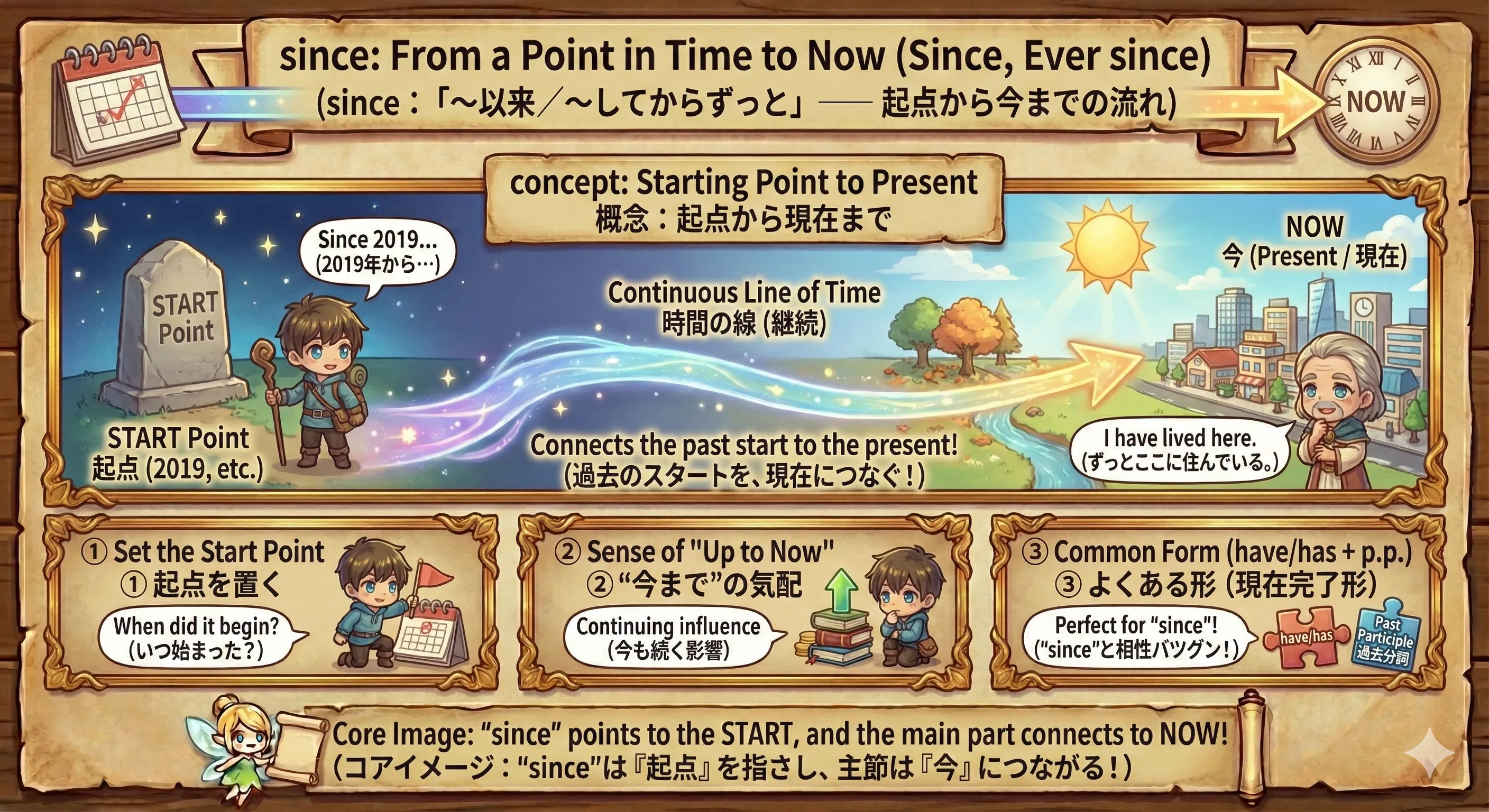
🔍 まず押さえる3ポイント(これだけでOK)
since は「いつから?」を決める役。(起点=スタート地点)
(継続=ずっと続く)
have/has + 過去分詞(現在完了)と相性◎(完了形=今までの積み重ね)
since=スタートを決めて、今につなぐ。この一本線のイメージだけで、次が一気にラクになります✨
🗣️ ミニ例文(since=起点 → 今まで)
since + 年 は超定番。「スタートの年」を置くだけでOK。
Since + S + V は「その出来事を起点に、今まで」を作れます。
since then
since then=「それ以来」。前に出た出来事を起点にして言い切れます。
since は「理由(〜だから)」でも使います(セクション4)。ここ(時の
since)は、“いつから?” がはっきりあるかどうかで見分けるのが安全です。
2-5. after: 「〜した後で/〜してから」
after は、「順番(あと→先)」をはっきり見せる合図です🧭
先に起きたことを after 節で置いて、
そのあとに起きる メインの出来事 を主節で言います。
ここでは「after=あと!」の矢印イメージをつかめばOK。細かい時制(じせい=時間の形)は後で整えます😊
むずかしい用語が出てきたら、 (小学生にもわかる言いかえ) を一緒に添えます。たとえば「順番(どっちが先か)」「出来事(起きたこと)」のように言い換えます。
従位接続詞 × 時 2-5(順番:後) Lesson 109 / Section 2
🧩 イメージ:after は「先にこれ → その後にあれ」
「〜してから、〜した」 を日本語で自然に言えるなら
after が第一候補。(チェック=たしかめる)
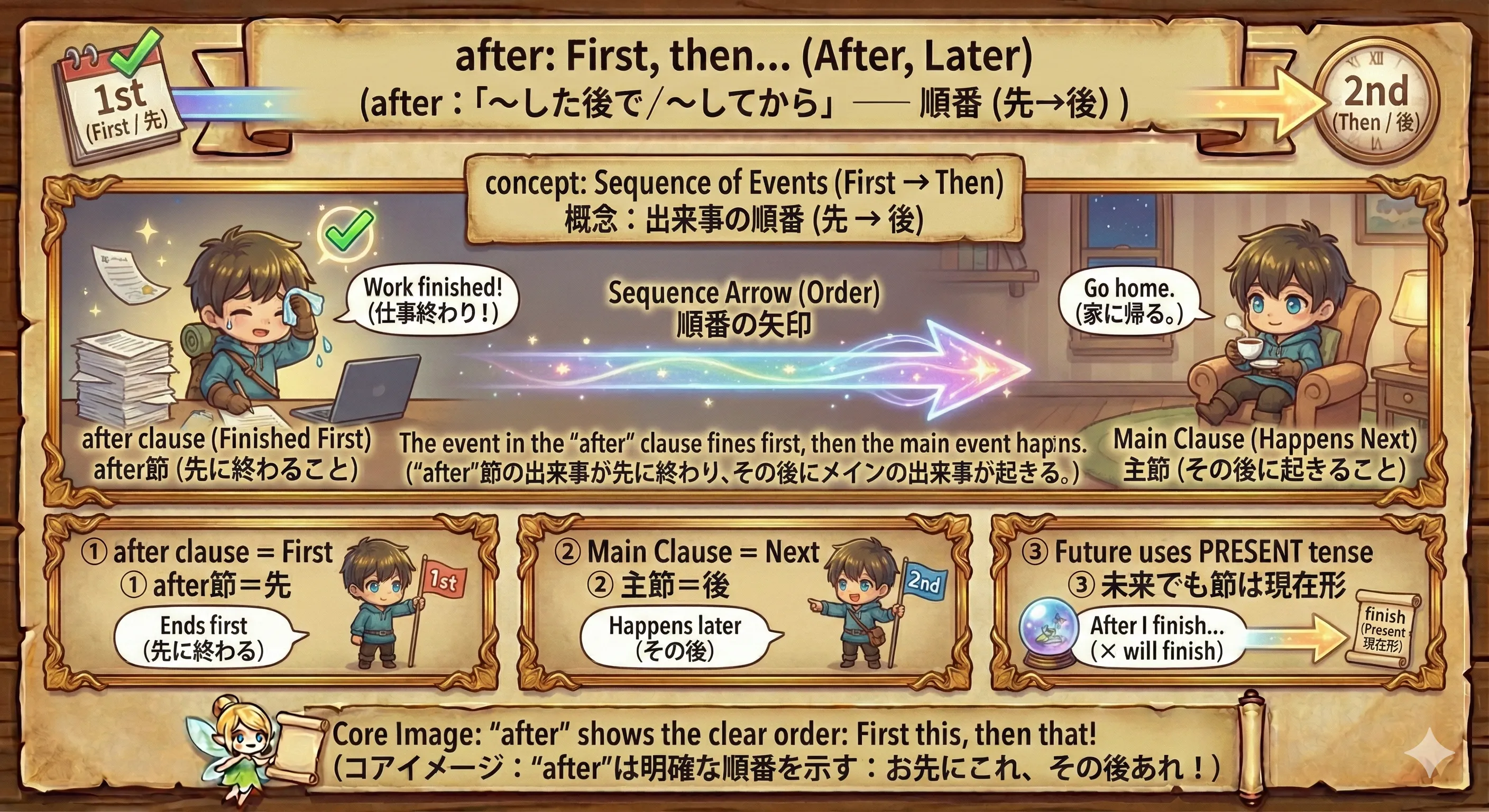
🔍 まず押さえる3ポイント(これだけでOK)
after の中は「先に終わること」。(先=さき)
(後=あと)
After I finish のように、未来でも節は現在形がよく出ます。(形=文のかたち)
after=「順番の矢印」が頭に入ったので、あとは例文でパッと反射できるようになります✨
🗣️ ミニ例文(after=先→後)
after 節は finish(現在形)になりやすいです。
after + 名詞
after は「文」だけでなく「名詞(もの・こと)」にもつながります(lunch など)。
after は「順番」が核なので、before(前に) とセットで覚えると強いです。「先→後」を矢印で思い出せれば、ほぼ勝ちです😊
2-6. before: 「〜する前に/〜しないうちに」
before は、「順番(先→後)」を
“前方向”にひっくり返す合図です⏪
主節で言いたいことを先に言って、
「その前にね」と before 節で “先にやっておきたいこと” を足します。
ここではまず before=「まだ起きてないうちに」 の感覚をつかめばOK。細かい時制(じせい=時間の形)は後で整えます😊
むずかしい用語が出てきたら、 (小学生にもわかる言いかえ) を一緒に添えます。「期限(いつまでかの線)」「未然(まだ起きてない状態)」のように、意味がすぐ浮かぶ形にします。
従位接続詞 × 時 2-6(順番:前) Lesson 109 / Section 2
🧭 イメージ:before は「先にこれ → それから本題」
「〜する前に、〜しといて」 が自然なら
before。(自然=ふつうに聞こえる)
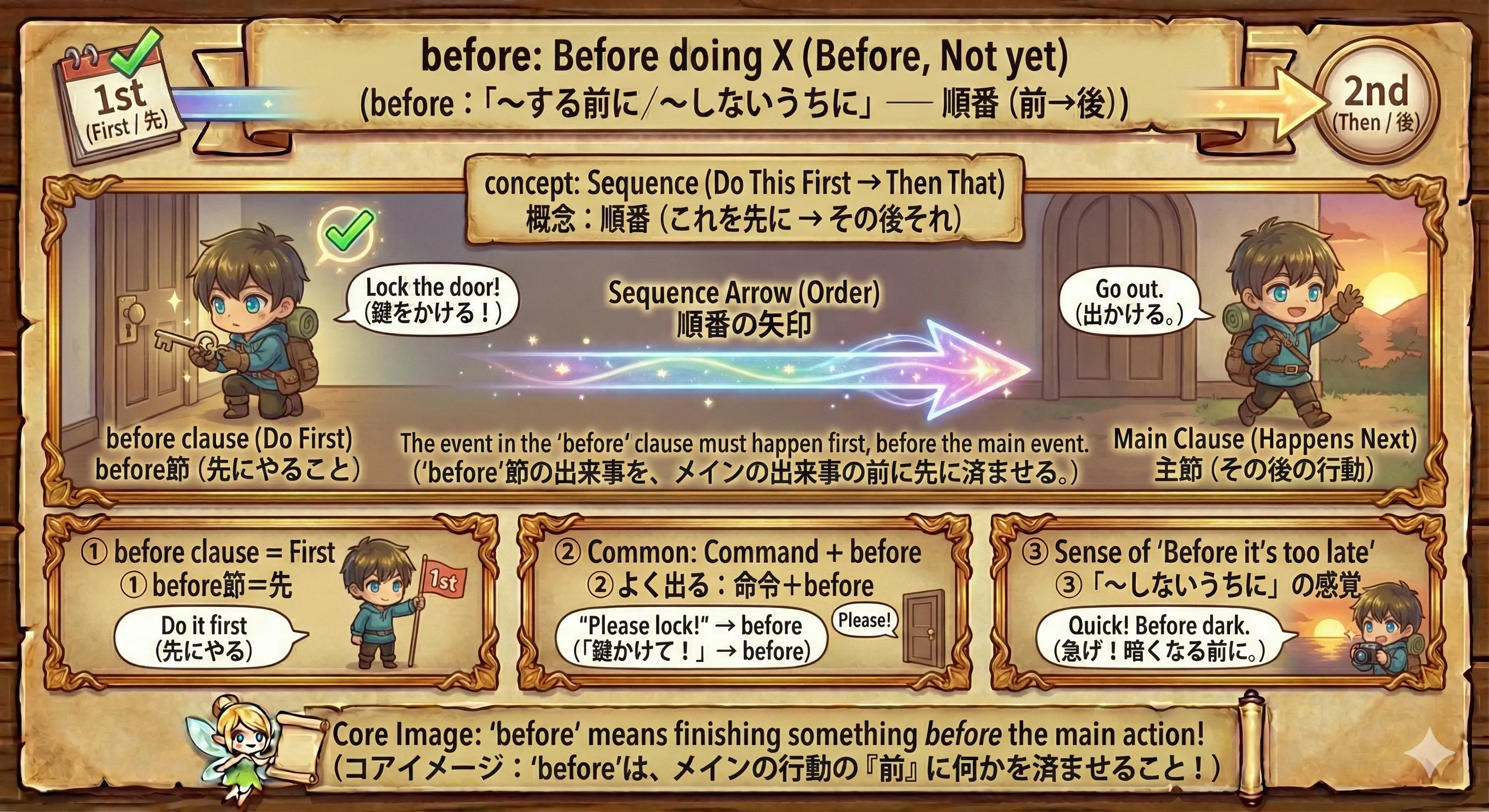
🔍 まず押さえる3ポイント(よく使う形)
before の中は、主節より前の出来事。(前=まえ)
(命令=〜して、の形)
(うちに=まだ〜の間に)
before=「先に済ませる」が入ったので、例文で体にしみこませるだけです✨
🗣️ ミニ例文(before=“前に”やる)
before + 名詞
before は「文」だけでなく「名詞(bed など)」にもつながります。
before は after と対(つい)で覚えると最強です。before=前 / after=後 の矢印が頭にあれば、読み間違いが激減します😊
2-7. until / till: 「〜するまで/〜するまでは…しない」
until(till もほぼ同じ)は、
「いつまで?」の
ゴール線(終点)
を引く接続詞です🏁
「〜するまで」は その時点で区切る 感覚。
特に 否定(…しない) と組むと、
“そこまでは絶対しない” がハッキリ伝えられます。
ここでは詳しい時制(じせい=時間の形)よりも、まず
until=「ゴールまで続く/ゴールまではしない」 のイメージをつかみましょう😊
むずかしい用語が出てきたら、 (小学生にもわかる言いかえ) を添えます。「継続(ずっと続くこと)」「終点(最後の地点)」など、意味がすぐ浮かぶ形にします。
従位接続詞 × 時 2-7(期限/終点) Lesson 109 / Section 2
🧭 イメージ:until は「ゴール線まで」
「〜まで待つ/〜まで続く」なら
until。「〜までは…しない」なら、否定とセットで強く決まります🔒
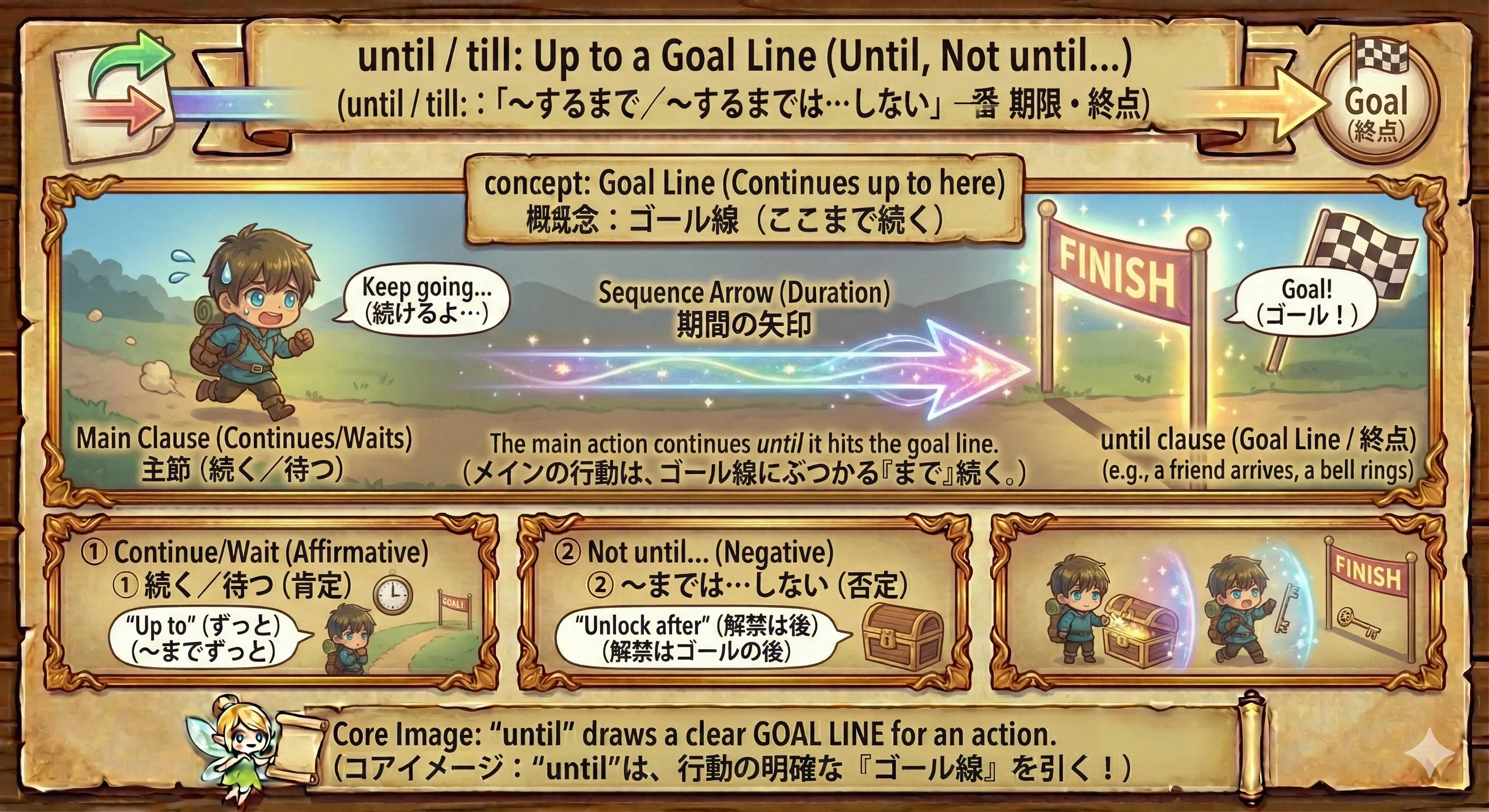
🔍 2つの基本パターン(ここだけ先に覚える)
例:
I’ll wait until you call.
(call=電話する/連絡する)
例:
Don’t open it until I say so.
(open=開ける)
「ゴール線(until)」の感覚が入ったので、あとは例文で口になじませるだけです✨
🗣️ ミニ例文(until / till の体感トレ)
till = until
till は until より口語(話し言葉)っぽいことが多いです。
until の後ろは「ゴール」なので、 「ずっと続く動作(wait / stay / keep など)」や「〜しない(否定)」と相性がいいです。
もし “ゴール” を越えても続く話なら、別の言い方(例:
after など)を検討します😊
2-8. once:「ひとたび〜すると/〜してしまえば」
once は、時間の「一回」じゃなくて、
「条件が成立したら、そこから先は流れが変わる」
を作る接続詞です🔁➡️✨
日本語だと 「ひとたび〜すると」 / 「〜してしまえば」 のニュアンス。
いったんスイッチが入ると、主節がスムーズに進みます(スイッチ=切り替えの合図)。
ここでは細かい文法より、once=「一度成立したら、その後はOK」のイメージを先に入れましょう😊
むずかしい用語が出てきたら、 (小学生にもわかる言いかえ) を添えます。たとえば「成立(条件がそろうこと)」「切り替え(スイッチで変わること)」などです。
従位接続詞 × 時(スイッチ) 2-8(成立→その後) Lesson 109 / Section 2
🧭 イメージ:once は「条件スイッチ」→ そこから先は流れが進む
「ひとたび〜すると、あとは…」
「〜してしまえば、あとは…」
の “あとは” が見えたら
once がハマりやすいです✨
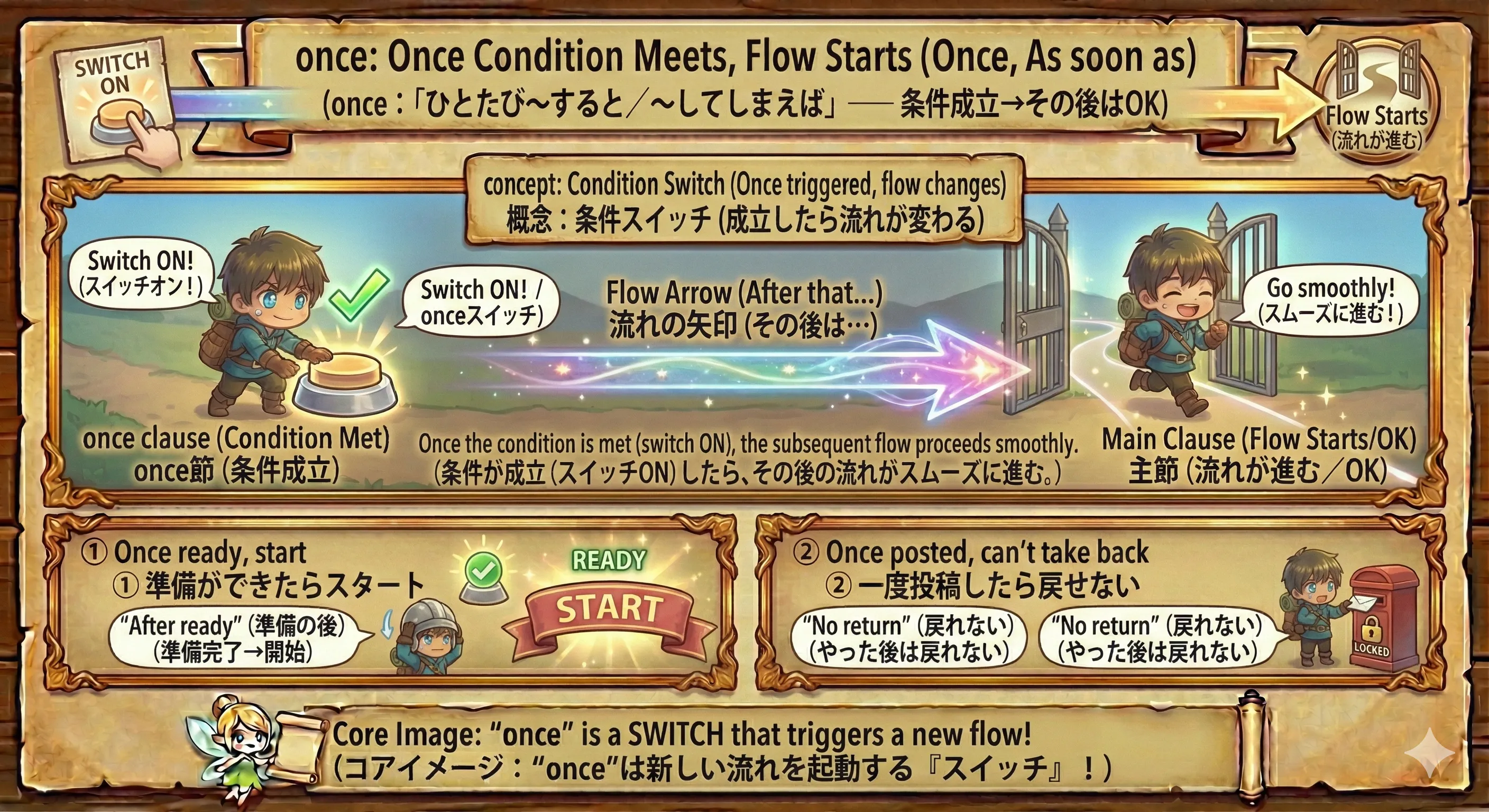
🔍 まずはこの2つだけ(核の使い分け)
例:
Once you’re ready, we’ll start.
(ready=準備できた)
例:
Once it’s posted, you can’t take it back.
(posted=投稿された / take it back=取り消す)
once=「成立したら、その後は…」 が入ったので、例文で感覚を固めましょう✨
🗣️ ミニ例文(once の「スイッチON」体感)
once は「一回」を数える once と同じ形ですが、
接続詞の once は 「条件が成立したら」 の意味です。日本語の「一度〜したら(その後は)」が浮かぶときは、接続詞の
once を疑ってOKです😊
2-9. by the time:「〜までに/〜する時までには」
by the time は、
「その時点に着くまでに、もう終わっている/進んでいる」
を言うための表現です⏳✅
「いつ?」 というより、
「その時までに、どこまで進んだ?」 を作るイメージ。
期限(タイムリミット/締め切り)
っぽい空気が出ます。
ここではまず、by the time=“到着時点より前に完了”の地図を入れましょう🗺️
むずかしい用語が出てきたら、 (小学生にもわかる言いかえ) を添えます。たとえば「完了(もう終わっていること)」「時点(そのときのポイント)」などです😊
従位接続詞 × 時(期限・到達時点) 2-9(〜する時までには) Lesson 109 / Section 2
🧭 イメージ:by the time は「到着時点」より前に、もう完了している
「(その時)までには、もう〜している」
が口の中で言えたら
by the time がハマります✨
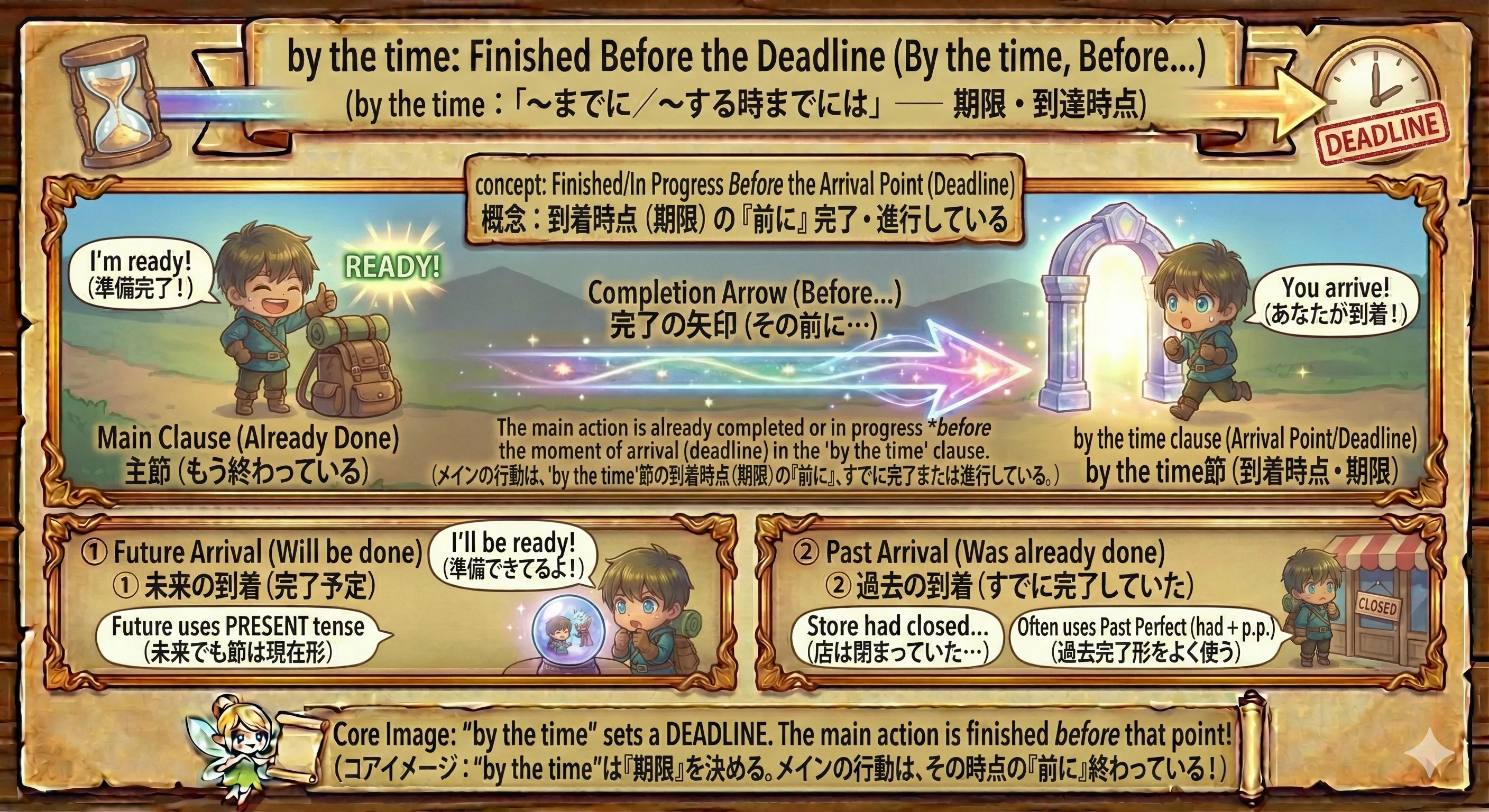
🧩 よく出る2パターン(ここだけ先に)
↳ 「その時までには〜している」になりやすい
(未来でも節は現在形=英語あるある)
↳ 主節は「すでに終わっていた」になりやすい(例:had + 過去分詞)
(完了=もう終わっていること)
「到着時点までに、もう完了」の骨格が見えたので、例文で一気に定着させましょう✨
🗣️ ミニ例文(by the time の「〜までには」感をつかむ)
by the time は 「その時までに」 のニュアンスが強いので、
when の「その時に」とはズレます。「到着した時に」より「到着する時までには」と言い換えると、意味が崩れにくいです😊
2-10. each time:「〜するたびに」
each time は、
「毎回そのタイミングで同じことが起きる」
を言うための表現です🔁
ポイントは 回数(くり返し)。
「1回だけ」ではなく、
“何度も” のパターンを作れます。
ここではまず、each time=“毎回スイッチが入る” のイメージをつかみましょう✨
むずかしい用語が出てきたら、 (小学生にもわかる言いかえ) を添えます。たとえば「反復(何回もくり返すこと)」「きっかけ(スイッチ)」のように、すぐ想像できる言葉にします😊
従位接続詞 × 時(回数・反復) 2-10(〜するたびに) Lesson 109 / Section 2
🧠 イメージ:each time は「毎回 → 同じ反応」がセット
each time は 「毎回」 を強めたいときに便利。when は「その時」、while は「その間」。
そして each time は 「回数のスイッチ」 です。
「毎回、必ず」 を心の中で足してみる。
しっくり来たら
each time の出番です✨
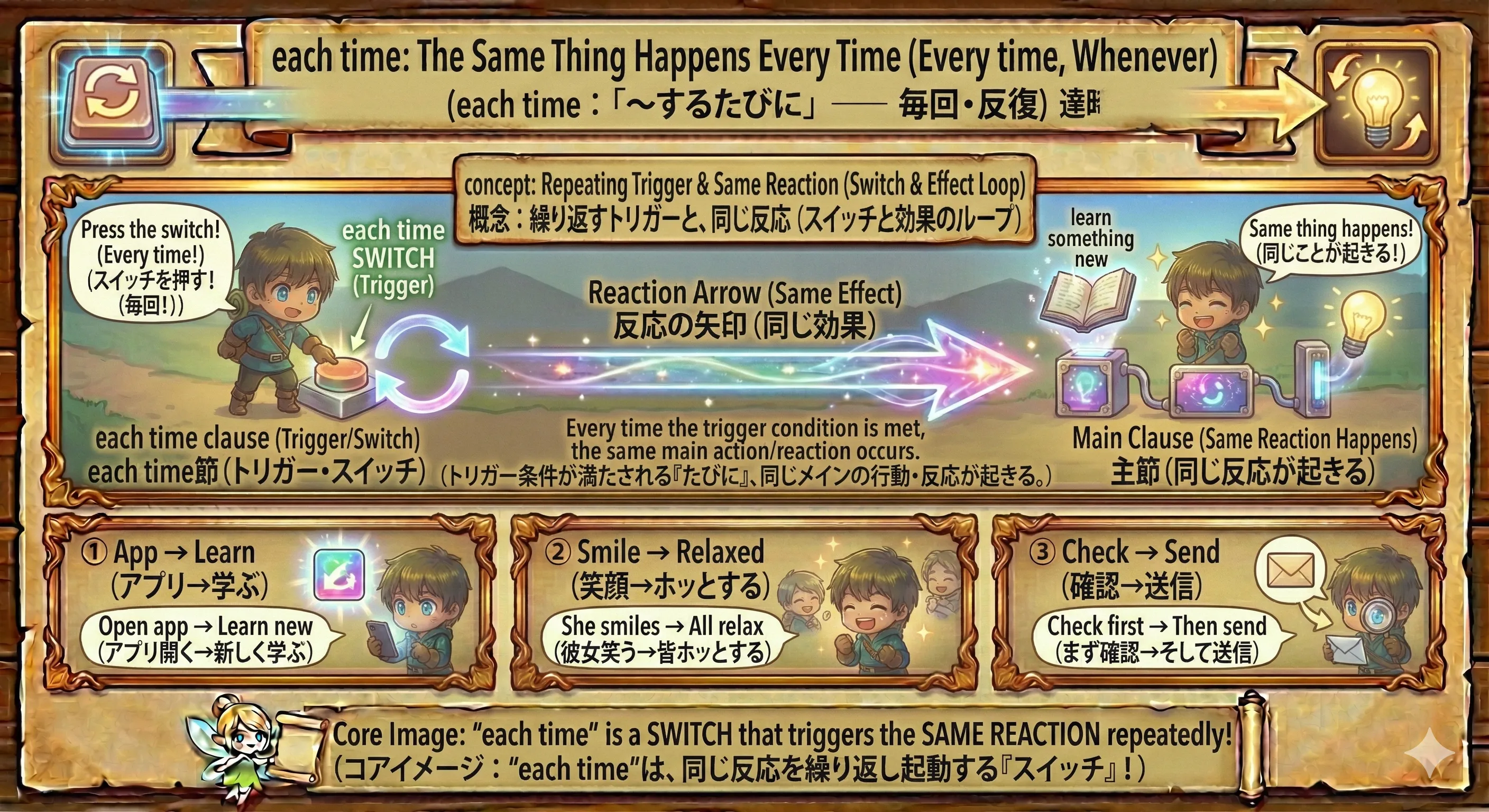
🗣️ ミニ例文(each time の「毎回スイッチ」を定着)
each time は 「毎回」 が核なので、
“たまたまその時” には向きません。「いつも起きる?」「毎回同じ?」と自分に聞いて、YESなら
each time です😊
2-11. every time:「〜するたびに」
every time は、
「起きるたびに、毎回セットで起きる」
を表す表現です🔁
each time とほぼ同じですが、
every(ぜんぶ) の語感で
“例外なし感(もれなく)” が少し強めに出せます。
ここではまず、every time=“毎回もれなく反応する” のイメージをつかみましょう✨
むずかしい用語が出てきたら、 (小学生にもわかる言いかえ) を添えます。たとえば「例外(いつもじゃないケース)」「反応(リアクション)」のように、すぐ想像できる言葉にします😊
従位接続詞 × 時(回数・反復) 2-11(〜するたびに) Lesson 109 / Section 2
🧷 イメージ:every time は「毎回ぜんぶ → 例外なし」が出やすい
each time とほぼ同じだけど、
every time は 「いつも例外なし!」 の気持ちが乗りやすい。“毎回そうなる” を強調したいときに選ぶと自然です😊
日本語で 「毎回もれなく」 がしっくり来たら
every time。“たまたま” じゃなく、パターン(くり返し) の話です✨
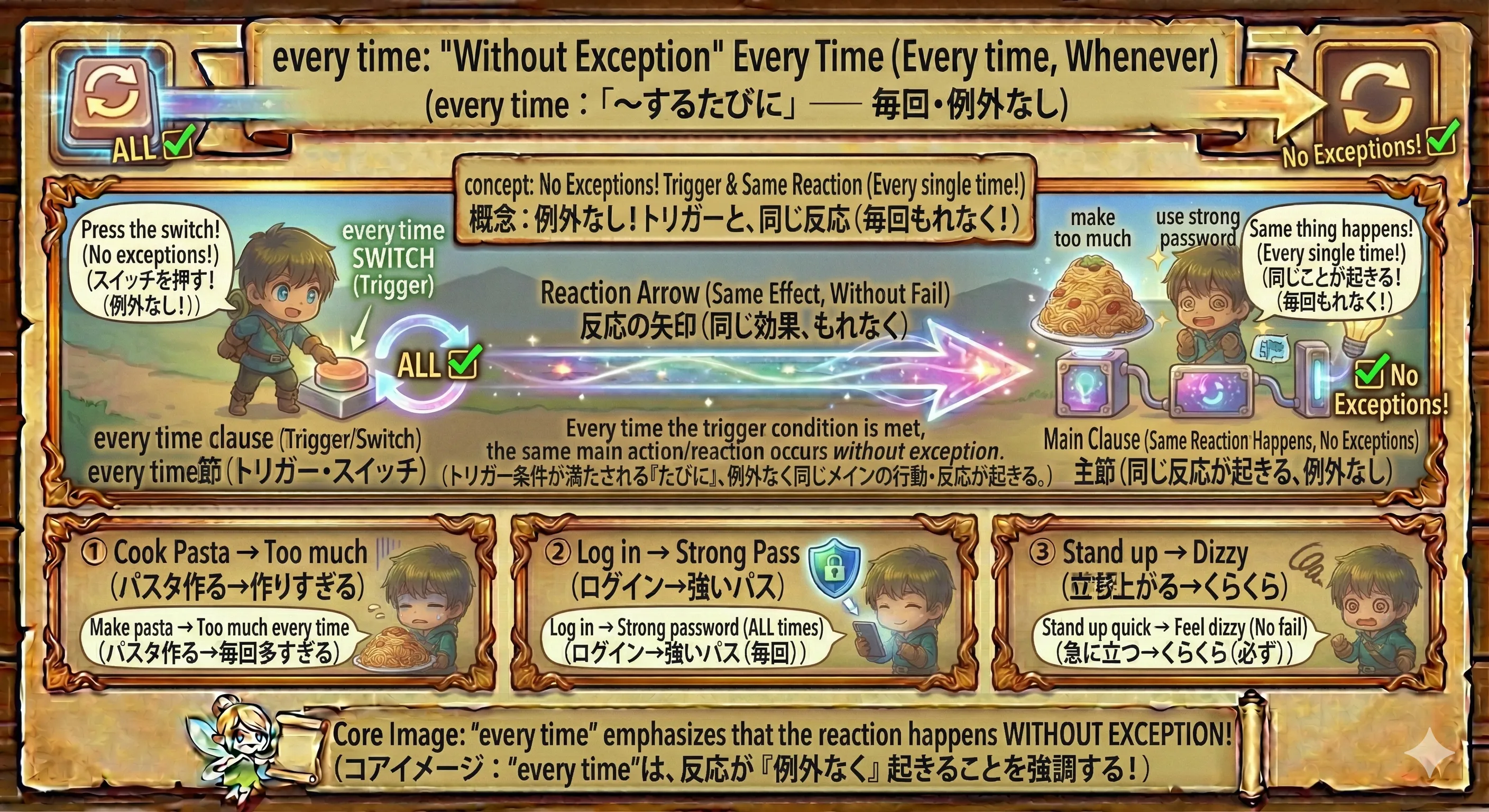
🗣️ ミニ例文(every time の「例外なし感」を体に入れる)
あとは実際の文章で 「毎回(例外なし)セットで起きる?」 と確認しながら、
every time を使っていきましょう✨
2-12. the first time:「最初〜したとき」
the first time は、
「初回(はじめての1回)」をピンポイントで切り取って、
そのときの出来事や気持ちを語れる表現です🎬
“いつ?” を言うだけでなく、
記憶に残るシーンとして話を進められるのが強み。
ここではまず、first=最初の1回 を合図に、主節(メインの出来事)がスッと出てくる感覚をつかみましょう✨
むずかしい用語が出てきたら、 (小学生にもわかる言いかえ) を添えます。たとえば「初回(はじめての1回)」「印象(心に残る感じ)」みたいに、すぐイメージできる言葉にします😊
従位接続詞 × 時(初回) 2-12(最初〜したとき) Lesson 109 / Section 2
🧩 イメージ:the first time は「初回の1シーン」を切り出す
when は「いつ?」の案内が中心。the first time は 「初めての体験談」 を作りやすい表現です。
日本語で 「初めて〜したとき、〜だった」 と言いたいなら
the first time。“毎回” ではなく 初回限定 です✨
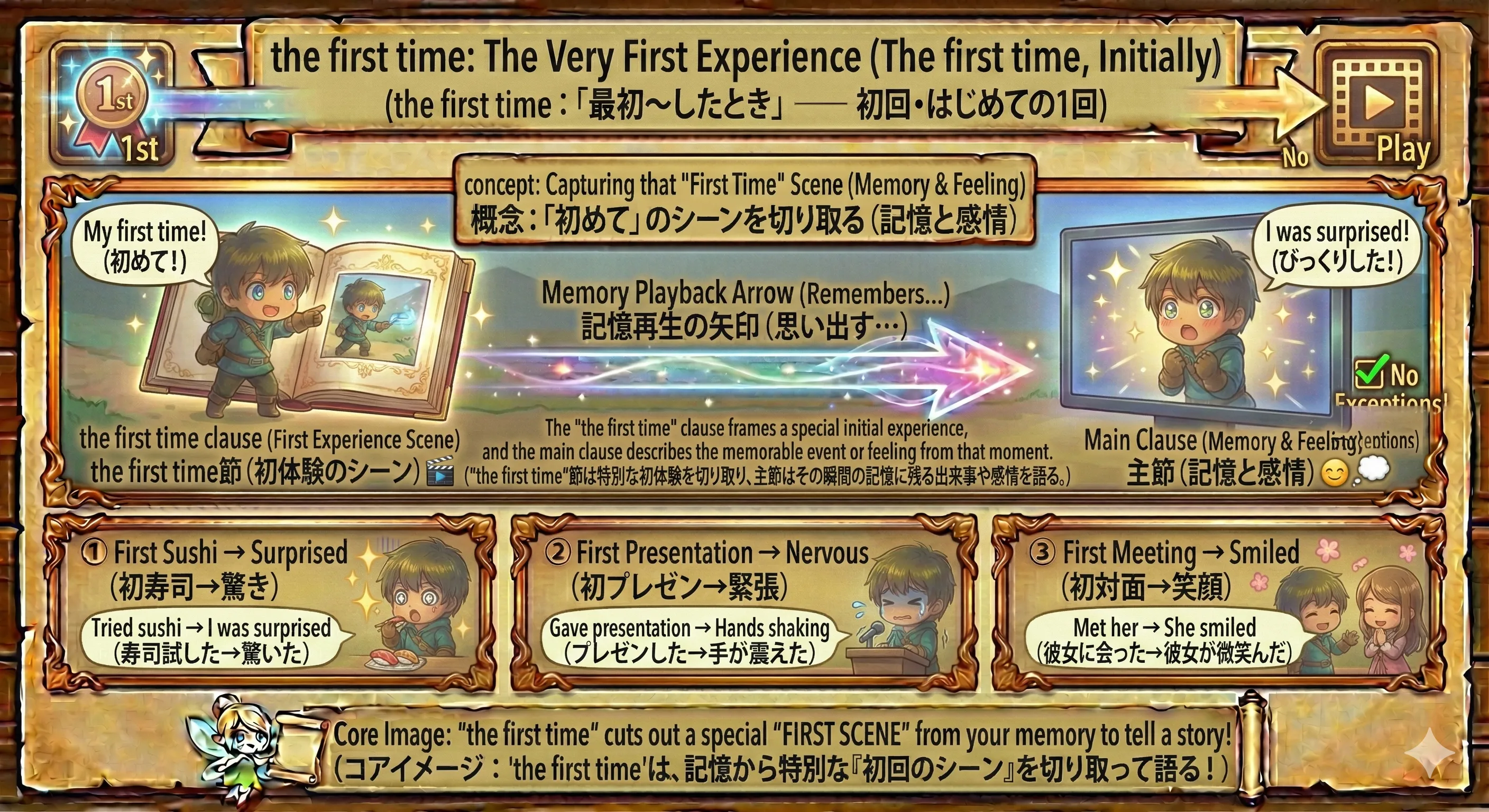
🗣️ ミニ例文(the first time:初回の“記憶シーン”を作る)
the first time は「初回の思い出」を作る便利ワード。まずは 1 文だけでも OK。“初めて〜したとき、〜だった” を口に出す回数が増えるほど、使い方が体に入ります✨
次は本文で、
the first time が出てきたら
「初回の1回限定の話だ!」 と気づければ勝ちです😊
3. 場所を表す(where / wherever ...)
ここでは、「どこで?どこに?」を説明する
副詞節(文のかたまりで“追加説明”する部分)
をまとめて案内します🗺️
キーワードは where と wherever。
場所の指定(ピンポイント)と、場所の自由(どこでも・どこへでも)の違いがポイントです。
ここでは詳しい説明に入る前に、「まずはざっくりイメージをつかむ」ことを目標にしましょう。
むずかしい用語が出てきたら、 (小学生にもわかる言いかえ) を添えます。たとえば「指定(ここ!と決めること)」「自由(どこでもOK)」のように、意味がすぐ浮かぶ形にします😊
従位接続詞 × 場所 入口(案内) Lesson 109 / Section 3
🧭 次はどちらから読む? 3-1 ~ 3-2 へのナビゲーション
このセクションは入口です。3-1 と 3-2 は、どちらから読んでもOK。
「今まさに使いたい方」から入ると、理解が早くて続きやすいです✨
(入口=これから学ぶ内容の案内)
人は「完璧に分かってから始める」よりも、 「だいたい分かった状態でまず動いてみる」 方が、記憶に残りやすく学習が続きやすいです。
今日は
where=指定、wherever=自由 の2点だけでもOKです😊
次は 3-1 / 3-2 で「指定か?自由か?」を意識しながら読むと、一気にラクになります✨
3-1. where:「~する所に/所はどこへでも」
where は、「どこで?/どこへ?」を足す
場所の副詞節(文のかたまりで“追加説明”する部分)
を作ります📍➡️
質問の Where? ではなく、文と文をつないで「場所ラベル」を貼る役目だと思うと一気にラクです✨
まずは 📍その場所で と ➡️その場所へ の2つだけ掴めばOK。
ここまで読めたあなたは、もう準備はバッチリです😊
むずかしい用語が出たら (小学生にもわかる言いかえ) を添えます。たとえば「副詞節(追加で説明する文のかたまり)」「移動(場所が変わること)」のように、意味がすぐ浮かぶ形にします。
従位接続詞 × 場所 3-1(本編) Lesson 109 / Section 3-1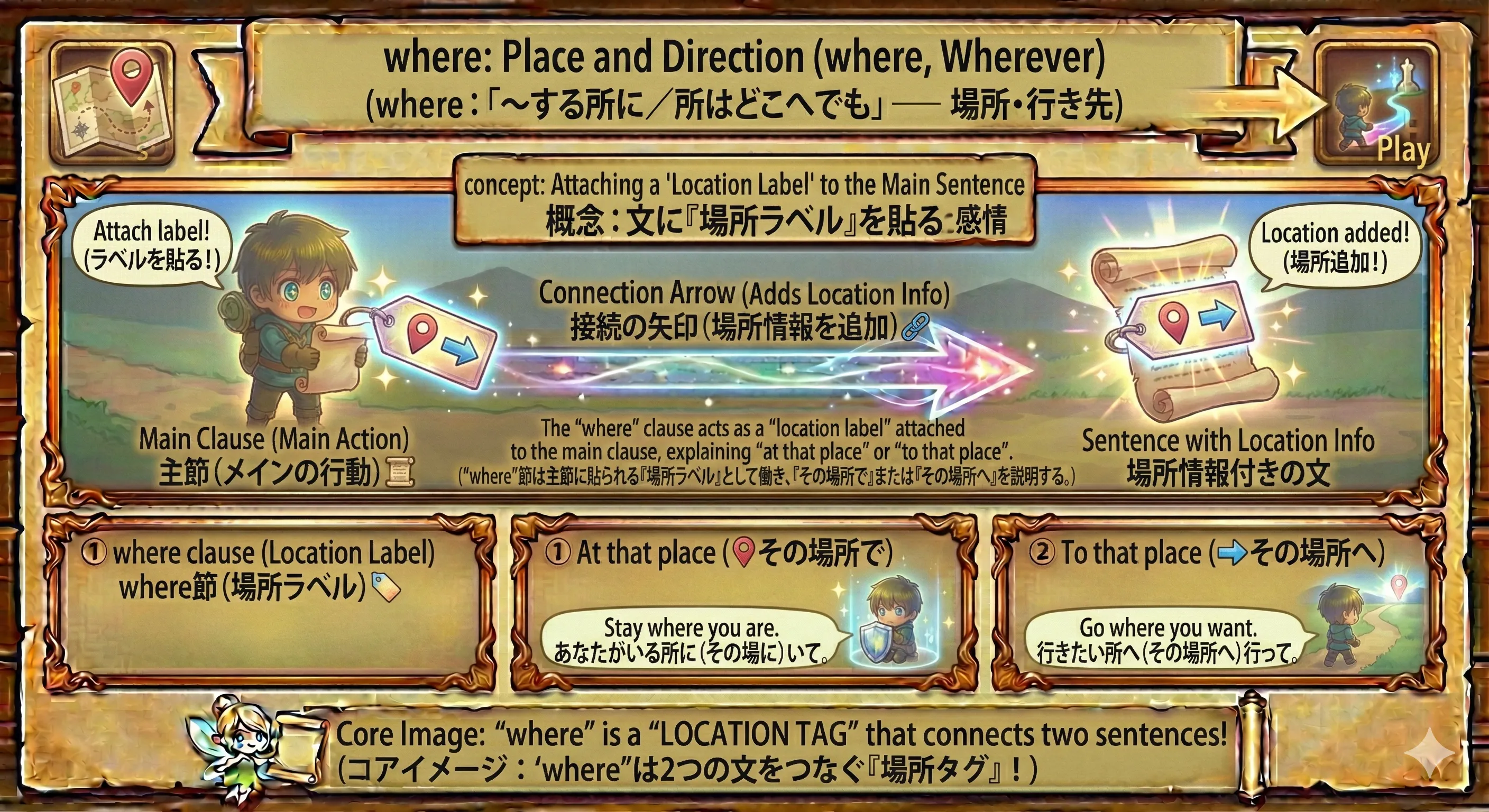
🗺️ まずはここだけ:where の「2つの地図ピン」
形はシンプルに 主節 + where + 主語 + 動詞。
どこで?/どこへ? を、後ろの文で説明します。
(主節=メイン、where節=場所の追加説明)
「そこで起きる/そこにいる」 느낌(ふんいき)です。
例:stay work meet happen
(居る・起きる系)
Stay where you are.(あなたがいる所に=その場所で)
「そこへ行く/連れていく」 느낌(ふんいき)です。
例:go move take walk
(移動系)
Go where you want.(行きたい所へ=その場所へ)
まずは 「📍そこで」 と 「➡️そこへ」 の2択だけでOK。 完璧に暗記してから進むより、“だいたい分かった状態で例文に当たる”ほうが定着しやすいです。
⚠️ つまずき防止:ここだけ注意
-
✅ 質問の
Where?と別物:Where are you?(質問)/Stay where you are.(場所の追加説明) -
✅
whereの後ろは “文”:where + 主語 + 動詞が基本(例:where it is)。 -
✅ 前置詞を足しすぎない:
まずは
Go where you want.の形でOK。 (“to” を入れたくなるけど、ここではシンプル優先)
「where=どこ?」 で止まってしまうこと。 このページの
where は、“場所を説明する節を作る合図”です。
🧾 例文で感覚をつかむ(5つ以上)
まずは 📍その場所で/➡️その場所へ のどちらかを見て、 1文ずつ “場所の追加説明” を回収しましょう。
Stay where you are.
あなたがいる所に(その場に)いてね。
Put the umbrella where it won’t get wet.
濡れない所に(濡れない場所で)傘を置いてね。 (won’t=〜しないだろう)
Go where you feel safe.
安心できる所へ行って。 (safe=安全な/安心な)
Let’s sit where we can see the screen.
画面が見える所に座ろう。 (can=できる)
Take me where the buses stop.
バスが止まる所へ連れていって。 (take=連れていく)
I met him where we first talked.
最初に話した所で、彼に会った。 (first=最初に)
「where節=場所の追加説明」が見えたら勝ちです。 次の 3-2(
wherever)に進むと、「どこでも」の広がりも一気に扱えるようになります🚀
3-2. wherever:「〜する所はどこでも/どこに〜しようとも」
wherever は where の強化版で、
「場所がどこであっても」を足す
場所の副詞節(文のかたまりで“追加説明”する部分)
を作ります🌍📍
ポイントは 「場所が1つに決まっていない」こと。
「家でも、駅でも、海外でも…どこでも同じ」という“フリーダム感”が出ます✨
まずは ①どこでも(普遍) と
②どこに〜しようとも(譲歩っぽい) の2つの顔だけ掴めばOKです。
ここまで読めたあなたは、もう準備はバッチリです😊
むずかしい用語が出たら (小学生にもわかる言いかえ) を添えます。たとえば「普遍(いつでも同じ)」「譲歩(〜でも)」「条件(もし〜なら)」のように、意味がすぐ浮かぶ形にします。
従位接続詞 × 場所 3-2(本編) Lesson 109 / Section 3-2
🪄 まずはここだけ:wherever の「2つの顔」
形は基本 主節 + wherever + 主語 + 動詞。
where(特定の場所)に対して、
wherever(場所が何でもOK)です。
場所が変わっても、結果や行動が変わらないイメージ。
「家でも職場でも同じ」「海外でも通じる」などに強いです。
I'll follow you wherever you go.(あなたがどこへ行っても)
「場所がどこだろうと関係ない」=相手の条件を飲んだ上で主節を進める感じ。
(譲歩=相手の言い分を受けても、結論は変えない)
Wherever you choose, I'll support you.(どこを選んでも/どこだとしても)
wherever = where + ever(強め)。 まずは「場所が固定じゃない!」と分かった時点で合格です。 あとは例文で “🌍どこでも” の空気を吸えば、自然に身につきます😊
🔎 見分けのコツ:where と wherever
| 形 | コアイメージ | よくある日本語 |
|---|---|---|
📍 where
|
場所がだいたい決まる (ここ・あそこ・その辺…) |
「〜する所に」「〜する所へ」 |
🌍 wherever
|
場所が何でもOK (どこでも/どこだろうと) |
「〜する所はどこでも」「どこに〜しようとも」 |
wherever は「どこ?」と聞いているわけではありません。“場所が何であっても” を追加する合図です。
🧾 例文で感覚をつかむ(5つ以上)
ここでは 「場所が固定じゃない」を意識して読むだけでOKです。 (ever=強めるパーツ)
I’ll find you wherever you are.
あなたがどこにいても、見つけるよ。
Follow me wherever I go.
私がどこへ行っても、ついてきて。 (follow=ついていく)
Wherever you go, stay safe.
どこへ行っても、安全でいてね。
I work best wherever it’s quiet.
静かな所ならどこでも、いちばん集中できる。 (best=いちばん)
You can sit wherever you like.
好きな所ならどこでも座っていいよ。 (like=好き)
Wherever you choose, I’ll support you.
あなたがどこを選んでも、応援するよ。 (support=支える/応援する)
wherever = 場所が何でもOK が見えたら勝ちです。 “📍特定:
where” と “🌍自由:wherever” の対比ができれば、場所表現はかなり安定します😊
4. 原因や理由を表す(because / since / as / that ...)
ここは 「なんで?」 を作る
副詞節(文のかたまりで“追加説明”する部分)
の入口です💡
because は 理由をズバッ、
since / as は 前提っぽくサラッと、
that は 気持ち(うれしい・残念など)の理由 に寄りやすいのがコツ。
ここでは詳しい説明に入る前に、「まずはざっくりイメージをつかむ」ことを目標にしましょう。
むずかしい用語が出てきたら、 (小学生にもわかる言いかえ) を添えます。たとえば「前提(もう分かってる話)」「強調(ぐっと強く言うこと)」のように、意味がすぐ浮かぶ形にします😊 ここまで読めたあなたは、もう準備はバッチリです✅
従位接続詞 × 理由 入口(案内) Lesson 109 / Section 4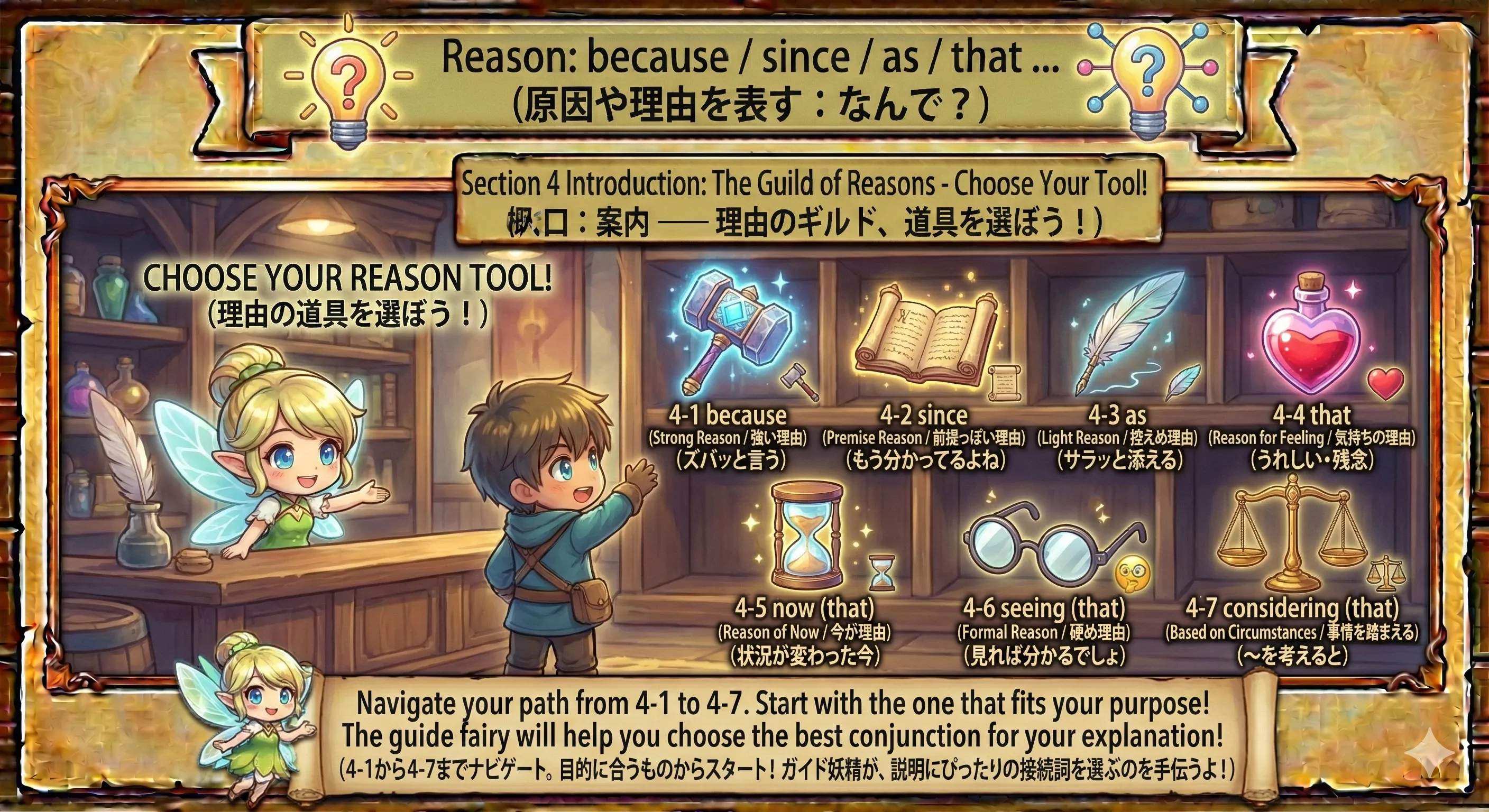
🧭 次はどこから読む? 4-1 ~ 4-7 へのナビゲーション
どれから読んでもOKです。迷ったら、まず 4-1 because(いちばん基本)へ。
「理由を強く言いたい」「前提として添えたい」「気持ちの理由を言いたい」など、
あなたの目的に近いカードから進みましょう😊
人は「完璧に分かってから始める」よりも、 「だいたい分かった状態でまず使ってみる」 方が記憶に残りやすいです。
今日は “
because=強い / since・as=前提っぽい / that=気持ちの理由” の3点だけでOK!
4-1. because:「〜だから」(理由をズバッと作る)
because は、「なんで?」に
まっすぐ答えるための従位接続詞(文をつなぐ言葉)です💡
理由の“芯”をはっきり出したいときに強い味方。
「主節(メインの文)」+「because節(理由の文)」で、説明が一気に通りやすくなります。
ここでは詳しい例外に入る前に、「because=理由を強めに言う」とだけ掴めばOKです✅
むずかしい言葉が出たら、(小学生にもわかる言いかえ)を添えます。 たとえば「主節(主役の文)」「従位(おまけで説明する側)」のように、イメージが浮かぶ言葉にします😊
従位接続詞 × 理由 強い理由 Lesson 109 / 4-1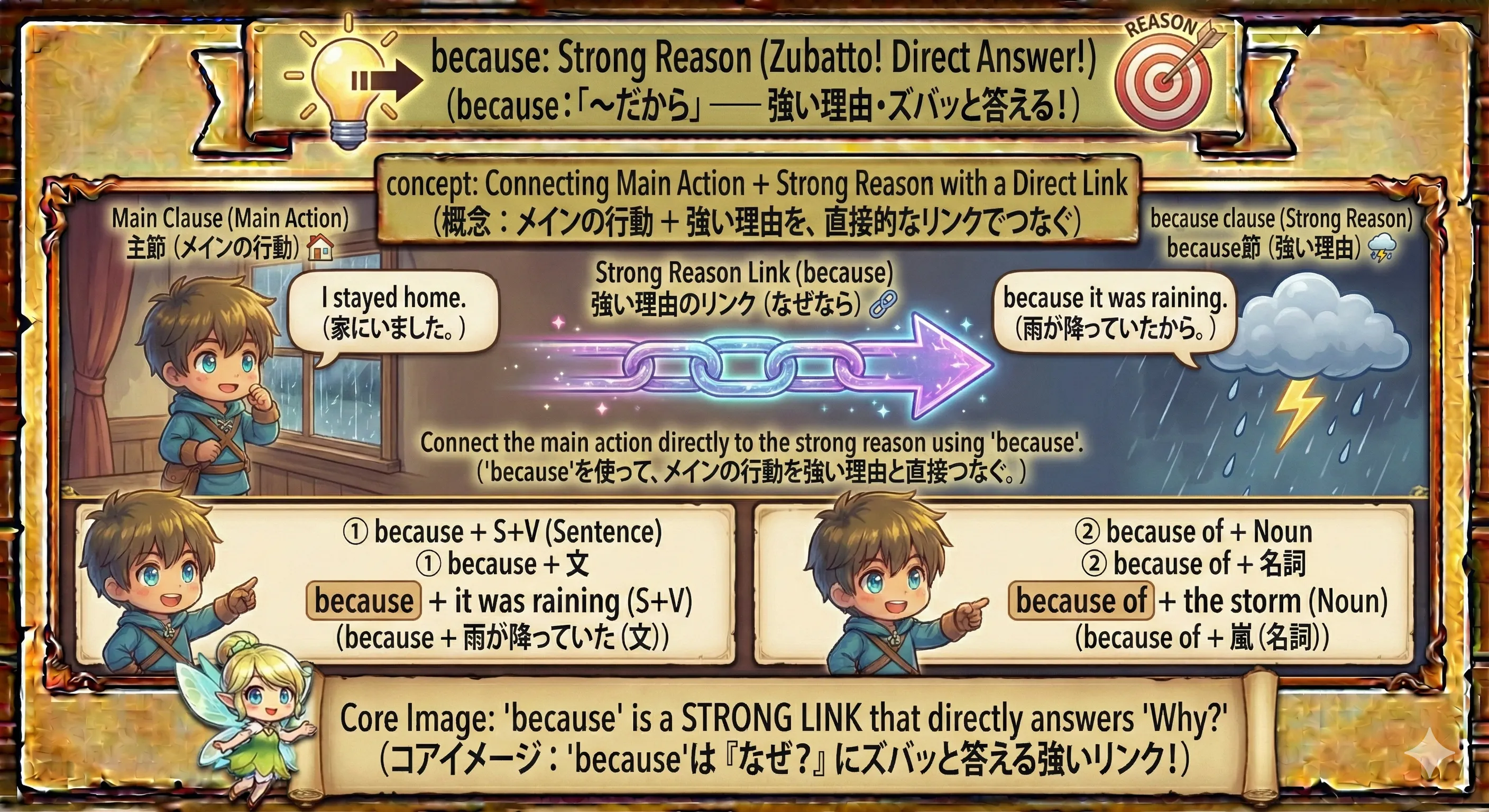
🧩 まずは骨格:主節+because節(理由)
I stayed home because it was raining.
✅ まず言いたいこと(主節)を置いてから、理由(because節)を足すとスッキリ伝わります。
Because it was raining, I stayed home.
✅ 先に理由を出してから主節へ。文章では カンマ(,)が“切れ目”になります。
🧭 迷ったらここ:becauseの「見分け3つの軸」
because は 理由が中心になりやすい💥
「これが理由!」とハッキリ言いたいときに向きます。
because は 理由をちゃんと伝える場面が多いです。
(新しく教える理由)になりやすいイメージ。
because + S + V(文)✅
because of + 名詞(もの/ことの名前)✅
(名詞=物の名前みたいな形)
「because と so を同時に使う」のは避けましょう。
❌
Because it was raining, so I stayed home.(理由+結果が二重)✅
Because it was raining, I stayed home. / ✅ It was raining, so I stayed home.
まずは「主節+because節」の形で、理由を1本スッと足せるだけで十分伸びます。
📘
例文で感覚をつかむ(because / because of)
-
because
because + S + V(理由は文) -
because of
because of + 名詞 / 動名詞(理由は名詞) - ✅ 1日1文でもOK!「できた!」の積み重ねが継続のコツ✨
I stayed home because it was raining.
(雨が降っていたので、家にいました。)
🔧 構造:S + V + because + S + V
💡 「主節(結論)」を先に読んでから理由を足すと、理解がスムーズです。
Because I was tired, I went to bed early.
(疲れていたので、早めに寝ました。)
🔧 文頭の理由節:Because S + V, のあとに主節
📝 ポイント:理由を先に出すと「言い訳っぽく聞こえる」ことも。丁寧さを意識すると好印象✨
I love you because you're you.
(あなたがあなたでいてくれるから、愛してる。)
💬 直訳しづらいけど超定番:you're you=「あなたはあなた」
🔥 学習のコツ:感情が動く例文ほど記憶に残ります。覚えるなら“好きな文”から!
I didn't go out because I had a fever, so I stayed in.
(熱があったので、外出せず家にいました。)
⚠️ 否定が入ると「理由の否定」に聞こえる可能性も。
✅ こうして so 〜 で結果を足すと誤解が激減します。
We canceled the trip because of the storm.
(嵐のせいで、旅行を中止しました。)
🔧 構造:because of + 名詞(ここでは the storm)
❌ because of it was ... はNG(文は置けません)→ 文にしたいなら because。
I bought it because it was on sale.
(セールだったので、それを買いました。)
💬 想定Q:Why did you buy it?
✅ 返答はこの形が鉄板:I did A because B.(Aの理由がB)
because + 文 / ✅ because of + 名詞
⏱️ 1分チェック:because を選べる?
-
Q1. ( )it was late, I took a taxi.「理由の文」を入れたい:(because / because of)どっち?
-
Q2. I stayed home because of( ).(名詞=もの/ことの名前)を入れたい:例)the rain
-
Q3. ❌ Because it was raining, so I stayed home. → どこを直す?理由+結果が二重。(because か so のどちらかにする)
Because(文:it was late が入る)the rain など名詞(だから because of)Because it was raining, I stayed home. または It was raining, so I stayed home.「完璧に分かってから進む」より、「だいたい分かった状態で例文を回す」方が、 記憶に残って続きやすいです。今日は “because=理由の芯” を持ち帰れば大勝利です🔥
4-2. since:「〜だから/〜ゆえに」(前提っぽい理由)
since は「理由」を作れますが、because ほど強く主張しないのがコツです💡
どちらかというと、「もう分かってるよね」という
前提(みんな知ってる話)を添える感じになりやすいです。
つまり、主役は主節(言いたいこと)で、since節は“背景説明”になりやすいイメージ。
ここでは詳しい差は後でOK。「since=控えめな理由(前提)になりやすい」だけ先に掴みましょう✅
むずかしい言葉が出たら、(かんたんな言いかえ)もセットで覚えます。
例:前提(みんな知ってるスタート条件)/背景(うしろの説明)など😊
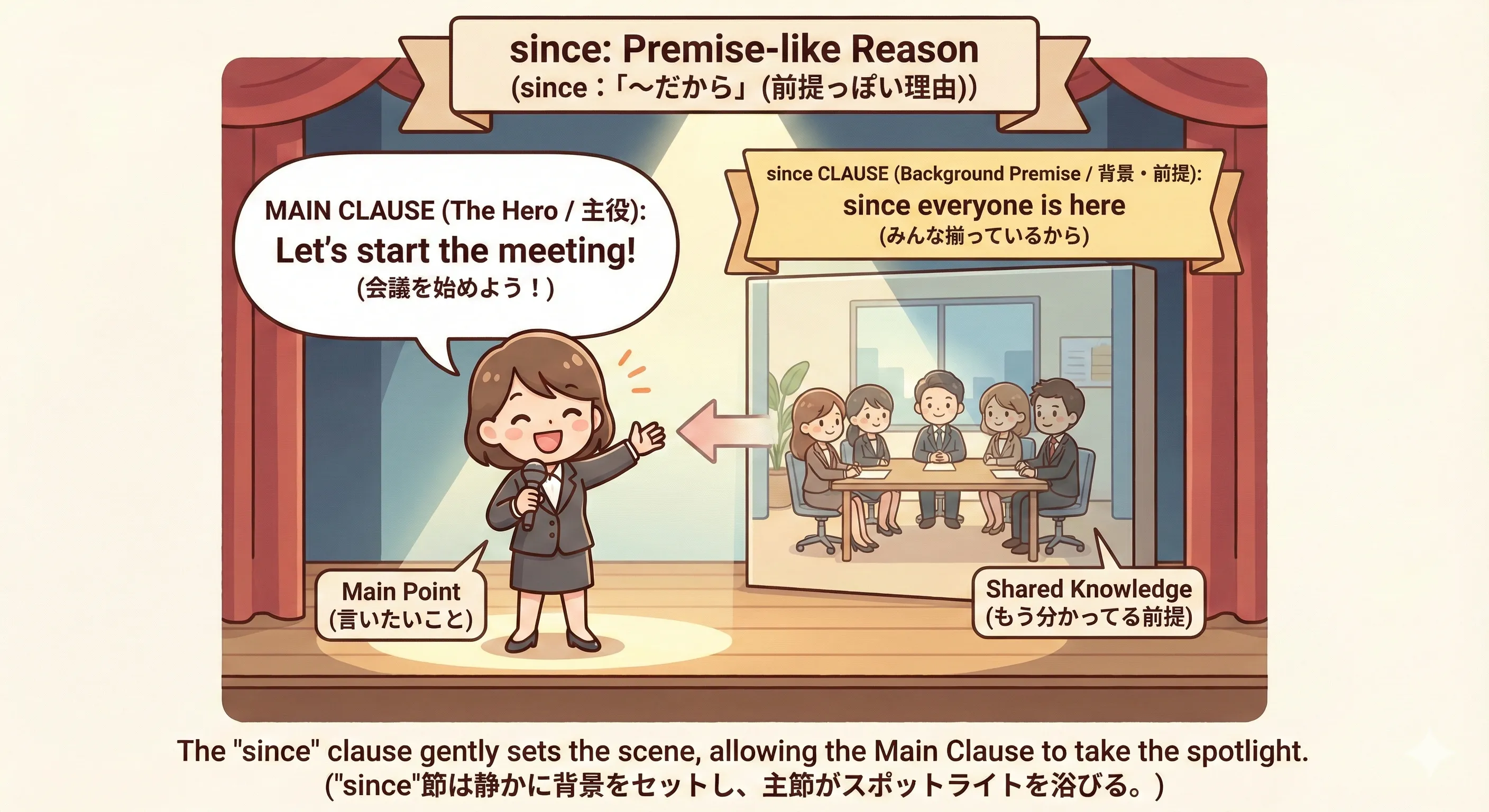
🧩 まずは骨格:主節(主役)+since節(背景の理由)
Let’s start the meeting since everyone is here.
✅ 「みんな揃ってるよね(前提)」→「じゃあ始めよう(主役)」の流れ。主節が目立ちやすいです。
Since it’s getting late, we should wrap up.
✅ 先に背景を置くと、話がスムーズに進みます。文頭のときはカンマ(,)が目印。
🆚 because と since の“空気感”の違い
「これが理由!」と強めに言う感じ。
(理由をしっかり説明したい)ときに便利💥
「だって(もう分かってるよね)」の空気。
主節を前に進めるための“補助説明”になりやすいです🧠
since は「〜以来(時)」の意味もあります。今ここは 理由の since(〜だから) の話。
見分けはシンプルで、「時間の起点(いつから?)」が見えるなら “時” の since になりやすいです。 (起点=スタート地点)
「since=背景っぽい理由」と分かった時点で、文章が読みやすくなります✨
📘
例文でつかむ:since(理由)
since は「主節を進めるための背景」- since 「もう分かってるよね / そういう状況だし」で主節へスッとつなぐ
- because 「理由そのもの」をしっかり説明したいときに強い
- ✨ 主役は主節!
sinceは“前置き”のイメージでOK
Since you’re here, let’s talk now.
(せっかくここにいるんだから、今話そう。)
🔧 構造:Since S + V, 主節
💡 「前提(状況)」→「じゃあこうしよう!」の流れで自然です。
I’ll email you the details since you missed the meeting.
(会議に出られなかったみたいだから、詳細をメールするね。)
💬 “会議にいなかったしね”=共有の前提としてサラッと言える
✅ メール・チャットで使うと角が立ちにくい便利表現です。
Since it’s raining, we can stay in and watch a movie.
(雨だし、家で映画でも見よう。)
🎯 “雨だから”というより「雨なんだし(状況的に)」のニュアンス
✨ 主節の提案を気持ちよく通す“前置き”になります。
Since you have a moment, could you help me with this?
(今少し時間あるなら、これ手伝ってくれる?)
🧸 「時間ある?」→その前提でお願い、だから押しつけ感が弱い
✅ 依頼文は Could you ...? と相性抜群です。
We should leave now since the train is coming soon.
(電車がもうすぐ来るから、今出よう。)
🎬 主役は We should leave now(今出るべき)
🧠 since は“背景”として添えるだけ。 だから会話がテンポ良くなります。
4-3. as:「〜だから」(控えめな理由・背景)
as も「理由(〜だから)」を作れますが、理由としては
控えめで“背景”になりやすいのがポイントです💡
体感としては、since に近いことが多く、
主節(言いたいこと)を前に進めるための前提として添える感じ。
ただし as は「時(〜する時)」「様態(〜のように)」「比較(as ... as)」など
別の意味も多いので、
「今ここは“理由の as”」と意識して読めると迷子になりにくいです😊
まずは「as=理由は控えめ、背景として添える」を掴めばOK。細かい使い分けは後で育てましょう✅
むずかしい用語が出たら、(小学生にもわかる言いかえ)を添えます。
例:前提(話のスタート条件)/背景(うしろの説明)など。

🧩 まずは骨格:主節(主役)+as節(背景の理由)
Let’s take a taxi as it’s getting late.
✅ 「遅くなってきたし(背景)」→「タクシーで行こう(主役)」の流れ。理由の主張は強すぎないです。
as は意味が多いので、まずは「何を聞かれてる?」で判断します。“なんで?” に答えているなら「理由の as」になりやすいです。 (“なんで?”=理由)
🎚️ 強さの目安:because > since ≒ as
「これが理由です!」としっかり主張しやすい💥
「もう分かってるよね」感の背景になりやすい🧠
背景としてさらっと添える感じ。
(ただし意味が多いので注意)
「as=控えめな理由(背景)」と分かるだけで、読み違いが減ってスピードが上がります✨
📘
例文でつかむ:as(理由)
as は「理由=背景」をサラッと添える表現- as 主節が主役。理由は“軽く補足”でテンポよく進む
- because 理由を強く主張したいときに向く
- ✅ 迷ったら「理由を主張したい?」と自分に質問🔑
As I have a meeting soon, I can’t stay long.
(もうすぐ会議があるので、長くはいられません。)
🔧 構造:As S + V, 主節
💡 「理由を強く言う」というより“事情として添える”感じが自然です。
Let’s eat inside as it’s too cold outside.
(外は寒すぎるから、中で食べよう。)
🎯 主役は提案:Let’s eat inside
🌡️ 理由は“サラッと背景”。会話がテンポ良く進みます。
As the store is closed today, we’ll go tomorrow.
(今日は店が閉まっているので、明日行きます。)
🗓️ 「状況(今日閉店)」→「判断(明日行く)」の流れ
✅ “説明”というより“自然な前提”として置けるのが as。
As you know the system well, could you check this for me?
(そのシステムに詳しいので、これを確認してくれますか?)
🧸 “あなたが詳しいのは前提” → だからお願いしやすい
✨ 依頼が自然に聞こえるクッションになります。
As it’s a weekday, the roads should be less busy.
(平日なので、道はそこまで混まないはずです。)
🔮 主役は予測:should be less busy
✅ as は“根拠”を軽く添えるのにピッタリ。
I’ll call you later as I’m in the middle of something.
(今手が離せないので、あとで電話するね。)
📌 in the middle of something=「ちょうど手が離せない」
💡 強く言わずに事情を説明できるので、やさしい印象になります。
As the deadline is approaching, please submit your report by Friday.
(締め切りが近づいているので、金曜までにレポートを提出してください。)
📝 文書・案内でよくある形:前提(締切)→依頼(提出)
✅ as は文章だと「自然で少しフォーマル」になりやすいです。
because、
“背景として添える理由”は since / as。
4-4. that:「(感情)〜なので」(気持ちの理由をつなぐ)
この that は、「気持ちの中身」を後ろに置いて、
感情の理由(なぜそう感じたか)を説明します😊
よく出るのは glad happy sorry sad surprised などの
感情形容詞(気持ちを表す形容詞)とセット。
イメージは「私はうれしい」+「その理由(内容)」を
that でくっつける感じです✨
ここでは詳しい文法に入る前に、「感情+that=気持ちの中身(理由)」をまず掴みましょう。
むずかしい用語が出たら、(小学生にもわかる言いかえ)も添えます。
例:内容(中に入っている話)/理由(なんでそう思うか)など。
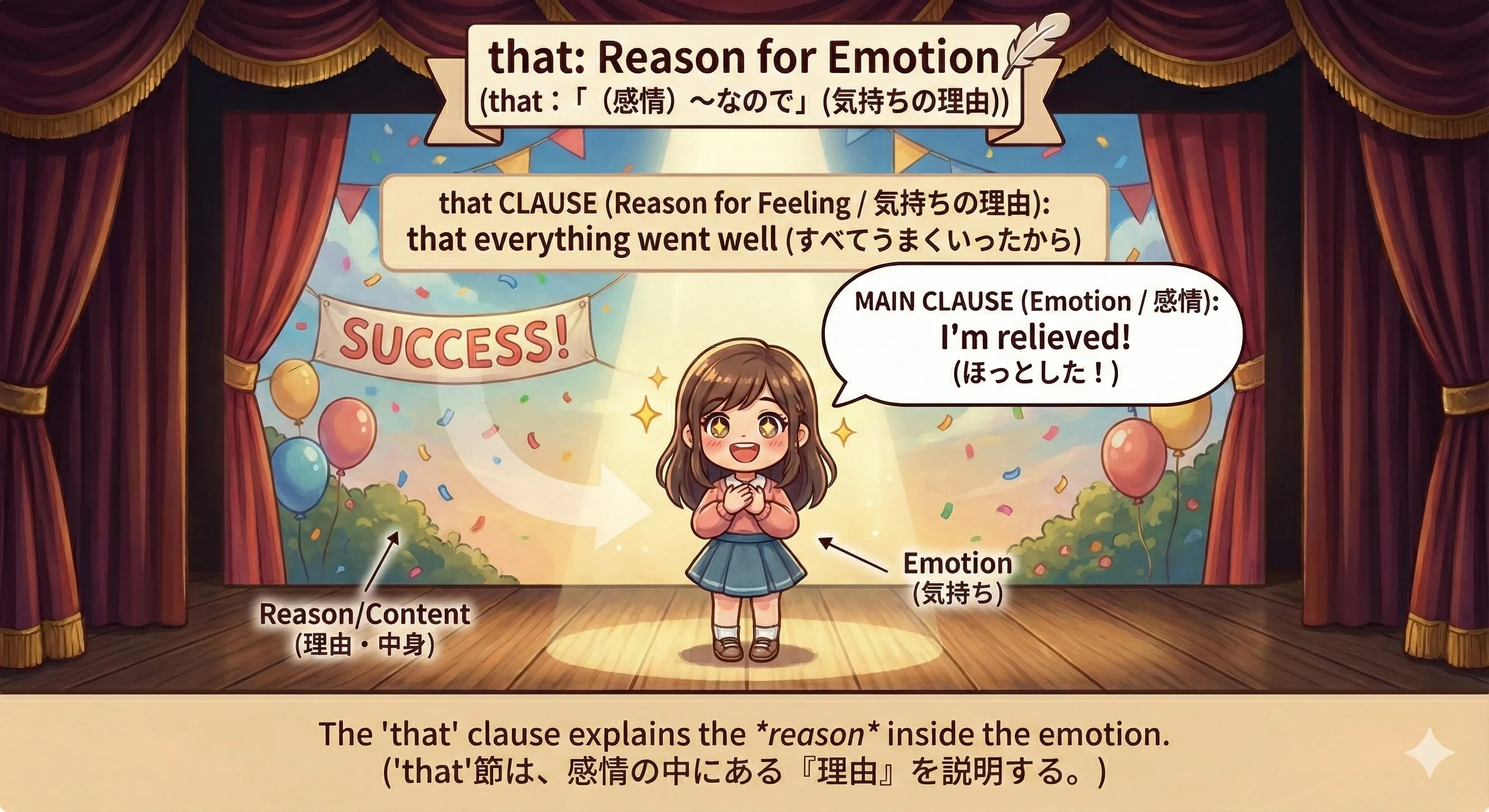
🧩 骨格:感情(気持ち)+ that(中身・理由)
I’m happy that you’re here.
✅ 「うれしい」→「その理由(君がここにいること)」を that でつなぐ。
that は「場所・時間」ではなく、
“気持ちの理由(中身)”を置くための合図です。(中身=何についての話か)
🧠 よく出る組み合わせ(まずはここだけで十分)
glad
happy
relieved
「うれしい/ほっとした」+ that ... で理由を言いやすい😊
sorry
sad
surprised
「申し訳ない/悲しい/驚いた」も that ... と相性◎
「気持ち+that=理由(中身)」が分かると、英語の“感情表現”が一気に言いやすくなります✨
📘
例文でつかむ:感情 + that
-
コツ
感情語(
glad/sorry/surprised…)を見たら、 「このあとに理由が来る!」と予測すると読みやすい🎯 -
会話
thatは省略されることも多い(意味は同じ)✨ - ✅ 1文ずつ“感情→理由”で音読すると、英語の処理が速くなります🔥
I’m glad that you could make it today.
(今日は来られてよかったね。)
🔧 型:I’m glad(気持ち)+ that ...(理由)
💬 会話では I'm glad you could make it. と that を省略することも多いです。
I’m relieved that everything went well.
(すべてうまくいって、ほっとしました。)
🧠 “安心した”系はセットで覚えると強い:I’m relieved that ...
✅ まず気持ちを言い切ってから理由を言うと、英語らしい順番になります。
I’m sorry that I replied so late.
(返信が遅くなってごめんなさい。)
💬 よくある省略:I’m sorry I replied so late.(that省略)
✨ “ごめん”→“何が” の順で言えると、言い訳っぽくならず丁寧です。
She was sad that her friend had to move away.
(友だちが引っ越さなければならなくて、彼女は悲しかった。)
📌 had to は「〜しなければならなかった」
🎯 感情(sad)が先に来るから、聞き手は“理由待ち”になって理解がラクになります。
I was surprised that the test was so easy.
(テストがこんなに簡単で驚きました。)
🔧 型:I was surprised + that ...
💬 「え、簡単すぎた!」みたいな“感想”にそのまま使えます。
We’re happy that you’re joining our team.
(あなたがチームに加わってくれてうれしいです。)
👥 新メンバー歓迎の定番:We’re happy that ...
✨ “うれしい”→“理由”の順ができると、自然で丁寧な印象になります。
I’m upset that you didn’t tell me earlier.
(もっと早く言ってくれなかったのが悲しい/腹立たしいです。)
💬 upset は「悲しい・怒っている」どちらにも寄る便利語
🧠 感情を言葉にできると、英会話の“詰まり”が一気に減ります。
glad/sorry/surprised など)を見たら、
「後ろに理由(中身)が来るかも」と予測すると読みやすくなります。
4-5. now (that):「今や〜だから」(状況が変わった“今”が理由)
now (that) は、「状況が変わった今」を理由にして、
主節の行動や判断につなげる表現です⏱️
because みたいな強い理由というより、
「もう条件がそろった/前提が変わったから」
という“流れ”を作るのが得意です💡
ここでは詳しい説明に入る前に、「今や〜だから → じゃあ次はこうしよう」のつながりを掴みましょう。
むずかしい用語が出たら、
(小学生にもわかる言いかえ)
も一緒に添えます。
例:前提(もう分かってる条件)/状況(いまの状態)など。
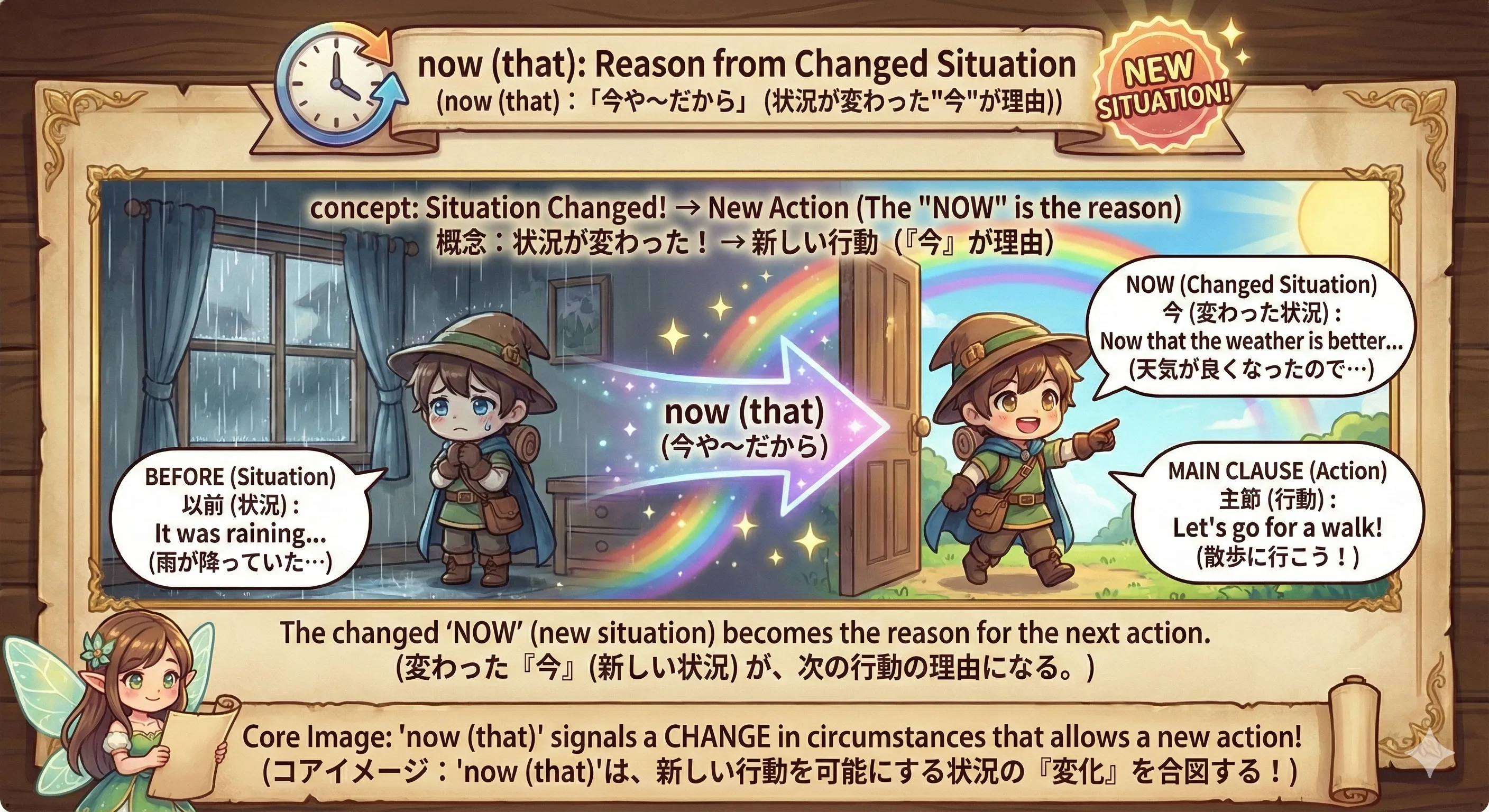
🧩 骨格:now (that)(今の前提)→ 主節(次の行動)
Now (that) you’re here, we can start.
✅ 「来た(状況が変わった)」→「だから始められる」の流れ。
now は「今」という時間語ですが、
ここでは “今になったこと(変化)”を理由にします。(変化=前と違う状態になったこと)
🧭 because とどう違う?(ざっくりでOK)
「〜だから(強い理由)」をはっきり言う。
理由そのものを前面に出す感じ。
「前と違う“今”になった」→「だから次へ」の流れ。
前提(もうそうなったよね)っぽい理由が多い。
now (that) を見たら「状況が変わった今 → 次の行動」の合図だと思えばOKです✨
📘
例文でつかむ:now (that)
- now (that) 「今はもう〜だ」=状況の変化が合図
-
that
省略OK(意味は同じ)。会話では
Now everyone is here, ...もよく使います✨ - ✅ “変化ポイント” を見つけられたら勝ち!英文が一気に読みやすくなります🔑
Now that everyone is here, let’s begin the meeting.
(みんなそろったので、会議を始めましょう。)
🎯 変化ポイント:everyone is here(そろった)
➡️ 次の行動:let’s begin(始めよう)
Now that I’ve finished my work, I can relax a little.
(仕事が終わったので、少し休めます。)
✅ 完了が理由:I've finished → 結果:I can relax
💡 “終わった今なら〜できる” の定番パターンです。
Now that the weather is better, we can go for a walk.
(天気が良くなったので、散歩に行けます。)
🌤️ 変化ポイント:better(良くなった)
➡️ “今ならできる” の流れが now (that) と相性◎
Now that you know the rule, you won’t make the same mistake.
(ルールが分かったから、同じミスはしないでしょう。)
🧠 変化ポイント:you know the rule(分かった)
✅ “理解した今なら”=学習の文脈で使うと説得力が出ます。
Now that we’ve moved, the commute is much easier.
(引っ越したので、通勤がずっと楽になりました。)
🏠 変化ポイント:we’ve moved(引っ越した)
➡️ 結果:much easier(かなり楽)=“変化→結果”がはっきり見える例。
Now that things have settled down, we should review the plan.
(状況が落ち着いたので、計画を見直しましょう。)
📌 settle down=「落ち着く」
🎯 “バタバタ→落ち着いた” の変化があるからこそ、次の行動(見直し)が自然です。
Now that you’ve got the basics, you can try the next level.
(基礎がつかめたので、次のレベルに挑戦できます。)
🚀 変化ポイント:you’ve got the basics(基礎が身についた)
🔥 学習は“到達→次へ”の連続!今日の積み上げが次の扉を開きます。
now (that) は「今こうなった」→「だから次へ」の合図。
文を読むときは “変化したポイント(今や〜)” を先に探すとスッと入ります。
4-6. seeing (that):「〜であるからには」(見れば分かる前提 → 結論)
seeing (that) は、「状況を見れば分かるよね」という
前提(もう分かってる条件)
を置いて、主節の判断につなげる言い方です👀
日本語だと「〜なんだから」「〜なんだし」に近いニュアンスで、
理由というより“前提の共有” がメインになります。
ここでは詳しい説明に入る前に、「前提→結論」の流れをまずつかみましょう。
むずかしい語が出たら、
(小学生にもわかる言いかえ)
を添えます。
例:前提(もうそうだよね、という条件)/判断(どうするか決めること)
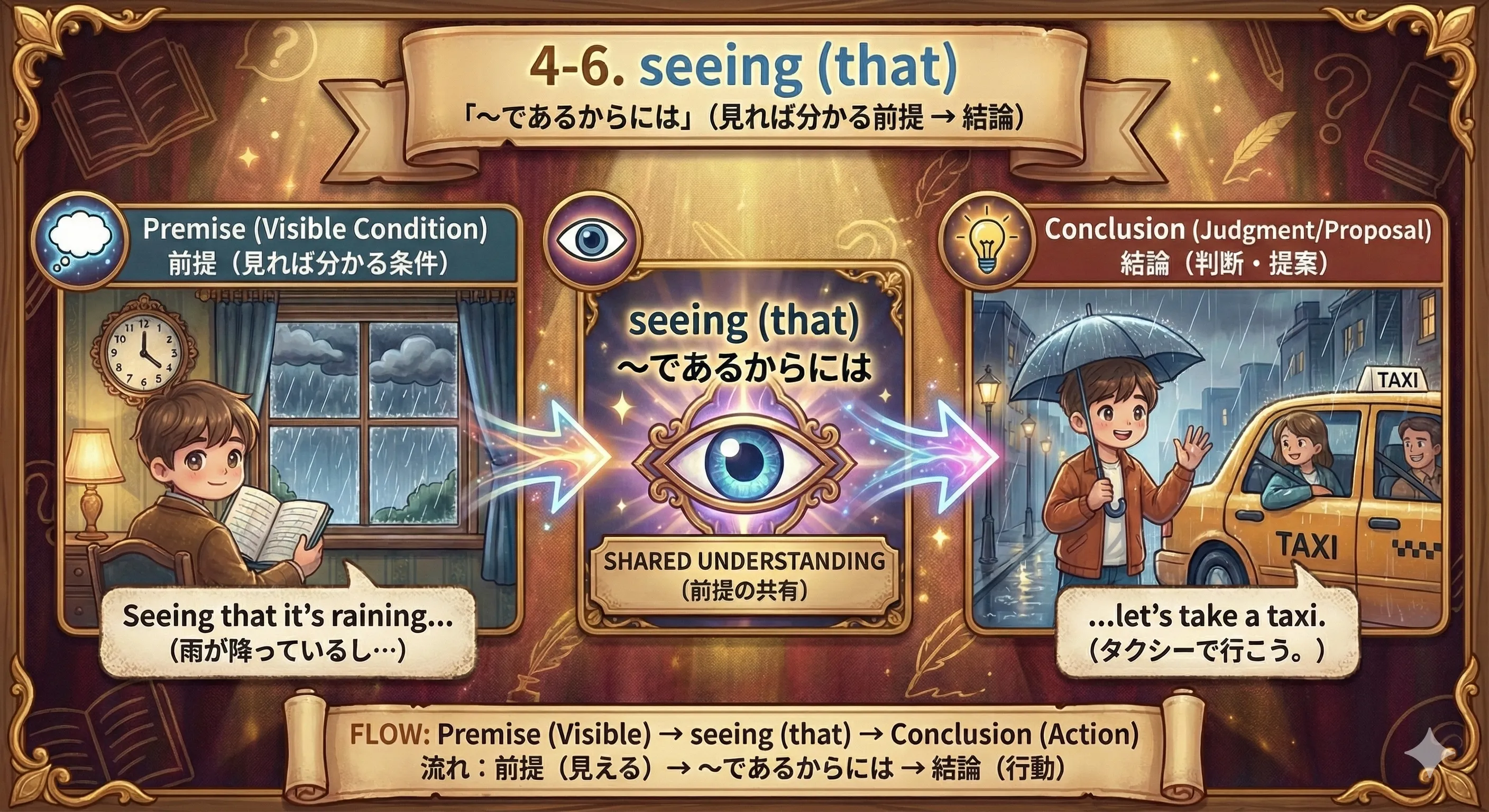
🧩 骨格:前提(見れば分かる)→ 主節(結論・提案)
Seeing that it’s getting late, we should head home.
✅ 「遅くなってきた(見れば分かる)」→「だから帰ろう」。
seeing that は会話でも使えますが、やや「説明っぽい・判断っぽい」響き。迷ったら
since(前提っぽい理由) と同じ方向だと思えばOKです。
🧭 ざっくり使い分け(because / since / seeing that)
「〜だから」をズバッと。理由が主役。
「〜なんだし」。相手も知ってそうな前提。
「状況を見れば分かるよね」→ そこから判断へ。
seeing (that) は「前提の共有」→「じゃあこうしよう」の流れで読めばOKです👀✨
📘
例文でつかむ:seeing (that)
- seeing (that) 「(見れば)そうなんだから」=前提として置く事実をサラッと提示
- that 省略OK(意味は同じ)。文章でも会話でも使えます✨
- ✅ まず “前提の事実” を拾えたら、主節(結論)がスッと入ります🔑
Seeing that it’s getting late, we should head home.
(遅くなってきたので、帰ったほうがいいね。)
🎯 前提:it’s getting late(遅くなってきた)
➡️ 結論:we should head home(帰ろう)
Seeing that you’re busy, I’ll call you later.
(忙しそうだから、あとで電話するね。)
🧸 “忙しいのが見て分かる” → だから配慮する、が自然
✅ 相手を立てる言い方になりやすいのもポイントです。
Seeing that it’s raining, let’s take a taxi.
(雨が降っているし、タクシーで行こう。)
🌧️ 前提:雨(見て分かる)→ 方針:タクシー
💡 “状況を見て判断した”ニュアンスが出ます。
Seeing that she has improved a lot, she deserves a chance.
(彼女はかなり上達したんだから、チャンスを与えるべきだ。)
🏅 前提(事実):has improved a lot(大きく上達)
➡️ 結論:deserves a chance(チャンスに値する)
Seeing that the budget is limited, we need a simpler plan.
(予算が限られている以上、もっとシンプルな計画が必要だ。)
💼 “予算が限られている”=誰が見ても分かる前提として置きやすい
✅ その前提から「だから計画をシンプルに」へ自然につなげられます。
Seeing that the test results are good, we can move to the next step.
(テスト結果が良いので、次の段階に進めます。)
📊 前提:results are good(結果が良い)
➡️ 次へ:move to the next step(次の段階へ進む)
Seeing that demand is rising, we’ll increase production next month.
(需要が伸びているので、来月は生産を増やします。)
📝 “見て分かる事実(需要増)” → “決定(増産)” の論理がきれい
✅ 説明文・報告文にもそのまま使える形です。
seeing (that) =「(見れば)そうなんだから」→「じゃあこうしよう」👀
読むときは “前提として置いている事実” を先に拾うと分かりやすいです。
4-7. considering (that):「〜を考えると」(条件・事情を踏まえて → 判断)
considering (that) は、「条件や事情を踏まえると」という
判断の土台
を作ってから、主節の結論へつなげる表現です🧠📌
「理由」よりも、“いくつかの条件をまとめて見て”判断する感じ。
日本語の「〜を考えると」「〜のことを思えば」にかなり近いです。
ここでは詳しい説明に入る前に、「踏まえる → 決める」の流れをまずつかみましょう。
むずかしい語が出たら、
(小学生にもわかる言いかえ)
を添えます。
例:事情(その場の状況)/判断(どうするか決めること)/条件(ルールや前提)
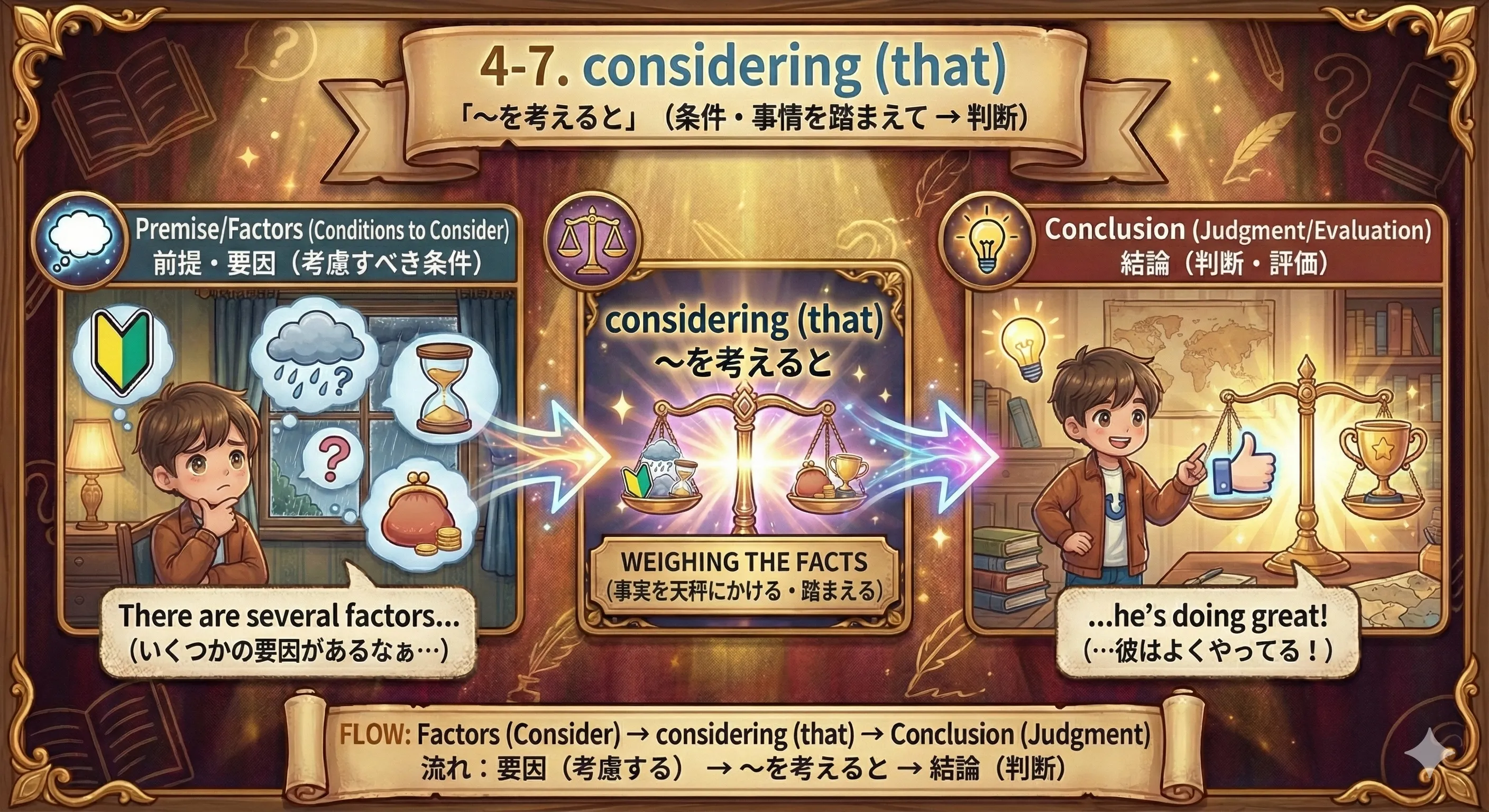
🧩 骨格:事情(考慮)→ 主節(判断・提案・結論)
Considering that he just started, he’s doing great.
✅ 「始めたばかりという事情」→「それを踏まえると、すごくよくやってる」。
because は「理由が主役」/considering (that) は「事情を踏まえた評価・判断」が主役です。
🧭 ざっくり使い分け(because / seeing that / considering that)
「〜だから」をズバッと。理由が中心。
状況を共有して、次の判断へ。
条件を“まとめて”見て、評価・結論へ。
considering (that) は「事情を踏まえる」→「だから判断する」の順で読めばOKです🧠✨
📘
例文でつかむ:considering (that)
- considering (that) 「〜を考えると」=判断材料をまとめて“評価・提案・結論”へつなぐ
- that 省略OK(意味は同じ)。会話でも文章でも使えます✨
- ✅ “材料 → 結論” の順で読むと、論理がスッと入ります🔑
Considering that he just started, he’s doing great.
(始めたばかりということを考えると、彼はよくやっている。)
🎯 判断材料:he just started(始めたばかり)
➡️ 評価:he’s doing great(よくやってる)
Considering that it might rain, we should bring an umbrella.
(雨が降るかもしれないことを考えると、傘を持っていったほうがいい。)
☔ 材料:might rain(降るかも)
➡️ 提案:should bring(持っていくべき)
Considering that we’re short on time, let’s keep it simple.
(時間がないことを考えると、シンプルにいこう。)
⏳ 材料:short on time(時間がない)
➡️ 方針:keep it simple(簡単にいく)=判断が自然になります。
Considering that the budget is tight, a smaller venue makes sense.
(予算が厳しいことを考えると、会場は小さめが妥当だ。)
💰 材料:budget is tight(予算が厳しい)
✅ 結論:makes sense=「それが妥当」→ 大人っぽい言い方になります。
Considering that she isn’t feeling well, we can reschedule.
(彼女が体調がよくないことを考えると、予定を変更してもいい。)
🧸 材料:isn’t feeling well(体調がよくない)
➡️ 判断:we can reschedule(変更できる)=相手への配慮が伝わります。
Considering that sales have grown, the new plan seems to be working.
(売上が伸びていることを考えると、新しい計画はうまくいっているようだ。)
📈 材料:sales have grown(売上が伸びた)
➡️ 結論:seems to be working(うまくいってそう)=断定しすぎず自然。
Considering that it’s a small team, we’ve achieved a lot this year.
(小さなチームだということを考えると、今年はかなりの成果を出しました。)
🏆 材料:it’s a small team(小規模)
✅ 結論:achieved a lot(大きな成果)=“条件込みの評価”ができます。
considering (that) =「〜を考えると(事情をまとめて見る)」→「だから判断する」📌
読むときは先に “判断材料(状況・条件)” を拾うとスッと入ります。
5. 目的を表す(so (that) / in order that / ...)
ここでは、「何のために?」を説明する
副詞節(文のかたまりで“追加説明”する部分)
をまとめて案内します🎯
キーワードは so (that) in order that for fear (that) in case lest。
目的の節は 助動詞(can / will / may など=気持ち・可能性を足す言葉) が入りやすいのが目印です。
ここでは詳しい説明に入る前に、「目的=ゴールに向かう理由」だけ、まずはざっくり掴みましょう。
むずかしい用語が出てきたら、 (小学生にもわかる言いかえ) を一緒に添えます。たとえば「目的(やりたいこと)」「用心(念のための備え)」「否定目的(〜しないため)」のように、意味がすぐ浮かぶ形にします😊
従位接続詞 × 目的 入口(案内) Lesson 109 / Section 5
🧭 「目的」は“達成したい”だけでなく、“回避(for fear)・備え(in case)”まで含めて整理すると一気に分かりやすくなります。
🗺️ まずは“地図”を1枚:目的の節は 5パターンで迷子にならない
-
軸① ふだん使い?文章?:
so (that)は口語で万能、in order that/lestは文章寄り📄 -
軸② やりたい?避けたい?:
for fear (that)/lestは「〜しないように(避けたい)」が主役🙅♀️ -
軸③ 念のため?:
in caseは「万が一」に備える用心(保険)🧯
目的の節は「ゴール(目的)」か「回避(避けたい)」かを先に決めると、選びやすくなります🎯
🧭 次はどちらから読む? 5-1 ~ 5-5 へのナビゲーション
どこから読んでもOKです。いちばん気になるカードをタップして進みましょう。 「よく使うのから」「苦手そうなのから」どちらでも、続けた人が勝ちです🔥
人は「完璧に分かってから始める」よりも、 「だいたい分かった状態でまず使ってみる」 方が、記憶に残りやすく学習が続きやすいです。
まずは
so (that) と in case だけでも、“今日の勝ち”にしましょう✅
5-1. so (that):「〜するために/〜となるように」
so (that) は、主節(メインの文)の行動に
「目的(ねらい)」をくっつける表現です🎯
「〜するために」「〜となるように」というゴールを示すので、
目的の節には can / will / may / should などが入りやすいのが目印です。
ここでは詳しい説明に入る前に、「まずは “ゴールを言っている” 感覚」をつかむのが目標です。
むずかしい用語が出てきたら、 (小学生にもわかる言いかえ) を一緒に添えます。たとえば「主節(メインの文)」「副詞節(追加説明の文のかたまり)」のように、すぐ意味が浮かぶ形にします😊
従位接続詞 × 目的 5-1 本編 Lesson 109 / Section 5-1
🧩 まずは超かんたんに定義(ここだけ覚えればOK)
“やりたいこと(ゴール)”のために、主節の行動をするイメージ。
(目的=「ねらい」)
“そうなる状態”を作るために動くイメージ。
(目標=「めざす形」)
あとは「見分けのコツ」を押さえるだけで、
so (that) がスッと見えるようになります。
🧭 “地図カード”で全体を一枚に(読む前の道しるべ)
まずはこの形だけ見てください。主節(メイン)に、 目的/目標の節をくっつけます。 「目的の節」には 助動詞 が出やすいのもポイントです。
🧠 見分けの3つの軸(ここだけで8割)
so (that) が有力。
結果:「そうなった結果…」→ すでに起きた話。
目的=“ゴールを作りに行く”/結果=“起きたことの帰結(きけつ)”(帰結=最後にそうなったこと)
📝 例文でつかむ so (that)(目的・目標)
読み方:
主節 → so (that) → 目的の節(ゴール)🎯
目的の節に can / will / may / should が来たら、
「目的っぽさ」が強まります。
I speak slowly so (that) everyone can understand.
みんなが理解できるように、ゆっくり話します。(目的=ねらい)
Please save the file so (that) we will have a backup.
バックアップが残るように、ファイルを保存してください。(目標=めざす形)
I'll send you the link so (that) you may join the meeting.
会議に参加できるように、リンクを送ります。(may=〜できるように/丁寧)
Turn on the lights so (that) we can see the screen.
画面が見えるように、ライトをつけてください。(目標=見える状態を作る)
I wrote it down so that I should not forget it.
忘れないように、書き留めました。(should=〜するように/古めで丁寧)
Let's leave early so (that) we can avoid traffic.
渋滞を避けられるように、早めに出ましょう。(avoid=避ける)
目的の
so (that) は「これからそうしたい(未来へ矢印)」。
結果の so ... that(とても〜なので…)とは別モノです。
迷ったら「ゴール(目的)があるか?」でチェック✅
⚠️ 最低限の注意点(ルール系はここで一度だけ)
so that の that は、会話ではスッと消えることが多いです。
(省略=書かない/言わないこと)
so ... that(結果)と別物
目的は「〜するために」。結果は「とても〜なので…」の流れ。
迷ったら “未来へ向かうゴール” があるかで判定します。
to 不定詞との使い分けは後でOK。今はまず
「目的=so (that) が作れる」 の骨格だけで十分です。
⏱️ ミニ診断(1分チェック)
“完璧に分かってから進む”より、「だいたい分かった状態で動く」方が学習は続きやすいです。 まずはサクッと確認していきましょう。
so that の that はどうなることが多い?so (that) の「骨格」はもう手に入っています。次は各パターン(助動詞の雰囲気など)を見ていくだけでOKです!
5-2. 目的を表す in order that(~する目的で)
in order that は、「何のために?」を文章で丁寧に説明したいときの型です🎯
とくに目的の節(in order that ~ の中)には
can may will should などが入りやすく、
「こうなるように」というゴールをはっきり言えます。
ここでは詳しい説明に入る前に、「まずはざっくりイメージをつかむ」ことを目標にしましょう。
むずかしい用語が出てきたら、 (小学生にもわかる言いかえ) を一緒に添えます。たとえば「目的=ねらい」「助動詞=気持ちや可能性を足す語」のように、意味がすぐ浮かぶ形にします😊
従位接続詞 × 目的 入口(案内) Lesson 109 / 5-2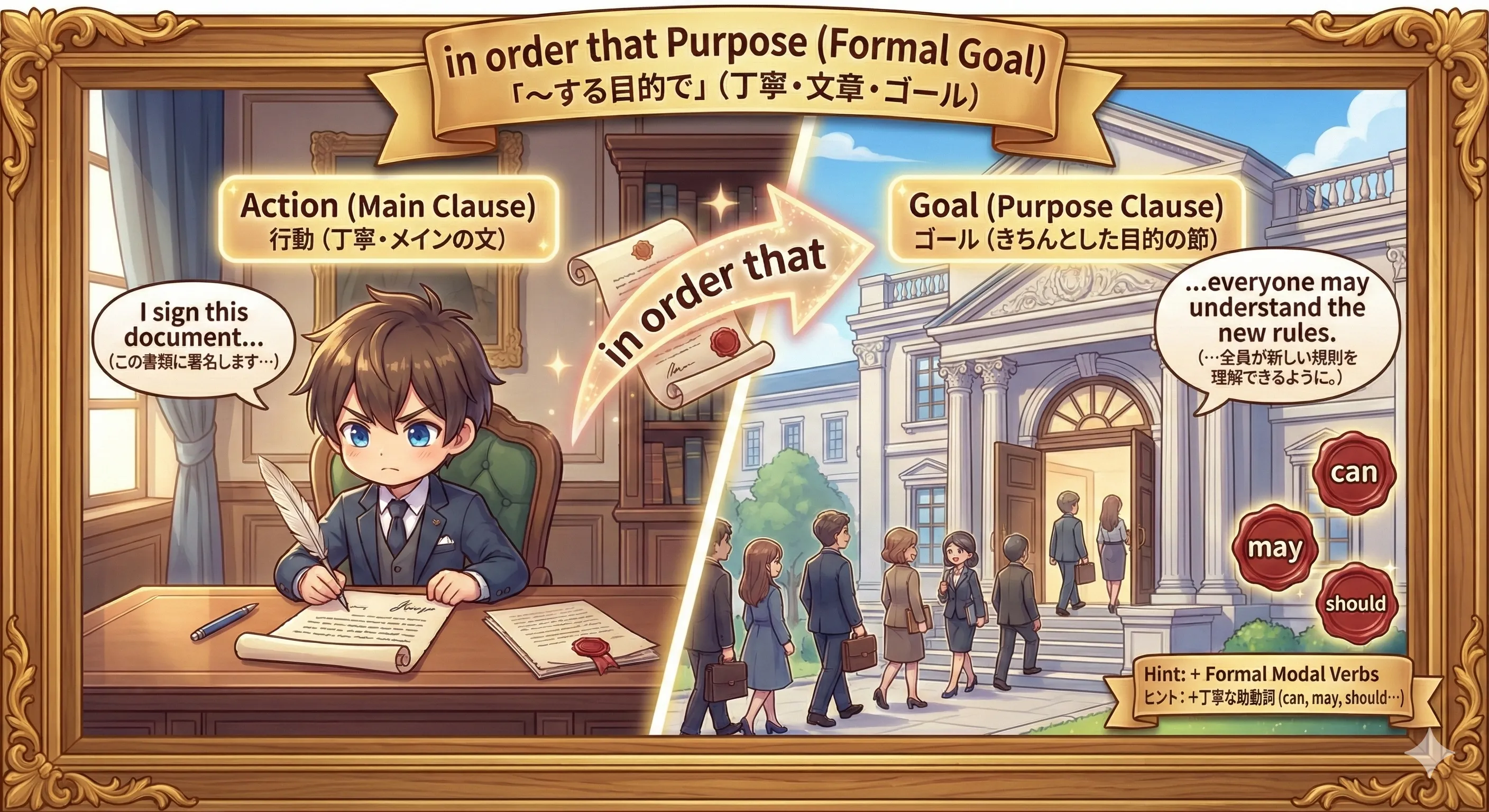
🎯 in order that は「目的(ゴール)」をはっきり言う硬めの表現。
「〜できるように/〜するために」という 到達目標 を意識すると理解が速くなります。
(「何のため?」の答え)
(案内・説明・規定っぽい)
(can / may / will / should など=気持ちや可能性を足す語)
in order that の強みです。
🪄
5-1 so (that) と何が違う?結論:意味より“温度感”
どちらも「目的」を作れます。違いは、会話で自然か/文章で自然か、の雰囲気です。 (英語は“場面の似合い方”が大事!)
so (that)(サクッと目的を添える感じ)
in order that(“理由の筋”を立てる感じ)
in order that と in order to は別物
in order to
(短く言える)
in order that
(丁寧・説明向き)
🧾
例文でつかむ:in order that(文章寄りの「目的」)
in order that は「目的(ねらい)」を“文”として丁寧に言える型です🎯
目的の節(that以下)には can
may
should などの助動詞が入りやすいのが目印。
-
形:
主節 + in order that + 目的の節(目的の節=「〜できるように/〜するために」) -
目的の節は 助動詞入り が多い:
can / may / shouldなど -
会話では
so thatがよく使われますが、in order thatは文章・説明文で強い表現です📘
We will repeat the instructions in order that everyone can follow them.
指示は繰り返します。全員が理解して進められるようにするためです。
can(できる)で「目的=到達してほしい状態」がスパッと見える✨
Please arrive early in order that we may start on time.
早めに来てください。時間どおりに開始できるようにするためです。
may は「〜できるように」のかため・丁寧な響きに📘
Keep your receipt in order that you may request a refund.
レシートは保管してください。返金を申請できるようにするためです。
We speak slowly in order that everyone can understand.
私たちはゆっくり話します。みんなが理解できるようにするためです。
Please close the door gently in order that the baby may not wake up.
ドアはそっと閉めてください。赤ちゃんが起きないようにするためです。
may not でスッと書けます🛌
Please wear your visitor badge in order that security can identify you.
来訪者バッジを付けてください。警備があなたを確認できるようにするためです。
I wrote this message in order that you may know how much I care.
このメッセージを書いたんだ。どれだけ大切に思っているか伝わるように。
We provide a summary in order that readers may quickly grasp the main points.
要約を付けます。読者が要点をすぐつかめるようにするためです。
may+副詞(quickly)で「目的の達成」を丁寧に描写できます📘
「文章で目的を“きちんと”言うなら
in order that」。音声を流しながら、目的の節(that以下)だけを追い読みすると定着が速いです🔥
⏱️ 1分チェック:どっちが“場面に合う”?
正解は「文法」より「雰囲気」です。会話っぽいなら so (that)、文章っぽいなら in order that を選ぶ練習をします。
(“きちんと感”が合う)
(自然で言いやすい)
(「目的を明示してる感」が出る)
まずは完璧に言い分けようとせず、 「会話=so / 文章=in order that」のざっくり地図だけ持って先に進みましょう。 “だいたい分かった状態で進む”ほうが、後で例文を見たときに一気に定着します🔥
5-3. for fear (that):「〜しないように」
for fear (that) は「目的」を表しますが、中心にあるのは
“達成したい”より“起きてほしくない(不安・回避)”という気持ちです 😨
✅ 形は 主節 + for fear (that) + S + might / would + V が定番。
✅ 否定語(not)がなくても 日本語では自然に「〜しないように」になりやすいのが大きな特徴です。
✅ that は省略されることも多い(for fear S might ... もOK)。
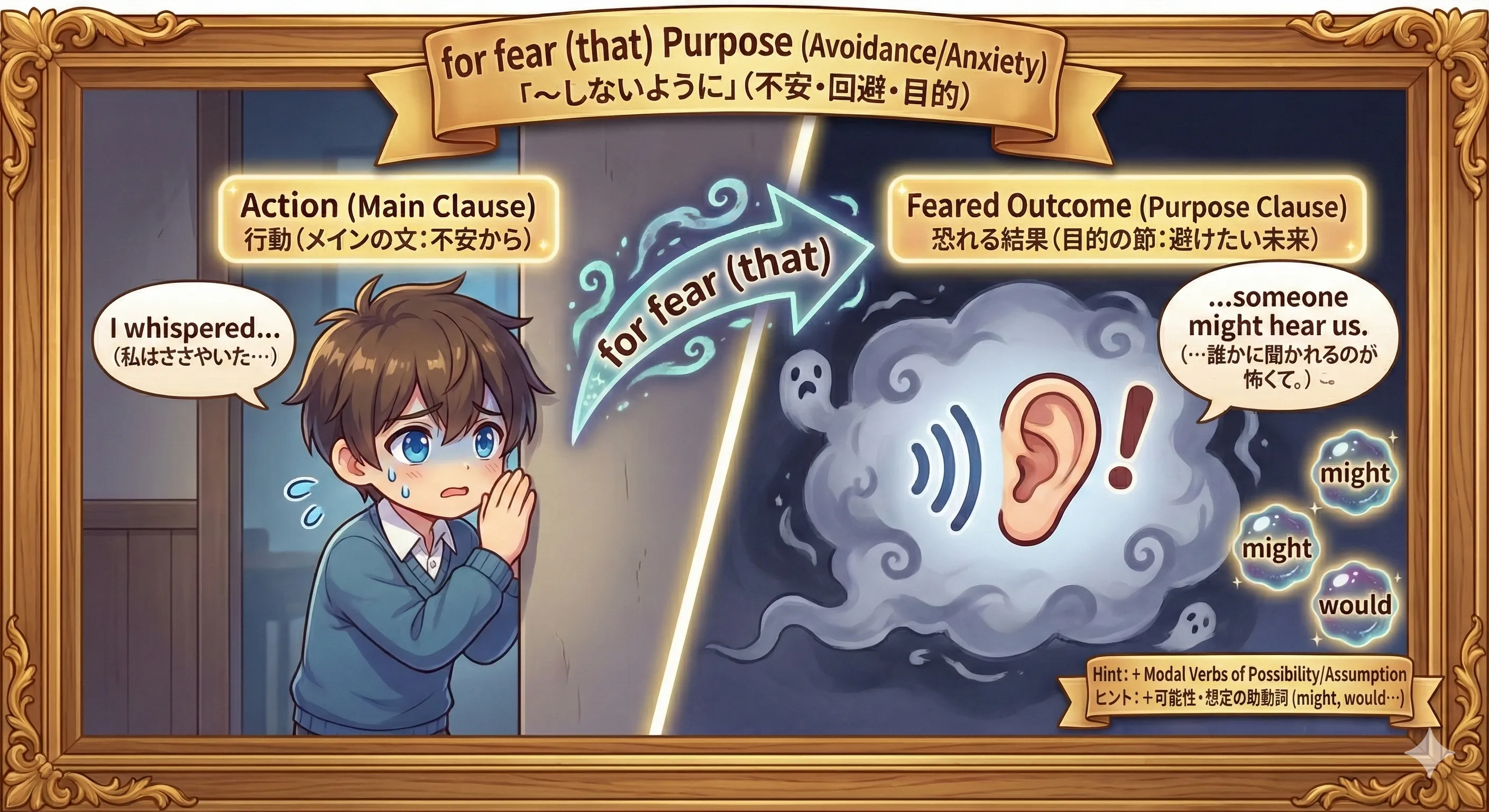
🧩 まずは型だけ先に!最重要
- ✅ that は省略OK(会話でも文章でもよく省略されます)
- ✅ not がなくても訳は「〜しないように」になりやすい
- ✅ might:起きたら嫌だな(可能性)/ would:そうなったら困る(想定)
for fear (that) は “恐れが理由で避ける” → 結果として「〜しないように」。
🎯 ニュアンスの核:「目的」+「不安」
💡 よく出るシーン例(文は後で例文カードで追加)
🔍 似てるけど違う!使い分け早見(目的・回避系)
| 表現 | コアの気持ち | こんなとき | 見分けワード |
|---|---|---|---|
回避
for fear (that)
|
😨 不安・恐れが動機(避けたい未来) | 「そうなったら困る/怖い」から行動を変える | 不安 / 恐れ |
目的
so that ... not
|
🎯 中立の目的(否定目的も可) | 「〜にならないように」=目的を淡々と言う | 目的 / 手段 |
備え
in case
|
🧯 念のため(保険) | 起きるか不明だけど、とりあえず準備する | 念のため |
硬め
lest
|
📘 やや文語・硬い「〜しないように」 | 文章・説明文・硬めの英文で出やすい | 文章 / 硬い |
for fear (that)。
念のためなら in case。
🧭 迷ったらこれ!2ステップ判断フロー
-
YES → for fear気持ちが「不安・恐れ」?起きたら嫌だ/困る/怖い → 行動を変える
-
YES → in case気持ちが「念のため(保険)」?起きるか不明だけど準備する
💬 例文で感覚をつかもう!(for fear (that):「〜しないように」)
I whispered for fear (that) someone might hear us.
(誰かに聞かれるのが怖くて、私はささやき声で話した。)
🔧 ポイント:for fear (that) + S + might で「起きたら嫌だな…」という不安を表現。
✅ not がなくても 日本語は自然に「〜しないように」になります。
I saved the file twice for fear (that) I might lose it.
(失くすのが怖くて、私はファイルを2回保存した。)
💡 「念のため」っぽく見えても、気持ちが “怖いから” なら for fear がハマります。
🧠 学習ヒント:感情(不安)を見抜けると、英文のニュアンスが一気に読めるようになります。
She avoided eye contact for fear (that) he would notice her feelings.
(彼に気持ちがバレるのが怖くて、彼女は目を合わせるのを避けた。)
🔧 would は「そうなったら困る(想定)」のニュアンス。未来の嫌な結果を想像しています。
✅ 目的節でも、感情が強いと for fear が自然です。
I didn’t bring it up for fear (that) it would start an argument.
(口論になりそうで怖かったので、その話題を出さなかった。)
🗣️ 「話題を出さない」も立派な“行動”。避けたい結果があるときに for fear が効きます。
⚠️ not がなくても「口論にならないように」という意味になります。
I double-checked the address for fear (that) the package might go to the wrong place.
(荷物が違う場所に届くのが怖くて、住所を念入りに確認した。)
📦 ここは「念のため」にも近いですが、文章が強調しているのは “起きたら嫌だ” という不安です。
🧠 継続のコツ:小さな正確さの積み重ねが、英語力の大きな伸びにつながります。
I couldn’t text you for fear (that) you might think I was too eager.
(ガツガツしてると思われそうで怖くて、あなたに連絡できなかった。)
💘 恋愛は “怖さ” が行動を止めがち。だから for fear がリアルに刺さります。
🌟 学習モチベUP:感情が乗った例文ほど覚えやすい。覚えやすさは才能じゃなくて「設計」です。
He spoke quietly for fear anyone might recognize him.
(誰かに気づかれそうで怖くて、彼は小声で話した。)
✅ that がなくてもOK。for fear + S + might でも自然です。
🔎 読解のコツ:for fear を見たら「避けたい未来」を探すと理解が速いです。
🧾 例文で見えた共通点
- for fear は「不安が動機」→ 行動を変える(言わない/確認する/小声にする)。
- not なしでも「〜しないように」になることが多い。
- might は「起きたら嫌だな」/ would は「そうなったら困る(想定)」。
⚠️ よくあるミス(先に潰して伸びる!)
否定語がなくても否定目的になりやすい、ここが最大のポイントです。
「恐れのために」→「恐れて(そうならないように)」というイメージで固定しましょう。
✅ ミニチェック(使い分けだけでOK)
🧾 1分まとめ(ここだけ復習でもOK)
-
✅
for fear (that)は 「〜しないように」 だが、動機は 不安・恐れ。 - ✅ 否定語がなくても否定目的になりやすい(ここが最大の特徴)。
- ✅ 迷ったら: 不安 → for fear 念のため → in case
5-4. in case:「~するといけないから」
in case は、直訳の「もし〜なら」よりも
「万一に備える(保険)」がコアです 🧯
✅ 日本語では「~するといけないから」と訳されやすいですが、気持ちは
“怖いから避ける”ではなく、
“起きるか不明でも先に準備する”。
✅ 時制(will を入れがち)と
if との混同が一番のつまずきポイントです。
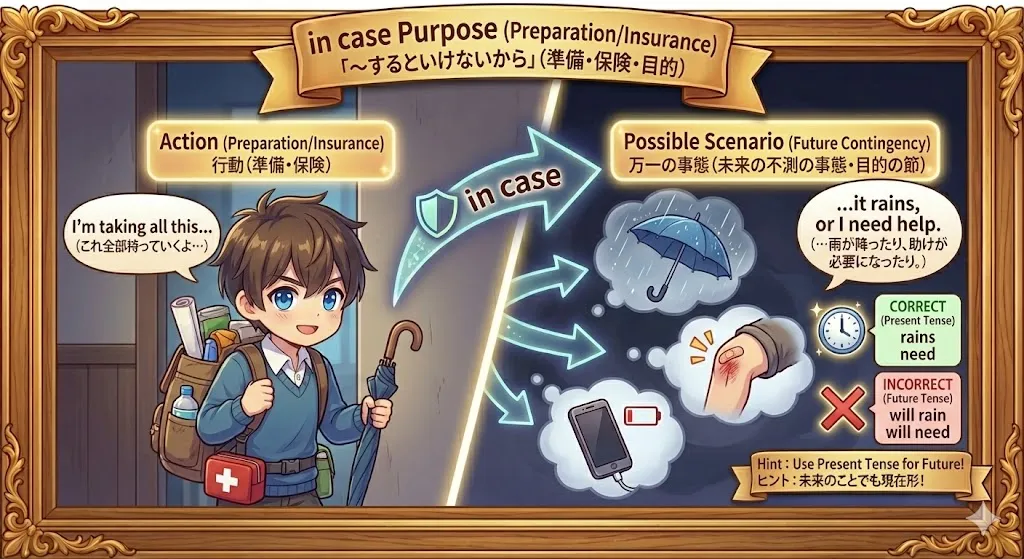
🧯 コアは「万一に備える」
in case
in case が自然になります。
🔍 似てる表現との違い(ここで迷いが消える)
if は「条件」。in case は「備え」。
発想が別物です。
⏱️ 形と時制:ここが得点ポイント(will を入れがち!)
| パターン | 意味の中心 | 時制の考え方 | 注意ポイント |
|---|---|---|---|
主節 + in case + S + V |
🧯 万一に備える(未来の可能性) | 現在形が基本 (「時・条件」と同じ感覚) | ⚠️ will を入れがち → まずは「現在形」をルール化 |
主節(過去) + in case + S + V(過去) |
🧳 そのときの“備え”(過去の準備) | 主節が過去なら、備えの想定も過去で整える | ✅ 読解で「過去の備え」を整理しやすい |
in case of + 名詞 |
🪧 「〜の場合に備えて」(名詞で短く) | 文ではなく名詞句でまとめる | ⚠️ 文にしない(S+V を置かない) |
in case + S + should + V |
📘 やや硬め・フォーマルな備え | 「万一〜するようなことがあれば」 | ✅ 文章で見たら「備え」だと気づければOK |
🧭 迷ったらこれ!3ステップ判断フロー
-
YES → in case主節が「準備・確認・保管」っぽい?持つ/控える/チェックする/バックアップする…
-
YES → for fear主節が「避ける・言わない・隠す」っぽい?怖くて回避する(感情が動機)
-
YES → if「条件」そのものを言いたい?成立したら起こる(備えではない)
💬 例文で感覚をつかもう!(in case:「~するといけないから」)
I'll take an umbrella in case it rains.
(雨が降るといけないから、傘を持っていくね。)
🔧 ポイント:未来の話でも in case 節は現在形 が基本(rains)。
⚠️ よくある誤り:× in case it will rain(まずは現在形で固定!)
Write down my number in case you need it later.
(あとで必要になるといけないから、私の番号をメモしておいてね。)
📝 主節が「準備・確保」っぽい動詞(write down / keep / save)だと in case が超自然。
✅ 「条件」というより 保険(万一) の発想です。
I charged my phone in case I got lost.
(迷うといけないから、私はスマホを充電しておいた。)
⏱️ 主節が過去(charged)なら、備えの想定も過去(got)でそろえるとスッキリ。
✅ 読解のコツ:過去形が出たら「そのときの備え」として整理すると迷いません。
Keep a copy of the receipt in case there is a problem.
(問題が起きるといけないから、レシートの控えを保管しておいて。)
💼 「保管する・控えを取る」=まさに 保険。だから in case が強いです。
🔎 ここは if よりも「起きるか分からないけど備える」の空気が自然。
I’ll email you the details in case you don’t receive the message.
(メッセージが届かないといけないから、詳細をメールでも送るね。)
✅ in case 節は「万一の状況」を表すので、否定(don’t receive)も自然に入ります。
💡 主節が「追加で送る」=二重に備える発想。まさに in case。
I saved your photo in case I missed you.
(会えなくて寂しくなったときのために、あなたの写真を保存しておいた。)
💘 これは「怖くて回避」ではなく、「寂しくなったときのための保険」。
🌟 学習モチベUP:感情が入った例文ほど記憶に残る。覚えやすさは「センス」より「設計」です。
Keep calm in case of an emergency.
(緊急事態のときに備えて、落ち着いて行動してください。)
✅ in case of の後ろは 名詞(ここでは an emergency)。
⚠️ 文(S+V)にしたいときは in case + S + V に切り替えましょう。
🧾 例文で見えた共通点
-
🧯
in caseは「万一に備える」=主節は 準備・確認・保管 系が多い。 -
⏱️ 未来の話でも in case 節は現在形が基本(
rainsなど)。 -
🧩
in case of + 名詞は名詞で短く言える(文にしたいならin case + S + V)。
⚠️ よくあるミス(先回りで一気に伸びる!)
if は「条件」。in case は「備え(保険)」。
in case の可能性が高いです。
in case + S + V に寄せる、という発想で分けましょう。
in case は「原因」ではなく「備え」。
✅ ミニチェック(“意味当て”より“分類”が強い)
in case が正解になりやすい。
for fear が本命。
🧾 1分まとめ(ここだけでも復習OK)
-
🧯
in caseは 万一に備える(保険)。 「~するといけないから」=恐れより 準備 が中心。 - ⏱️ つまずきポイント:in case 節に will を入れがち → まずは「現在形」をルール化。
- 🔍 使い分け:備え → in case 不安で回避 → for fear 条件 → if
5-5. lest:「~しないように」
lest は「~しないように」を表す 否定目的ですが、
最大の特徴は 会話より“文章・注意書き”で出やすいことです 📘
✅ 形は 主節(注意・忠告) + lest + S + (should) + V が定番。
✅ lest 自体が「否定」を含むので、
基本は not を入れません(見たら「そういうもの」としてOK)。
✅ unless と混同しやすいので注意(意味が別物)。
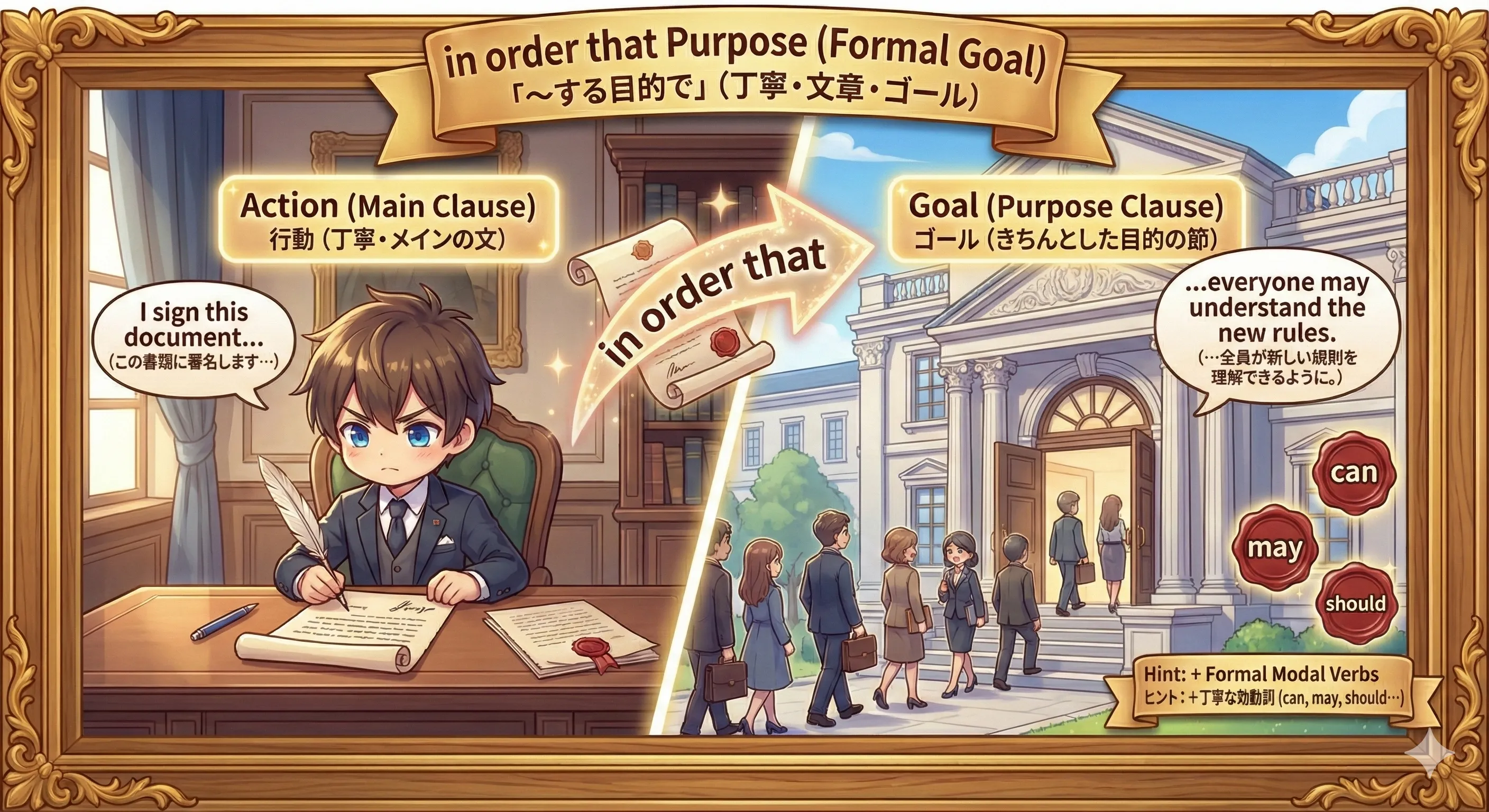
⚠️ コアは「注意・忠告の文体」
lest
lest が出やすいです。
🧩 型を先に固定(ここが得点源)
(もし
lest ... not を見かけたら「古め/強調」として“そういう形もある”でOK)
🔍 似てる「~しないように」:どれを選ぶ?(完成版)
| 表現 | 中心の発想 | 出やすい場面 | 見分けポイント |
|---|---|---|---|
文語
lest
|
⚠️ 注意・忠告の“否定目的” | 手順書/注意書き/説明文/やや硬い文章 | should とセット 会話ではレア |
不安
for fear (that)
|
😨 恐れが動機 → 回避 | 言わない/隠す/避ける(感情が中心) | 怖いから |
備え
in case
|
🧯 万一に備える → 準備 | 持つ/控える/確認する(合理的な保険) | 念のため |
中立
so that ... not
|
🎯 中立の否定目的 | 目的を淡々と説明(会話でも文章でも) | 目的 |
lest が本命です。
🧭 迷ったらこれ!3ステップ判断フロー
-
YES → lest文が「注意書き/手順/忠告」っぽい?(硬いトーン)説明文・規則・取扱い注意・手順書の空気
-
YES → for fear感情が「怖い・不安」?(回避が中心)言わない/避ける/隠す などの回避行動
-
YES → in case合理的に「念のため」準備してる?持つ/控える/確認する などの準備行動
💬 例文で感覚をつかもう!(lest:「~しないように」)
Be careful lest you should slip.
(滑るといけないので、気をつけてください。)
🔧 ポイント:Be careful などの「注意・忠告」+ lest は王道の組み合わせ。
✅ lest 自体が否定目的なので、not は基本不要。
Take care lest you forget your passport.
(パスポートを忘れないように気をつけてください。)
✅ should がなくてもOK。読解では「硬い注意文」として出やすい形です。
🧠 コツ:lest を見たら 避けたい悪い結果 を探すと理解が速いです。
Speak softly lest you should wake the baby.
(赤ちゃんを起こさないように、小さな声で話してください。)
🗣️ 主節が命令(〜しなさい)でも lest は自然に続きます。
📘 文体は硬めですが、意味はシンプルに「〜しないように」です。
Keep a backup copy lest the data be lost.
(データが失われないように、バックアップの控えを保管してください。)
💾 手順書・規則文の空気が強い例。lest はこういう文章で出やすいです。
✅ 覚え方:“注意書きっぽい硬さ” を感じたら lest。
Make sure the door is locked lest anyone enter.
(誰かが入ってこないように、ドアに鍵がかかっているか確認してください。)
🔒 主節が「確認する(make sure)」=注意・手順の空気が強く、lest と相性◎
⚠️ 「条件」ではなく「否定目的」なので、unless と混同しないようにしましょう。
I kept my feelings to myself lest you should feel pressured.
(あなたに重いと思われないように、気持ちは胸の中にしまっておいた。)
💘 恋愛でも「相手に負担をかけないように」という “配慮の注意” に寄ると lest の硬さが活きます。
🌟 学習モチベUP:硬い表現を1つ理解するだけで、読解の世界が広がる。積み上げは裏切りません。
He spoke slowly lest anyone misunderstand him.
(誤解されないように、彼はゆっくり話した。)
🔎 読解のコツ:lest を見たら「避けたい結果(misunderstand)」がどれかを探す。
✅ 会話より文章寄り。見た瞬間に意味が取れれば十分です。
🧾 例文で見えた共通点
-
📘
lestは「注意・忠告・手順」の空気が強い英文(文章寄り)で出やすい。 -
🧩 定番:
lest + S + (should) + V。not は基本いらない。 - 🔍 見分け:硬い注意文 → lest 不安で回避 → for fear 備え → in case
⚠️ よくあるミス(先回りで一気に安定!)
unless は「もし〜でなければ」(条件)。lest は「〜しないように」(否定目的)。lest は硬め・文語寄り。会話では so that ... not や in case の方が自然な場面が多いです。
lest 自体が「否定目的」を含むので、基本は not なしでOK。
lest ... not を見かけたら「古め/強調」として“そういう形もある”でOKです。
for fear は「不安(感情)」、in case は「備え(保険)」が鍵。
✅ ミニチェック(分類できれば勝ち!)
unless は条件、lest は否定目的。混同注意!
🧾 1分まとめ(ここだけ復習でもOK)
-
📘
lestは 否定目的「~しないように」。 ただし 文章・注意書き寄りで出やすい。 -
🧩 定番:
主節(注意・忠告) + lest + S + (should) + V - ⚠️ 重要:unless と混同しない(条件 vs 否定目的) / not を基本入れない。
6. 結果を表す(so ... that / such ... that)
ここでは so ... that と such ... that を使って、
「とても〜なので、結果として…」 をスッキリ言えるようになります ⚡
強調(大事なところを目立たせること)の語順も登場します。
ここは詳しい解説に入る前の「入口」です。まずは 全体像(ぜんたいの地図) をつかむのが目標です😊
ちなみに「結果(あとで起きること)」「原因(先にある理由)」のイメージがあると理解が早いです。 (むずかしく感じたら「理由 → そのあと起きたこと」と考えればOK)
結果表現 × 強調 概観セクション Lesson 109 / Section 6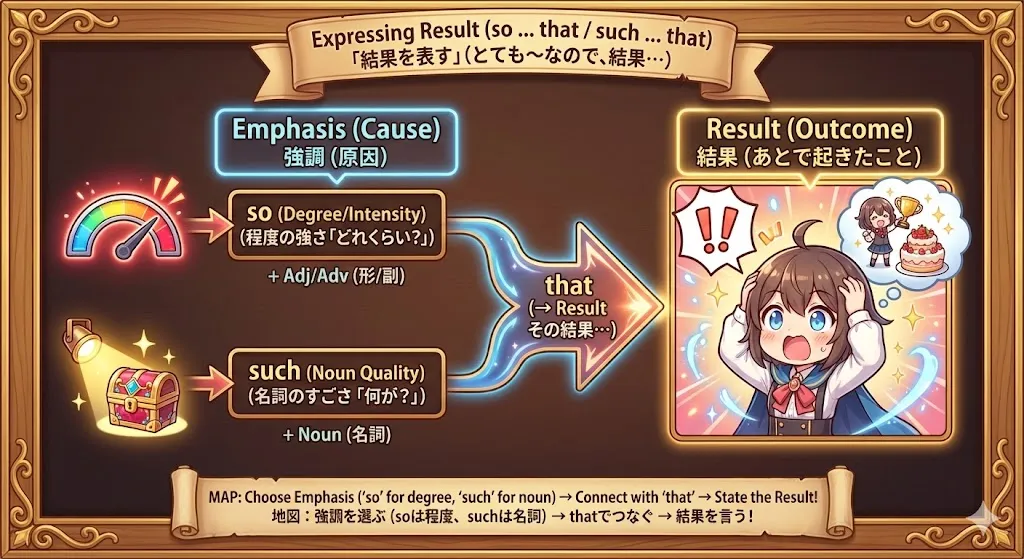
⚡ so は「どれくらい?」(程度の強さ)、such は「何が?」(名詞のすごさ)。
どちらも 強調 → 結果 の流れで覚えるとラクになります。
🗺️ 次はどちらから読む? 6-1 ~ 6-2 へのナビゲーション
6-1 → 6-2 どちらからでもOKです。気になる方から進めましょう😊
「so は“程度(どれくらい)”」「such は“名詞(なにが)”」という
入口の合言葉だけ覚えれば、もう十分スタートできます。
🧠 学習心理メモ:人は「完璧に分かってから始める」よりも、 「だいたい分かった状態でまず使ってみる」 方が、記憶に残りやすく学習が続きやすいです。
6-1. so + (形/副) + that:「それで/そのため」
so は 「どれくらい?」(程度の強さ)をグッと強調し、
that 以下で 「その結果どうなった?」を言う形です ⚡
ここでは詳しい解説に入る前に、まず
「強調 → 結果」
の流れをざっくりつかみましょう😊
形容詞(ものの性質:big「大きい」など)、 副詞(動きの様子:quickly「速く」など) のどちらにも使えます。
「まず全体像 → 例文で慣れる」の順番で進めると、学習は続きやすくなります✨
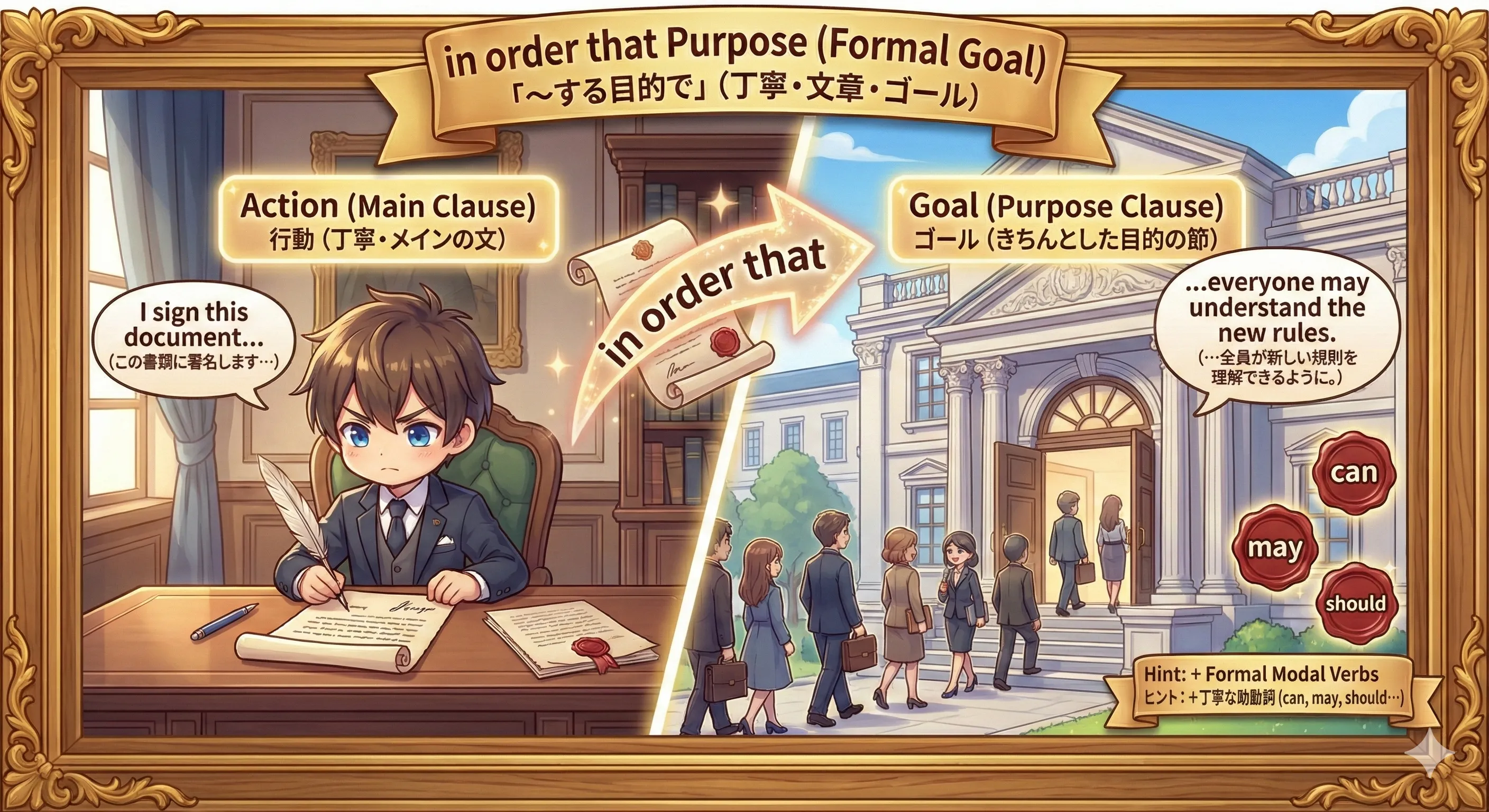
⚡ so で「どれくらい?」を強調 → that で「その結果」を言う、という流れです。
🧭
まずは30秒:so と that の役割
📋 型を先に固定(見た瞬間に意味が取れる)
| 型(パターン) | 主役 | 意味の流れ | ひとことメモ |
|---|---|---|---|
so + 形容詞 + that + S + V |
形容詞(性質) | 「とても〜なので」→「結果…」 | 🧠 まずはこれだけでOK(基本形) |
so + 副詞 + that + S + V |
副詞(様子) | 「とても〜に…したので」→「結果…」 | 🏃 動作の“すごさ”を強調するときに便利 |
so + 形容詞 + a/an + 名詞 + that ... |
名詞(やや硬め) | 「とても〜な名詞なので」→「結果…」 | ⚠️ a/an の位置に注意(文章寄り) |
so many/few + 複数名詞 + that ... |
数(可算) | 「(数が)とても多い/少ないので」→「結果…」 | 🔢 many/few は “数えられる名詞” に |
so much/little + 不可算名詞 + that ... |
量(不可算) | 「(量が)とても多い/少ないので」→「結果…」 | 🧪 much/little は “数えられない名詞” に |
⚠️
最大のつまずき:so ... that(結果)と so that(目的)
so + (形/副) + that ...
so that ...
📘 文章で出る“強調の語順”(倒置:語順を入れ替えて強調)
文章では、強調したい so + 形/副 を先頭に出して、
文の順番を少し入れ替えることがあります。
(倒置=語順を入れ替えて、目立たせること)
ここでは「見たら意味が取れる」を目標にしましょう😊
-
倒置
So + 形容詞 + be/助動詞 + S + V ... that ...(例:So tired was he that ...) -
通常
S + be/動詞 + so + 形/副 + that ...
💬 例文で感覚をつかもう!(so + (形/副) + that:「とても〜なので、結果…」)
He was so tired that he fell asleep.
(彼はとても疲れていたので、眠ってしまった。)
🧠 so=「どれくらい?」、that=「その結果どうなった?」のセット。
✅ まずはこの基本形が言えれば、6-1は半分クリアです!
She ran so quickly that I couldn't catch up.
(彼女はとても速く走ったので、私は追いつけなかった。)
🏃 副詞は「動きの様子」(quickly など)。動作の“すごさ”→結果、が作れます。
💡 主語+動詞のあとに so + 副詞 を置くと自然です。
It was so cold that my hands went numb.
(とても寒かったので、手がしびれてきた。)
🥶 “状態(cold)”が強い → “結果(went numb)”が起きた、という流れが一発で作れます。
✅ 6-1は「強さ → 結果」をつなぐ練習だと思えばOK。
He spoke so softly that I could barely hear him.
(彼がとても小声で話したので、私はほとんど聞こえなかった。)
🗣️ “話し方(softly)”の強さ → “聞こえない”という結果。副詞の例は会話で超使えます。
🌟 1つ言えるようになるたびに、表現力が確実に増えます!
I was so nervous that I forgot my lines.
(緊張しすぎて、セリフを忘れてしまった。)
😳 感情(nervous)→結果(forgot)で、理由と結果を一気にまとめられます。
✅ 「so + 形容詞」さえ押さえれば、感情表現が一気に増えます。
I was so happy that I couldn't stop smiling.
(うれしすぎて、笑顔が止まらなかった。)
💘 “気持ちの強さ(so happy)”がそのまま “行動の結果” につながる、超使える型です。
🚀 学習モチベUP:1つ定番が増えたら勝ち。使える例文は、あなたの自信になります。
So tired was he that he fell asleep on the train.
(彼はとても疲れていたので、電車で寝てしまった。)
📘 倒置(語順を入れ替えて強調):強調したい so tired を先頭に出した形。
✅ まずは「見たら意味が取れる」でOK。書けなくても大丈夫です。
🧾 例文で見えた共通点(6-1の勝ちパターン)
-
⚡
soは「強さ(程度)」、thatは「結果」。強調 → 結果の流れ。 - 🧩 so + 形容詞 と so + 副詞 をまず固定するとスムーズ。
- 📘 倒置は “文章で出る強調” として、見たら分かればOK。
✅ ミニチェック:これは「結果」?それとも「目的」?
🧾 1分まとめ(例文カードに入る前の準備)
-
⚡
so=程度(どれくらい?)/that=結果(どうなった?) - 🔍 見分け:so の後ろに形/副がいれば 結果(6-1)。 so の直後に thatなら 目的。
- 📘 文章では倒置(語順を入れ替えて強調)もあるが、まずは「見たら意味が取れる」でOK。
6-2. such + 名詞 + that:「非常に〜なので…」
such は 「名詞(人・物・こと)」を主役にして強調し、
that 以下で 「その結果」を言う形です 🎯
ポイントは 「名詞のすごさ → 結果」。
6-1 の so ... that(形容詞/副詞の強さ → 結果)との違いも、ここでスッキリ整理します。
名詞(人・物・ことの名前:movie「映画」など)を中心にするので、 a/an(1つの)の位置がつまずきポイントになりやすいです。 (でも型で覚えれば大丈夫!)
“名詞が主役なら such” という合言葉だけでも、読解がグッと楽になります✨

🎯 such で 名詞をドーン! と強調 → that で「その結果」を言う流れです。
🧠
まずは30秒:such と that の役割
such a good idea / such heavy rain
📋 型を先に固定(ここが最重要!)
| 型(パターン) | 名詞の種類 | ポイント | つまずき注意 |
|---|---|---|---|
such a/an (形) + 名詞 + that ... |
可算・単数(1つ) | 「とても〜な名詞(1つ)なので、結果…」 | ⚠️ a/an の位置がカギ |
such (形) + 複数名詞 + that ... |
可算・複数(2つ以上) | 「とても〜な名詞たちなので、結果…」 |
✅ 複数なら a/an は不要
|
such (形) + 不可算名詞 + that ... |
不可算(数えにくい) | 「とても〜な量・状態なので、結果…」 |
✅ 不可算にも a/an は基本不要
|
that が省略されることもあります。でも学習中は 「such + 名詞 + that」 を基本形として覚えるのが安心です。
🔍 6-1(so ... that)との使い分け:一瞬で判断するコツ
so。
so tired / so quickly
such。
such a good idea / such heavy rain
It was such a beautiful day that we went for a walk.
(散歩に行くほどの、とても気持ちいい日だった。)
The day was so beautiful that we went for a walk.
(その日はとても気持ちよかったので、散歩に行った。)
💬 例文で感覚をつかもう!(such + 名詞 + that:「名詞のすごさ → 結果」)
It was such a good idea that everyone agreed.
(みんなが賛成するほど、とても良いアイデアだった。)
🧠 いちばん大事:such a/an を“かたまり”で覚えるとミスが激減!
✅ 名詞(idea)が主役 → such が自然です。
She is such a kind person that everyone trusts her.
(彼女はみんなが信頼するほど、親切な人だ。)
👤 “人(person)”という名詞を主役にして「どれだけすごい人か」を言う形です。
💡 6-1との違い:形容詞だけなら so kind、名詞まで言うなら such a kind person。
It was such heavy rain that the game was canceled.
(試合が中止になるほどの大雨だった。)
🌧️ rain は基本「数えにくい名詞(不可算)」なので、a/an は付けません。
✅ 不可算名詞は such + 名詞 の形でスッキリ。
They gave me such helpful advice that I solved the problem.
(とても役に立つアドバイスをもらったので、問題を解決できた。)
💡 advice も不可算(基本は複数形にしない)なので、a/an は使いません。
🧠 「名詞が主役」→ such の出番!
We had such delicious food that we ordered dessert too.
(料理がとてもおいしかったので、デザートも頼んだ。)
🍰 food はまとめて言うときは不可算扱いになりやすく、a/an を付けずに言えます。
✅ 「名詞(food)のすごさ → 結果」の流れが分かればOK。
Such a long line formed that we decided to come back later.
(とても長い行列ができたので、あとで戻ることにした。)
📘 文では Such + 名詞 を先頭に出して強調する形もあります(見たら分かればOK)。
✅ まずは基本の It was such a ... that ... を優先で覚えましょう。
You are such a special person that I can't forget you.
(あなたは特別な人すぎて、忘れられない。)
💘 「名詞(person)」を主役にして “すごさ” を言えるのが such の強みです。
🚀 学習モチベUP:使える例文が1つ増えたら勝ち。積み上げた分だけ、表現はあなたの味方になります。
🧾 例文で見えた共通点(6-2の勝ちパターン)
-
🎯
suchは 名詞を主役にして強調 →thatで結果。 - ⚠️ 最重要:such a/an + (形) + 名詞(a/an の位置!)
-
🔁 使い分け:名詞が入るなら
such、形容詞/副詞だけならso(6-1)。
“名詞が主役なら such” を覚えた時点で、あなたは確実に前進しています✨
⚠️ よくあるミス(ここを先に潰すと一気に安定!)
such a/an + (形) + 名詞× 誤:
such + (形) + a/an + 名詞so:形容詞/副詞を強調(so happy / so fast)✅
such:名詞を強調(such a good idea)such が本命です。
such + 複数名詞(例:such people)✅ 不可算:
such + 不可算名詞(例:such rain)that は省略されることがありますが、意味は同じです。✅ 学習中は 省略なしの基本形で慣れるのが安心です。
✅ ミニチェック(判断だけでOK!)
🧾 1分まとめ(例文カードに入る前の準備)
-
🎯
such + 名詞 + thatは 名詞のすごさ → 結果。 - ⚠️ 最重要:such a/an + (形) + 名詞(a/an の位置!)
- 🔁 使い分け:名詞が主役なら such/形容詞・副詞が主役なら so。
7. 譲歩を表す(though / although / even if ...)
このセクションは「〜だけれども」と言うための“逆風フレーズ”をまとめて整理します 🌀
though / although / even if / even though などを使うと、
反対の条件(うまくいかない理由)を先に置いても、
主節(結論)はちゃんと成立させられます。
ここでは詳しい説明に入る前に、まず「譲歩ってこういう役割なんだ」を
ざっくりイメージでつかみましょう😊
「譲歩(ゆずる・でも進む)」は、 (“条件が悪くても、結論は変えない” という考え方) だと思うと分かりやすいです。
接続詞 × 逆接 概観セクション Lesson 109 / Section 7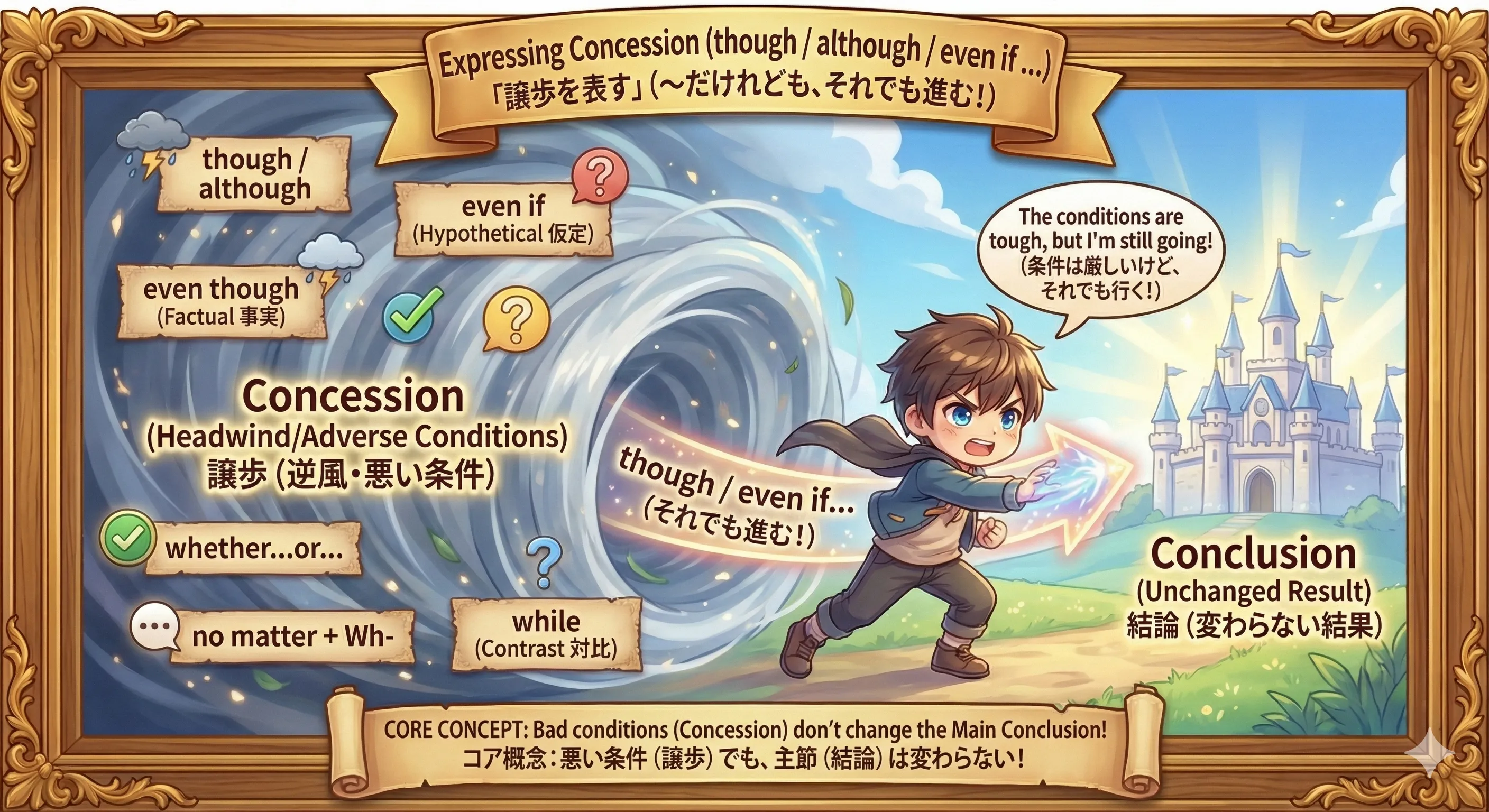
🌀 譲歩は 「条件は悪いけど、結論は変えない」 の発想。
though / even if などで“逆風”を置いても、主節(結論)はちゃんと進められます。
🧭 次はどちらから読む? 7-1 ~ 7-8 へのナビゲーション
7-1〜7-8は、どこから読んでもOKです😊
「よく見る順番」で言うなら、
まず though/although(基本) →
even if(仮定)→ even though(事実)
がスムーズです。気になるものから進めてください。
- even though 事実(ほんとうに〜なのに)
- even if 仮定(たとえ〜だとしても)
- while(譲歩) 対比(Aなのに一方でB)
🧠 学習心理メモ:人は「完璧に分かってから始める」よりも、 「だいたい分かった状態でまず使ってみる」 方が、記憶に残りやすく学習が続きやすいです。
7-1. though / although:「〜だけど」
though / although は、どちらも 「〜だけど」 を表す逆接です🌀
先に “逆風” を置いても、主節(結論)はちゃんと成立させられます。
ここではまず「意味」と「置き場所」を整理して、例文にスムーズに入る準備をします😊
譲歩(ゆずる=条件が悪くても、結論は変えない)の感覚がつかめると、 英文がグッと読みやすくなります。
「ざっくり理解 → 例文で確認」の順に進めると、学習は続きやすくなります✨

🌀 though / although は
「条件は悪いけど、結論は変えない」 の逆接。
先に“逆風”を置いても、主節(結論)はしっかり前に進められます。
🎭 まず結論:意味はほぼ同じ。でも“キャラ”が違う
📍 置き場所で覚える(ここが一番ラク!)
| 置き場所 | 使える語 | イメージ | ポイント |
|---|---|---|---|
| 文頭 | though although | “逆風”を先に置いてから結論へ | 🌀 先に状況→あとで結論 |
| 文中 | though although | 結論の途中に「逆風」を差し込む | 📄 文章っぽくまとまりやすい |
| 文末 | though (ほぼ専用) | 「…でもね」「とはいえね」を付け足す | 🗣️ 会話っぽさが出る(軽い追記) |
🧯
but との違い:どっちを使うべき?
A, but B.
Although A, B.
×
Although it was late, but I kept working.(混ぜない)○
Although it was late, I kept working.
💬 例文で感覚をつかもう!(though / although:「〜だけど」)
Though it was raining, we went out.
(雨が降っていたけど、私たちは出かけた。)
🌀 文頭に“逆風”を置いてから結論へ。これが譲歩の王道パターンです。
✅ 「条件は悪いけど、結論は進む」イメージでOK!
Although it was late, I kept working.
(遅かったけど、私は作業を続けた。)
📄 although は少しかためで、説明文や文章でも自然です。
⚠️ although と but は同時に使わない(二重逆接)!
We went out, though it was raining.
(雨が降っていたけど、私たちは出かけた。)
🧩 先に結論を言って、あとから“逆風”を添える形。会話でも文章でも使えます。
✅ 「言いたいのは結論!」というときに便利。
It was difficult, but I tried my best.
(難しかった。でも、私はベストを尽くした。)
🧯 but は A と B を “つなぐ” 感覚。短くハッキリ言えます。
🔁 次の例(although)と見比べると、違いがスッと入ります。
Although it was difficult, I tried my best.
(難しかったけど、私はベストを尽くした。)
🌀 “逆風(難しかった)”を先に置いても、結論(頑張った)はしっかり成立。
✅ 文章として整った印象になりやすいのが although の良さです。
I don't like waking up early. I do it, though.
(早起きは好きじゃない。でも、やってるんだよね。)
🗣️ 文末 though は「でもね」「とはいえね」の付け足し感。会話で超よく出ます。
✅ “軽い逆接”を出したいときの即戦力!
Though I'm busy, I'll reply tonight.
(忙しいけど、今夜返信するよ。)
📩 「条件は悪いけど、結論(行動)はする」=譲歩の王道。
🚀 学習モチベUP:こういう“すぐ使える短文”が増えるほど、英語は一気に楽になります。
Though we're apart, I'm always with you.
(離れていても、いつもあなたのそばにいるよ。)
💘 “逆風(離れている)”を置いても、結論(気持ちは変わらない)を言えるのが譲歩の強み。
✅ こういう定番を1つ持つだけで、表現の幅がグッと広がります✨
🧾 例文で見えた共通点(7-1の勝ちパターン)
-
🌀
though / althoughは「逆風を置いても、結論は進める」=譲US - 🎭 キャラ:though(会話) / although(文章)(意味はほぼ同じ)
- 📍 位置:文頭・文中は両方OK。文末 though は会話で強い!
学習は「理解→例文→小さな成功」の積み上げ。今日の1歩が、確実にあなたの力になります✨
🧷 次の7-5(even though)につながる“ひとこと予告”
though / although が普通の「〜だけど」だとしたら、
even though は
「実際に〜なのに(強め)」 という強調版。
詳しくは 7-5 でスッキリ整理します😊
⚠️ よくあるミス3つ(ここを先に潰す!)
though / although の後ろは、基本
文(S + V) が来ます。まずは「後ろに文が来る」とだけ覚えればOKです😊
Although A, but B は混ぜない!どちらか1つで逆接は足ります。
✅
Although A, B か ✅ A, but B にしましょう。
though は「でもね」「とはいえね」みたいな
付け足しの感覚です。会話でよく出るので、見たら意味が取れるだけでも大きな前進です✨
✅ ミニチェック:今どっちが自然?
7-2. 形/副/名 + as:「〜だけれども」(倒置の譲歩)
7-2 は「〜だけど」を 文章っぽく、かっこよく言える形です📄✨
強調したい語(形容詞/副詞/名詞)を先頭に出してから、
as を使って「でも…」へつなげます。
倒置(語順を入れ替える)= (目立たせたい言葉を前に出す)。
まずは “全体像” をつかんでから例文に入ればOKです😊
※この as は「〜として」ではなく、
「〜だけれども」 の as です(ここが最初の分かれ道!)🧭
学習は 「ざっくり理解 → 例文で確認」 がいちばん続きやすいルートです✨
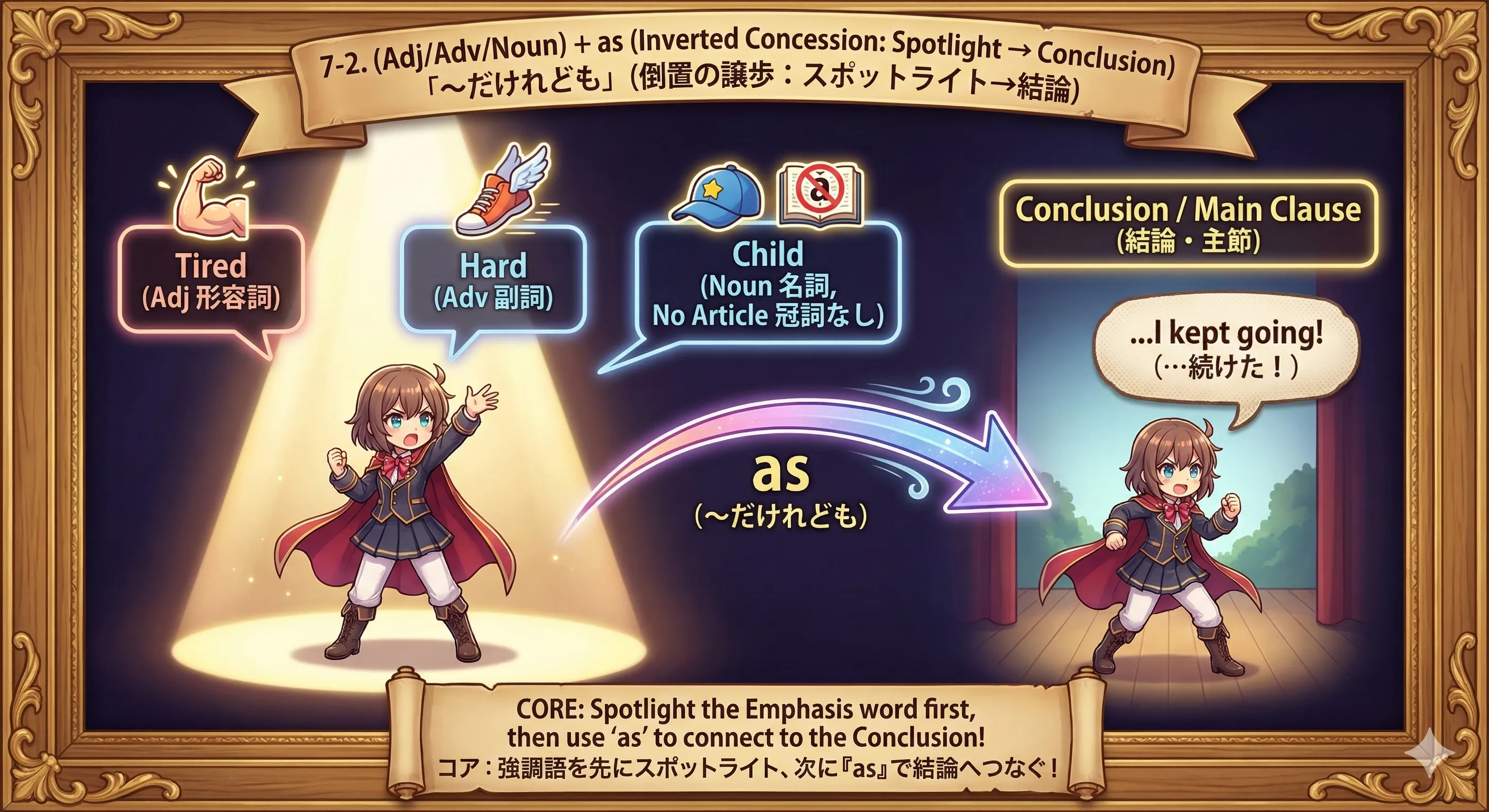
🔦 強調したい言葉を 先頭にドン! →
as で「でも…」→ 主節(結論)へ進む流れです。
🔦 倒置(語順を入れ替える)=スポットライト
as は 「〜だけれども」
📌 型を先に固定(形容詞 / 副詞 / 名詞 の3パターン)
| パターン | 型(基本形) | ポイント(やさしい説明) |
|---|---|---|
| 形容詞 | Adj + as + S + V, 主節 ... |
「どれだけ〜な状態でも…」→結論へ |
| 副詞 | Adv + as + S + V, 主節 ... |
「どれだけ〜にしても…」→結論へ |
| 名詞 | N + as + S + V, 主節 ... |
「〜という立場/性質でも…」→結論へ(冠詞に注意⚠️) |
Tired as I was, I kept going.
(疲れていたけれど、私は続けた。)
Child as he is, he speaks politely.
(子どもだけれど、彼は丁寧に話す。)
⚠️ 名詞が前に出るとき:冠詞(a/an)が消えやすい
a child as he is
(つい a を置きたくなる)
Child as he is
(名詞 + as + S + V)
🆚 7-1(though / although)との違い:意味は近いけど“文章感”が違う
💬 例文で感覚をつかもう!(形/副/名 + as:「〜だけれども」)
Tired as I was, I kept going.
(疲れていたけれど、私は続けた。)
🔦 先頭の Tired がスポットライト(強調)! 「疲れてはいたが、それでも…」の文章表現です。
✅ though/although より “文章っぽい” 逆接になります📄
Busy as she is, she always helps others.
(忙しいのに、彼女はいつも人を助ける。)
🌀 “逆風(忙しい)” を先に強調してから、主節(助ける)へ進みます。
💡 まずは「形容詞が先頭に来たら倒置の譲歩かも」と気づければOK!
Hard as I tried, I couldn't solve it.
(どんなに頑張っても、それを解けなかった。)
🏋️♂️ Hard は「一生懸命に」という副詞の働き。 「どんなに〜しても」を文章っぽく言えます。
✅ 7-3(Try as I may)とは別枠。ここは 形/副/名 + as の型です。
Fast as he ran, he missed the bus.
(どんなに速く走っても、彼はバスに乗り遅れた。)
🚍 「速く走った」という努力(逆風)を強調しても、結論(乗り遅れた)は変わらない。
💡 “強調 → でも → 結論” の流れを意識するとスッと読めます。
Child as he is, he speaks politely.
(子どもだけれど、彼は丁寧に話す。)
⚠️ 名詞が前に出るときは 冠詞(a/an)なし が多いです。
✅ 「名詞が先頭+冠詞がない」=倒置の譲歩の目印になりやすい!
Student as he is, he teaches English online.
(学生だけれど、彼はオンラインで英語を教えている。)
🎓 「〜という立場でも」のニュアンス。名詞を先頭に出して “意外性” を作れます。
✅ 読解では、この形が出たら「でも〜」の合図だと思えばOK。
Young as she looks, she is actually forty.
(若く見えるけれど、実は40歳だ。)
🎭 “見た目” と “事実” のギャップを文章っぽく表現できます。
💡 actually(実は)を合わせると、意外性がより伝わります。
Far apart as we are, my feelings won't change.
(遠く離れていても、私の気持ちは変わらない。)
💘 “逆風(遠距離)” を先に強調しても、結論(気持ちは変わらない)を言えるのが譲歩の強み。
🚀 学習モチベUP:使える例文が1つ増えたら勝ち。積み上げた分だけ、表現はあなたの味方になります✨
🧾 例文で見えた共通点(7-2の勝ちパターン)
- 🔦 先頭の 形/副/名 が “強調(スポットライト)”
-
🌀 この
asは「〜として」ではなく 「〜だけれども」 - ⚠️ 名詞パターンは 冠詞なし が多い(目印!)
“読めた!”が増えるほど、長文もスルスル理解できるようになります✨
🧯 よくあるミス3つ(ここだけ先に注意!)
as は 「〜だけれども」 の as です。✅ 見分けのコツ:先頭に形/副/名が出ているなら譲歩の可能性大。
✅ 基本:
Child as he is のように、名詞を先頭に出したら “冠詞チェック”。
as + 形/副 + as(例:as tall as ...)譲歩:
形/副/名 + as(語順が逆!)✅ 先頭に “形/副/名” が来ていたら、倒置の譲歩を疑うと当たりやすいです🎯
✅ ミニチェック:これは倒置の譲歩っぽい?
7-3. V + as + S + may/will:「どんなに〜しても」
7-3 は、「努力しても結論は変わらない」を文章っぽく言える表現です💪🌀 動詞(V)を先頭に出して「どんなに〜しても」を強調し、 そのあと主節(結論)へ進みます。 倒置(語順を入れ替える=目立たせたい言葉を前に出す)の “動詞版” と考えるとラクです😊
※この as は「〜として」ではなく、
「〜だけれども/それでも」の as(譲歩)です🧭
学習は 「ざっくり理解 → 例文で確認」 の順がいちばん続きます✨

🔦 Try / Say / Search など “行動(V)” を先頭に出して強調 →
as + S + may/will で「それでも」→ 主節(結論)へ進みます。
🔦 全体像:倒置の“動詞版”=行動を先にドン!
7-3 は「行動(V)を先に出して、努力を強調」→「でも…」→「結論」という順番です。
📌 まずは型を固定(読めれば勝ち!)
V + as + S + may/will, 主節 ...
Try as I may, I can't solve it.
(どんなに頑張っても、それを解けない。)
🎛️
may / will の“ざっくり差”(深追いしないでOK)
例:Try as I may
may の定番を覚えるのが近道。
例:Search as you will
🆚 7-2 と 7-3 の線引き(混ざらないための最重要ポイント)
💬 例文で感覚をつかもう!(V + as + S + may/will)
Try as I may, I can't solve it.
(どんなに頑張っても、それを解けない。)
🔦 文頭の Try が「努力」を強調。
as + S + may は「どんなに〜しても」の合図です。
✅ まずはこの定番を丸ごと覚えると、読解が一気にラクになります📈
Say as you will, I won't change my mind.
(何と言おうと、私は考えを変えない。)
🗣️ 「言う」行動を先に出して強調。
will は少し強めで、「どう言おうとも」感が出ます。
✅ “結論は変わらない” が主節で来やすいのも特徴です🌀
Search as you will, you won't find the answer here.
(どんなに探しても、ここでは答えは見つからない。)
🔍 「探す」という行動を強調しても、結果は変わらない=譲歩の核心です。
💡 V(動詞)が先頭なら 7-3 の合図と思えばOK!
Call as I may, no one answers.
(どんなに電話しても、誰も出ない。)
📞 “行動(Call)” を先に出して、努力感を強調しています。
✅ 「やってみてもダメ」のニュアンスが自然に出ます。
Explain as I may, he doesn't understand.
(どんなに説明しても、彼は理解しない。)
🧠 「説明する」努力を強調 → それでも結論は変わらない、という流れ。
💡 主節は「変わらない結果」が来やすい(理解しない/見つからない etc.)
Object as you will, we must follow the rules.
(反対するにしても、私たちは規則に従わなければならない。)
🧷 「反対しても(それでも)」という強い譲歩。主節が “方針・義務” だと相性が良いです。
✅ 結論はブレない感じを作りやすい例文です。
Doubt as you may, I will prove it.
(疑うかもしれないけど、私はそれを証明する。)
🔥 相手の反応(疑う)を“逆風”として先に置いて、主節で強い意志(prove)を言えます。
🚀 学習モチベUP:こういう「逆風でも前に進む文」は、英語でもあなたの自信を強く見せられます✨
Love me as you may, my heart belongs to you.
(どんなに私を愛してくれても、私の心はあなたのものだ。)
💘 “相手の行動” を先に置いて強調し、主節で結論を言い切るスタイル。
✅ 文章表現としてはややドラマチックですが、型の練習にちょうど良いです✨
🧾 例文で見えた共通点(7-3の勝ちパターン)
- 🔦 文頭が 動詞(V)なら「努力・行動を強調」=7-3の合図
-
🌀
as + S + may/willは「どんなに〜しても(それでも)」のスイッチ -
🎛️
mayは定番で控えめ、willは少し強め(まずはこの感覚でOK)
「読める型」が増えるほど、長文でも迷子になりません。今日の積み上げが、確実に力になります✨
⚠️ よくあるミス3つ(ここだけ先に回避!)
as + 形/副 + as(例:as tall as ...)譲歩:
V + as + S + may/will(動詞が先頭!)✅ 文頭が Try など動詞なら 7-3 を疑うのが正解です。
✅ 「動詞が先頭+as+主語+may/will」=「どんなに〜しても」と反射で読めればOK!
Hard(副詞)が先頭なら 7-2(形/副/名 + as)側の発想。でも Try(動詞)が先頭なら 7-3(V + as ...)の発想です。
✅ 見分けは「先頭が動詞かどうか」でOKです🎯
✅ ミニチェック:これは「どんなに〜しても」?
- 文頭が Try / Say / Search など 動詞で始まる
-
そのあとに
as + 主語 + may/willが来る - 主節(結論)は「それでも変わらない」内容になりやすい
7-4. even if:「たとえ〜だとしても」(仮定の譲歩)
even if は「たとえ〜だとしても」=
起きるか分からない話(仮定)を置いても、
主節(結論)はブレない という表現です☁️🌀
仮定(本当には起きていない、想像の話)を使って、
「もし最悪でも、私はこうする!」という決意を言いやすくなります💪
✅ 合言葉: if = もし(未確定) + even = たとえ(強め) → 「たとえ〜でも(関係ない)」の強い版です🔥
まずは「仮定か事実か」を見分けられればOK。そこから一気に読解がラクになります✨

☁️ even if は「起きるか分からない逆風」を置いても、
結論は変えない ための表現です。
🌀 全体像:逆風(仮定)を置いても、結論はブレない
even if はその中でも 仮定(まだ起きていない想像) のタイプです☁️
📌 まずは型を固定(読めれば勝ち!)
even if + S + V, 主節 ...
Even if it rains, I will go.
(たとえ雨でも、私は行く。)
Even if I fail, I will try again.
(たとえ失敗しても、また挑戦する。)
🧭 使う場面を3つに分ける(ここが一番わかりやすい!)
I will / we must が来やすい
I'll prepare / I'll bring が合う
🆚 even if(仮定) vs even though(事実)=ここで迷わない!
「起きても主節は同じ」
「実際に〜なのに」
-
「それって本当に起きてる?」→ 起きてない/不明なら
even if -
「それって事実?」→ 事実なら
even though
💬 例文で感覚をつかもう!(even if:仮定の譲歩)
Even if it rains, I 'll go.
(たとえ雨でも、私は行く。)
☔ 雨が降るかは未確定(仮定)。それでも主節(行く)はブレない=even if の核心です。
✅ 主節が I will / I'll だと「決意」が出て、even if が自然になります。
Even if I 'm late, I 'll call you.
(たとえ遅れても、連絡するよ。)
📞 「遅れるかも」という未確定の逆風を置いても、主節(連絡する)は変えない。
✅ even if は “約束・方針” と相性がいい表現です。
Even if I fail, I 'll try again.
(たとえ失敗しても、また挑戦する。)
💪 「失敗するか」はまだ分からない(仮定)。でも主節は “再挑戦” と固定。
🚀 学習モチベUP:英語も同じ。失敗しても続けた人が、最後に伸びます✨
Even if you don't like it, you have to do it.
(たとえそれが好きじゃなくても、やらなければならない。)
📌 even if の主節は「方針・義務」と相性◎(結論がブレないから)。
✅ 逆風(好きじゃない)でも結論(やる)は同じ、がポイントです。
Even if it 's expensive, I 'll buy it.
(たとえ高くても、それを買う。)
💸 「高いかも」という未確定の条件でも、主節(買う)は変えない=even if。
✅ “条件が変わっても結論は同じ” を一文で言えるのが強みです。
Even if nobody believes me, I 'll prove it.
(たとえ誰も信じなくても、私はそれを証明する。)
🔥 “最悪条件” を置いても、主節は揺らがない。これが even if の強さです。
🚀 学習モチベUP:英語も同じ。周りがどうでも、続ける人が勝ちます✨
Even if you don't understand now, keep going.
(今は分からなくても、続けて。)
🌱 「今は分からないかも」という仮定でも、主節(続ける)は変えない。
✅ 学習は “理解→定着” ではなく、“触れる→慣れる→理解” の順で進みます✨
Even if we 're far apart, my feelings won't change.
(たとえ遠く離れていても、私の気持ちは変わらない。)
💘 “遠距離” という逆風(仮定)を置いても、主節(変わらない)はブレない。
✅ even if は「条件がどうでも、結論は同じ」をスマートに言えます✨
🧾 例文で見えた共通点(7-4の勝ちパターン)
-
☁️
even ifは 未確定(仮定) の逆風を置く -
📌 主節は 決意・方針 が来やすい(
I'll/won't/have to) -
🆚 事実なら
even though、未確定ならeven if(まずこれだけ!)
「仮定か事実か」を見分けられるようになった時点で、譲歩はもう得意分野になります✨
⚠️ よくあるミス3つ(先に回避!)
even if、事実(確定)なら even though。✅ 迷ったら「それって本当?」で判断しましょう。
✅ 例:
Even if it rains tomorrow, ...(OK)
even if の本体は 「結論は変えない」です。✅ 主節は
I will / I won't / we must のような “方針・決意” が相性◎
✅ ミニチェック:これは even if?
-
even ifの後ろが 未確定(まだ起きてない) - 主節が 決意・方針(I will / I won't / we must)
- 「起きても、結論は同じ」になっている
次の 7-5(even though)で「事実の譲歩」に進むと、さらに見分けが鋭くなります✨
7-5. even though:「実際に〜なのに」(事実の譲歩)
even though は「実際に〜なのに」=
もう分かっている事実(確定の情報)を先に置いて、
それでも主節(結論)が成立することを示す表現です📌🌀
事実(本当に起きている/確定している情報)を認めたうえで、
「それでもこうだ」と言えるので、文章でも会話でも説得力が出ます✨
✅ 合言葉: though = 〜なのに(事実) + even = それでも(強め) → 「実際に〜なのに(それでも)」🔥
まずは「事実か?仮定か?」が分かればOK。そこから譲歩は一気に得意になります✨

📌 even though は「事実(確定)」を置いても、
主節の結論が変わらないことを強く示します。
🌀 全体像:事実(確定情報)を置いても、それでも結論へ進む
even though は「現実の逆風を認めた上で、それでも言いたい結論を言う」形です。事実を先に出すので、主節の主張が強く・自然に聞こえます📣
even though が一気に自然になります✨
📌 まずは型を固定(読めれば勝ち!)
even though + S + V, 主節 ...
Even though it is raining, I am going out.
(実際に雨が降っているのに、出かける。)
Even though he was tired, he kept working.
(疲れていたのに、彼は作業を続けた。)
🧭 使う場面を3つに分ける(現実のギャップを言うのが得意)
🆚 even if(仮定) vs even though(事実)=1秒で判断!
| 表現 | タイプ | 判断ポイント |
|---|---|---|
even ifたとえ〜だとしても
|
☁️ 仮定(未確定) | 「それ、本当に起きる?」→ まだ分からない |
even though実際に〜なのに
|
📌 事実(確定) | 「それ、起きてる?」→ もう起きてる |
- 「それって本当?」→ YES なら even though
- 「まだ分からない?」→ YES なら even if
💬 例文で感覚をつかもう!(even though:事実の譲歩)
Even though it 's raining, I 'm going out.
(実際に雨が降っているのに、出かける。)
☔ 雨が降っているのは事実。それでも「出かける」=ギャップが主役です。
✅ even though は「現実を認めた上での主張」に強い表現です📌
Even though he was tired, he kept working.
(疲れていたのに、彼は作業を続けた。)
👏 つらい状況(事実)を出してから「それでも続けた」。尊敬・評価のニュアンスが出ます。
✅ 書き言葉でも会話でも、説明が“説得力ある感じ”になります✨
Even though I studied hard, I didn't pass the test.
(一生懸命勉強したのに、テストに合格しなかった。)
📚 「勉強した」は事実。でも結果は期待と違う=ギャップが強いので even though がハマります。
✅ 学習モチベUP:結果が出なくても、積み上げは必ず次に効きます。続けた人が伸びます✨
Even though she is young, she is very responsible.
(彼女は若いのに、とても責任感がある。)
🧩 「若い」は事実。でも評価は良い方向へ。even though は“意外な評価”にも強いです。
✅ 事実→評価(ギャップ)で、文章がスマートになります✨
Even though the train was delayed, we arrived on time.
(電車が遅れたのに、私たちは時間通りに着いた。)
🚃 遅れたのは事実。でも結果は「時間通り」=ギャップで even though が自然。
✅ 「普通なら遅れるはずなのに…」という“逆の結果”を作れます📌
Even though he apologized, I was still upset.
(彼は謝ったのに、私はまだ怒っていた。)
😤 「謝った」は事実。でも気持ちは変わらない=現実のギャップを言うのに最適です。
✅ 感情のズレ(それでも〜だ)にも even though がよく使われます。
Even though I was nervous, I spoke up.
(緊張していたのに、私は発言した。)
🗣️ 緊張は事実。でも行動(発言)は“それでも”。勇気・前進を表すのにも使えます。
🚀 学習モチベUP:完璧じゃなくても、行動した瞬間に伸びます。今のあなたがまさにそれです✨
Even though we argued, I still love you.
(ケンカしたのに、それでもあなたを愛してる。)
💘 ケンカしたのは事実。でも結論(愛してる)は変わらない=even though の王道ギャップ。
✅ still を入れると「それでも」がさらにハッキリします✨
🧾 例文で見えた共通点(7-5の勝ちパターン)
-
📌
even thoughの後ろは 事実(確定情報) - 🌀 主節は 意外な結果(それでも〜する/それでも〜だ)
-
🆚 未確定なら
even if、確定(現実)ならeven though(まずこれだけ!)
「事実/仮定」を見分けられるようになった時点で、譲歩は“読める文法”になっています✨
⚠️ よくあるミス3つ(先に回避!)
even though は 事実(確定情報)が前提です。✅ まだ起きていない/分からない話なら
even if を選びましょう。
・
though / although = 「〜だけど」・
even though = 「実際に〜なのに(強め)」✅ 仕上げは例文で自然に覚えるのが最短です。
even though は「ギャップ」が主役です。✅ 主節は「意外な結果」や「それでもやる」を置くと、表現が生きます(例:行く/続ける/成功した など)。
✅ ミニチェック:これは even though?
- 従属節が 事実(確定)っぽい(今の状況/過去の出来事など)
- 主節が 意外な結果(それでも〜する/それでも〜だ)
- 「現実の逆風を認めてから主張している」感じがある
even though は「強めのギャップ」を出しやすい、というのが違いです。
次は例文カードで、「事実なのに意外な結果」をスムーズに言える感覚を作りましょう✨
7-6. whether ... or ...:「AでもBでも」(選択肢をまとめる)
whether ... or ... は「AかBか」を並べて、
どっちでも結論は同じと整理する表現です🧠🧹
whether は (〜かどうか/どっちか)、
or は (それとも)。
つまり「AでもBでも(どっちでも)」が一文で言えます✨
✅ 合言葉: whether = どっち? + or = それとも → A/B を並べても結論は変わらない📌
「選択肢を並べるパーツだ!」と気づけた時点で、長文がグッと読みやすくなります✨
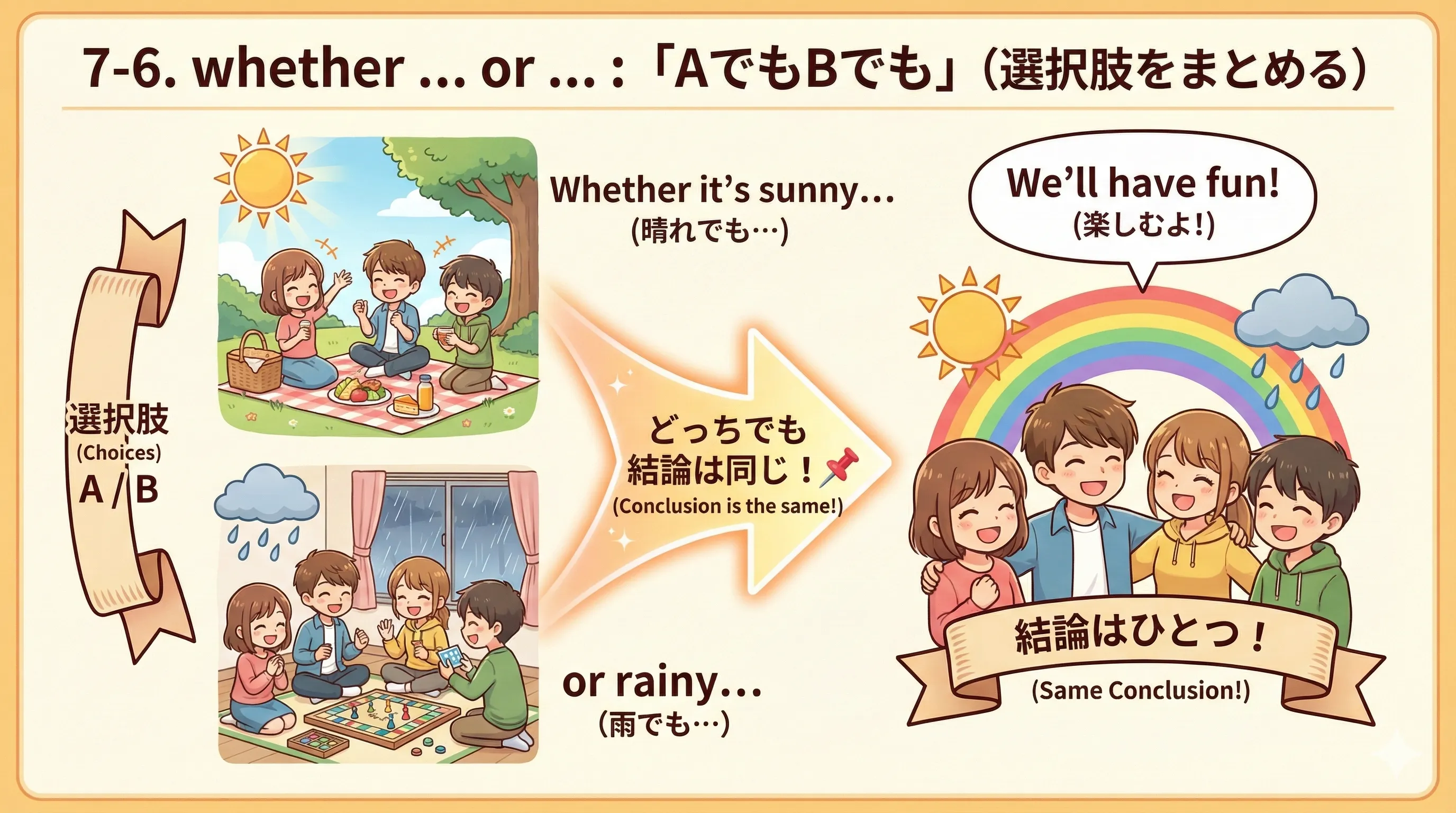
🧠 whether ... or ... は「A/B の分岐」を置いても、
結論をひとつに固定できる“整理の英語”です。
🧩 全体像:A/B を並べても、結論はひとつにまとまる
7-4 / 7-5 が「逆風(条件)」なら、7-6 は「分岐(A/B)」を整理する感じ🌿
A と B を並べる(どっち?)
📌 型(コア)を3つに整理(ここだけ押さえればOK)
Whether A or B, 主節
主節 whether A or B.
whether S V (or not)
Whether you like it or not, we start now.
(好きでも好きじゃなくても、今始める。)
I don't know whether he will come.
(彼が来るかどうか分からない。)
🧭 使う場面を3つに分ける(使いどころが一瞬で分かる)
🆚 似てる表現との違い(ここで混乱を止める!)
| 表現 | ざっくり意味 | 使いどころ(判断) |
|---|---|---|
| whether A or B | AでもBでも(どっちでも) | ✅ A/B を並べたいときに最強 |
| if | 〜かどうか(カジュアル) | ✅ 「〜かどうか」だけ言えればOKなとき(会話で多い) |
| no matter + 疑問詞 | 何が/誰が…でも(例外なし) | ✅ “二択” ではなく 例外なしを押し切る(7-7へ) |
💬 例文で感覚をつかもう!(whether ... or ...:AでもBでも)
Whether you like it or not, we start now.
(好きでも好きじゃなくても、今始める。)
🧠 whether A or B で「AでもBでも」。主節(結論)はブレません📌
✅ “方針・決定” を言い切るときに、すごく頼れる型です。
Whether we take the train or drive, we 'll arrive by noon.
(電車でも車でも、正午までに着くよ。)
🚆🚗 手段(A/B)が違っても、結論(到着時刻)は同じ=整理が一発でできます。
✅ 「どっちでも結果が同じ」をスッキリ言えるのが強み✨
I 'll support you, whether you win or lose.
(勝っても負けても、あなたを応援するよ。)
🎯 先に結論→あとで選択肢、の順なので会話で自然です。
✅ 文末型は「結論(主張)を強く見せたい」ときに便利!
Whether it is true or not, we need evidence.
(本当でも本当じゃなくても、私たちは証拠が必要だ。)
🧾 「真/偽」の二択を並べても、結論(証拠が必要)は同じ。
✅ 文章で “論理的にまとめる” ときに強い表現です。
Whether you agree or disagree, please be respectful.
(賛成でも反対でも、礼儀正しくしてください。)
🤝 A/B(賛成/反対)どちらでもOK。でも結論(礼儀)は固定。
✅ 仕事や説明の場面でも“角が立ちにくい”言い方になります。
We will hold the meeting, whether the boss attends or not.
(上司が出席してもしなくても、会議は行います。)
📅 「出席する/しない」の二択でも、結論(会議する)は同じ。
✅ 文末型にすると、主張(会議する)が前に出てスッキリします。
Whether you study for ten minutes or an hour, do it every day.
(10分でも1時間でも、毎日やろう。)
📈 時間(A/B)が違っても、結論(毎日やる)は固定。
🚀 学習心理:小さくても毎日続く方が、記憶に残りやすいです✨
I love you, whether we are together or apart.
(一緒にいても離れていても、あなたを愛してる。)
💘 状況(A/B)が変わっても、結論(愛してる)は変わらない。
✅ “どっちでも同じ” をやさしく強く伝えられるのが whether ... or ... です。
🧾 例文で見えた共通点(7-6の勝ちパターン)
- 🧠
whether A or Bは「A/B の選択肢」を並べて 結論をひとつに固定する - 📌 文頭型:
Whether A or B, 主節(文章で整理しやすい) - 🎯 文末型:
主節, whether A or B(会話で自然・主張が先に出る)
「選択肢を並べて、結論を固定する」感覚がつかめたら、長文でも迷いません✨
⚠️ よくあるミス3つ(先に回避!)
whether ... or ... は「A/B の 二択を並べる」のが得意。✅ A/B を並べて “どっちでも” を言いたいなら、迷わず
whether ... or ...。
or の後ろは “もう片方” が来ます。✅ A と B がちゃんと 対(ペア)になっているか確認しましょう。
whether が出たら「選択肢の列挙が始まる」と判断。✅ まず whether 〜 or 〜 をカッコで括って読んでから、主節へ進むと速いです👀
whether 〜 or 〜 を “ひとかたまり” で見る練習をすると、読む力が一気に伸びます✨
✅ ミニチェック:whether が出たらこう読む!
whetherを見たら「選択肢だ!」orを見たら「A/B セット完成!」- 主節を読んで「結論固定」を確認📌
“読めた” が増えるほど、英語はもっと楽になります📈✨
7-7. no matter + 疑問詞:「何が/誰が…でも」(例外なしの押し切り)
no matter + 疑問詞 は
「例外なし」を作る表現です💪
条件が何であっても、結論は変わらないという強い言い方になります。
ここでの「疑問詞」は、(なに?だれ?どこ?みたいな質問のことば)ですが、
この形では質問ではなく「全部まとめてOK」にするために使います😊
✅ 合言葉:no matter = 例外ゼロ + 疑問詞 = 条件の種類 → どんな条件でも結論固定📌
「no matter を見たら例外なし!」と気づけるだけで、英文の迷いが一気に減ります✨
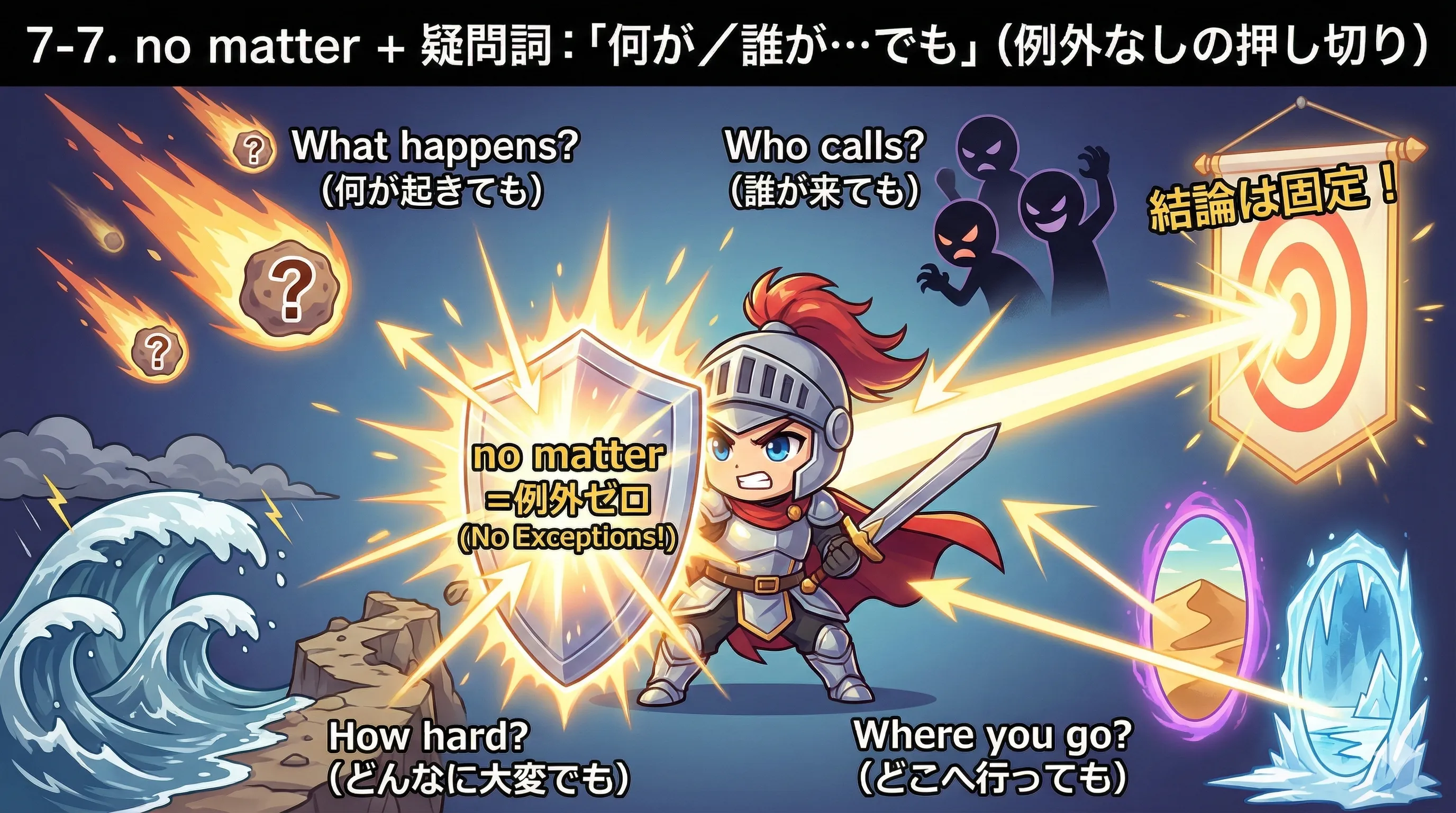
💥 no matter は「条件を全部まとめてOK(例外なし)」にして、主節の結論を押し切ります。
🌍 全体像:二択(7-6)より強い「無限まとめ」=例外なし
whether A or B:二択(A/B)を並べて結論固定。7-7
no matter + 疑問詞:条件が無限に広がっても結論固定(例外ゼロ)💥
📌 型(コア)を2つだけ固定(迷いを作らない!)
No matter + 疑問詞 + S + V, 主節
主節, no matter + 疑問詞 + S + V.
No matter what happens, I 'll help you.
(何が起きても、手伝うよ。)
I won't give up, no matter how hard it is.
(どんなに大変でも、あきらめない。)
📚 疑問詞ミニ辞書(1行で意味が分かる)
| 疑問詞 | 意味 | イメージ(やさしい言い換え) |
|---|---|---|
what |
何が/何を | 「何が起きても」=出来事ぜんぶ |
who |
誰が | 「誰が相手でも」=人ぜんぶ |
where |
どこで/どこへ | 「どこにいても」=場所ぜんぶ |
when |
いつ | 「いつでも」=時間ぜんぶ |
which |
どちらを(選択肢が見えている) | 「どれを選んでも」=候補の中で例外なし |
how |
どんなふうに/どれだけ | 「どんなに〜でも」=程度・方法ぜんぶ |
🆚 似てる表現との違い(混乱を先に止める)
| 表現 | ざっくり意味 | 違いのポイント |
|---|---|---|
| no matter what | 何があっても(例外なし) | 💥 条件を全部まとめて結論を押し切る(例外ゼロ) |
| whatever | 何でも(近い) | ✅ 近い意味。まずは no matter で固定すると安全(慣れたら追加) |
| even if | たとえ〜だとしても(仮定) | ☁️ 条件を1つ置くのが基本。no matter は全部まとめる |
| whether A or B | AでもBでも(二択) | 🧩 二択の整理。no matter は「無限でも例外なし」🌍 |
💬 例文で感覚をつかもう!(no matter + 疑問詞:例外なし)
No matter what happens, I 'll be there.
(何が起きても、私はそこに行くよ。)
💥 No matter what は「何があっても(例外なし)」を作ります。
✅ 主節は言い切り(約束)にすると、強さが出て自然です。
I will keep trying, no matter how hard it gets.
(どんなに大変になっても、挑戦し続ける。)
📈 how は「どれだけ」。程度(きつさ)が上がっても結論は固定。
✅ 文末型は「結論→例外なし条件」で会話でも自然です。
No matter who calls, tell them I'm busy.
(誰から電話が来ても、忙しいって伝えて。)
📞 who は「誰が」。相手が誰でも同じ対応=例外なし。
✅ ルール・対応を固定したいときに便利です。
I 'll find you, no matter where you go.
(どこへ行っても、君を見つける。)
🧭 where は場所。場所が変わっても結論(見つける)は固定。
✅ “強い意志” を表すときにも映えます✨
No matter when you arrive, call me.
(いつ着いても、電話してね。)
⏰ when は時間。時間がいつでも対応は同じ=例外なし。
✅ スケジュールが読めない場面で便利です。
No matter which one you choose, you 'll be fine.
(どれを選んでも、大丈夫だよ。)
🎁 which は「候補の中のどれ」。候補が複数でも結論は固定。
✅ 相手を安心させる“励まし表現”にも使えます😊
No matter how you do it, finish it today.
(どうやってでも、今日中に終わらせて。)
🛠️ 方法(how)が違ってもOK。ゴール(終わらせる)は固定。
✅ “結果を優先” する場面で強い表現です。
I love you, no matter what happens.
(何があっても、あなたを愛してる。)
💘 「何が起きても」=条件を全部まとめて、気持ちを固定する表現です。
✅ no matter は “ぶれない気持ち” を言うときにも映えます✨
🧾 例文で見えた共通点(7-7の勝ちパターン)
- 💥
no matterを見たら「例外なし!」(条件を全部まとめて押し切る) - 📚 その次の疑問詞で「条件の種類」が決まる(
what / who / where / when / which / how) - 📌 主節は 結論固定(言い切り)にすると強く自然
「no matter=例外なし」が定着したら、譲歩の読解力が一段上がります✨
⚠️ よくあるミス3つ(先に回避!)
no matter は「例外なし条件」を作るだけで、主節の結論を押し切ります💥
no matter は「結論を固定する」表現なので、主節は言い切りが映えます。✅ 例:I will / I won't / I decide / I keep など
✅ “例外なし” の芯を作ってから、余裕が出たら
whatever を追加すると迷いません。
今日のゴールは「例外なしと気づける」だけで十分です✨
✅ ミニチェック:no matter を見たらこう読む!
no matterを見たら「例外なし!」- 次の疑問詞で「条件の種類」を決める(what/who/where...)
- 主節で「結論固定(〜する/〜だ)」を確認📌
迷いが減る=学習が続く=結果が出る📈✨
7-8. while(譲歩):「~なのに/一方で」(対比の逆接)
while は「~している間(時間)」が有名ですが、
実はもう1つ大事な使い方があります⚡
それが 譲歩・対比の while です。
これは「時間」ではなく、AとBのちがいを並べて見せる表現。
対比=(ちがいをくらべること)です😊
✅ 合言葉: while(譲歩)=一方で → 「Aはこう。一方でBはこう。」と整理できる🧠✨
「while は時間だけじゃない」が分かった時点で、長文での迷いが減ります✨
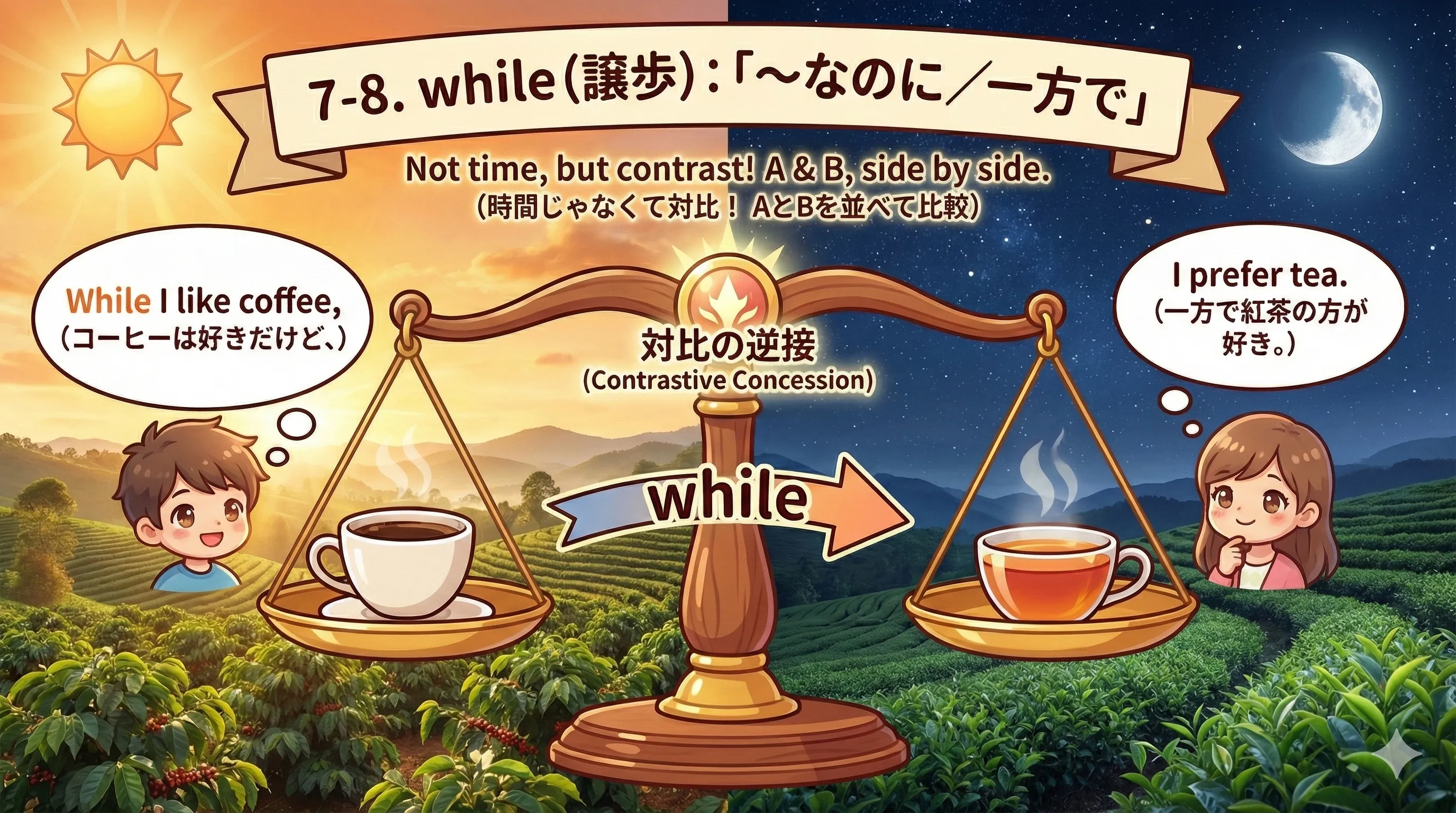
🌿 while(譲歩) は、時間ではなく「対比(ちがい)」を見せる表現です。
🌓 全体像:AとBを並べて「差」を見せる(対比の逆接)
while(譲歩) は「~なのに」よりも、
「一方で」がハマりやすい表現です。つまり「Aはこう。一方でBはこう。」と落ち着いて比較します😊
📌 型(コア)を2つだけ固定(迷いを作らない)
While S1 V1, S2 V2.
S2 V2, while S1 V1.
While I like coffee, I prefer tea.
(コーヒーは好きだけど、一方で紅茶の方が好き。)
I prefer tea, while I like coffee.
(紅茶の方が好き。コーヒーも好きだけどね。)
🧭 使う場面(3つ):「比較」「対照」「落ち着いた逆接」
🆚 似てる表現との違い(ここで混乱を止める!)
| 表現 | ざっくり意味 | ニュアンス(いつ使う?) |
|---|---|---|
| while(譲歩) | 一方で/〜なのに(対比) | 🌿 比較して見せる(上品・説明向き) |
| though / although | 〜だけど/〜なのに(逆接) | 🌀 逆風でも主節が成立(パンチ強め) |
| whereas | 一方で(より硬い) | 📄 論文・ビジネス文書っぽい硬さ |
| but | でも | 🗣️ 口語で直球。文章では while の方が整うことが多い |
💬 例文で感覚をつかもう!(while(譲歩):一方で/なのに=対比)
While I like coffee, I prefer tea.
(コーヒーは好きだけど、一方で紅茶の方が好き。)
🌿 while は「Aはこう。一方でBはこう。」の対比を作ります。
✅ ここは「時間の while」ではなく「比較の while」です。
I prefer tea, while I like coffee.
(紅茶の方が好き。コーヒーも好きだけどね。)
🗣️ 先に言いたい結論を置いて、while で比較情報を足すと自然です。
✅ 「対比の補足」っぽいニュアンスになります。
While this phone is cheap, it is not very durable.
(このスマホは安いけど、一方であまり丈夫ではない。)
📌 「メリット→デメリット」を落ち着いて並べたいとき、while が強いです。
✅ 文章が“レビューっぽく”整います。
While some people love winter, others prefer summer.
(冬が好きな人もいれば、一方で夏が好きな人もいる。)
🧊☀️ “Aの人もいる/Bの人もいる” の対比で、説明がやさしくなります。
✅ 対立ではなく「整理」になるのが while の良さ🌿
While I understand your point, I can't agree.
(あなたの言い分は理解しますが、一方で同意はできません。)
🤝 相手を立てつつ、意見の違いを落ち着いて伝えられます。
✅ but より “角が立ちにくい” のがポイント。
While the plan sounds good, it needs more time.
(その計画は良さそうだけど、一方で時間がもっと必要だ。)
🧩 「良い点」と「課題」を並べると、主張が論理的に見えます。
✅ レポート・会議で使いやすい対比表現です。
While I like you, I love you.
(好きでもあるけど、それ以上に愛してる。)
💘 like と love を対比して「気持ちの強さ」を強調できます。
✅ 対立ではなく“差”を見せるのが while のコツ🌿
While the sun was setting, we walked home.
(日が沈んでいる間、私たちは歩いて帰った。)
⏳ これは「対比」ではなく「同時進行」=時間の while です。
✅ 7-8 は “対比” がテーマ。まず判定できれば勝ちです✨
🧾 例文で見えた共通点(7-8の勝ちパターン)
- 🌿
while(譲歩)は「Aはこう。一方でBはこう。」の対比 - 🌀 though/although より “パンチ弱め” で、説明が上品になりやすい
- ⚠️ まず判定:時間(同時進行)か、対比(比較)か
while を「時間 / 対比」で見分けられると、長文が一気に読みやすくなります✨
⚠️ よくあるミス3つ(時間の while と混同しない!)
✅ 同時進行(時間)なら「〜している間」。
✅ ちがいの比較なら「一方で/なのに(対比)」です。
(対比=ちがいをくらべる)
✅ A/B が同じ観点で比べられているか(好み、特徴、結果など)を確認しましょう。
but は口語で直球。while は比較の雰囲気を出したいときに強いです。✅ 「上品に比較して見せたいなら while」を目印にすると迷いません🌿
while を 時間 / 対比 で分けられたあなたは、もう上級の入口です✨
✅ ミニチェック:while を見たらまず「時間?対比?」を判定
whileを見たら「時間?対比?」を考える- 同時進行なら「〜している間」
- 比較なら「一方で(対比)」に切り替える
そしてラクになるほど、自然に続きます📈✨
8. 条件を表す(if / unless / as long as ...)
このセクションは「もし〜なら」を作る条件表現の全体マップです🗺️✨ とくに大定番なのが、 条件節(条件を言う文のかたまり)は 未来の話でも現在形になりやすいというルール🔑 ここでは詳しい説明に入る前に、「まずはざっくりイメージをつかむ」ことを目標にしましょう。
使い分けの見どころは、
unless(否定条件=〜でない限り)、
in case(万が一=起こる確率が低め)、
providing / provided や on condition
(文語=かたい文章で条件を明示)など。
(「文脈」=前後の流れで意味が決まる)
も一緒に育てていきます😊
🎨 イメージでつかむ:条件表現の「地図」
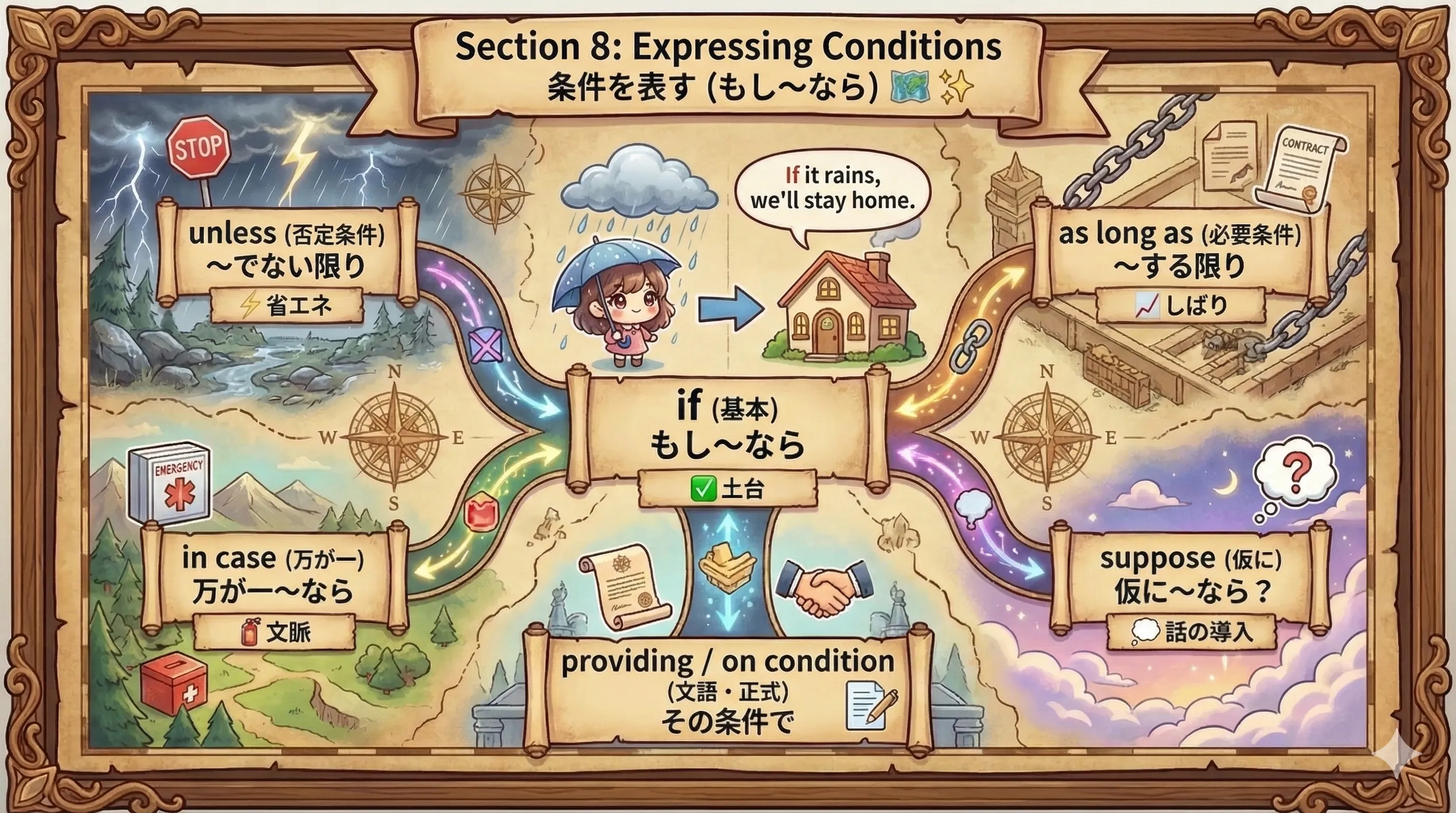
🧭 if(条件の基本)→ unless(否定条件)→ in case(万が一)→
as long as(必要条件)…という「役割の違い」を、先にざっくり見渡しておくと理解が速くなります。
🚪 8-1〜8-7は何を学ぶ?まずは全体像(気になる所からOK)
このパートは「入口」なので、細かい暗記はまだ不要です🙆♀️
「どれがどんな役割か」だけ先に見て、
自分が気になるカードから進めばOK。学習は気持ちが動いた順が続きます✨
If it rains, we'll stay home.
(もし雨なら、家にいます。☔🏠)
そして大事な励ましをひとつ😊
ここまで読めたあなたは、もう準備はバッチリです。
あとは「使い分けの地図」を手に入れて、少しずつ自分の言葉にしていきましょう🚀
人は「完璧に分かってから始める」よりも、 「だいたい分かった状態でまず動いてみる」方が、 記憶に残りやすく、続きやすいと言われます。
まずは入口で地図を持てた時点で大成功です🏆
8-1. if:条件の基本「もし〜なら」
if は、英語でいちばん基本の「条件」を作る合図です🔑
条件(if節)を言ってから、
結果(主節)を言う——この流れがすべての土台になります。
✅ まずは「節を先に置いても後ろに置いてもOK」を体に入れて、迷いをゼロにしましょう。
今日は ifの骨格 を手に入れればOKです。小さな達成が、いちばん強い燃料になります🔥

🔘 if は「条件スイッチ」。
条件が成立したら、主節(結果)へ進むイメージです。
🧩 まずは骨格:条件(if節)+結果(主節)
if + S + V ...
S + V ...
🔁 語順は2つだけ:前置き / 後置き
if + S + V ... , S + V ...
if で「条件が来るぞ!」と予告できるのが強み。
S + V ... if + S + V ...
ルールが短いほど、続けやすい(=勝ちやすい)です✨
🧾 1枚で整理:語順・カンマ・ニュアンス
| 並べ方 | 型(テンプレ) | カンマ | よくある場面 | 覚え方 |
|---|---|---|---|---|
| 前置き |
if + S + V ... , S + V ...
|
あり | 📘 説明・文章/手順の案内(読み手に親切) | 先に条件→区切って結論 |
| 後置き |
S + V ... if + S + V ...
|
基本なし | 🗣️ 会話/最後に条件をサッと追加 | まず言う→条件を足す |
🧠 主節は3タイプに広がる(ここが“使える感”)
If ... , S + will/can + V ...
If ... , please + V ... / let's + V ...
If ... , can I ... ? / should I ... ?
💬 例文で感覚をつかもう!(if 条件の基本)
If it rains, we'll stay home.
(もし雨なら、家にいます。☔🏠)
🔧 ポイント:If節が先頭のときは カンマ で区切ると読みやすい。
🧠 型:if + S + V ... , S + V ...
We'll stay home if it rains.
(雨なら、家にいます。☔🏠)
🗣️ 会話っぽい順番:まず結論を言って、あとから条件を追加。
🧠 型:S + V ... if + S + V ...
If you have time, please call me.
(時間があれば、電話してください。📞)
✨ 効果:条件を添えると、お願いがやわらかく聞こえる。
🧠 型:If ... , please + V ...
If you're free tonight, let's grab dinner.
(今夜ひまなら、ごはん行こう。🍽️)
💡 「条件+提案」は、誘い文句を自然にしてくれる。
🧠 型:If ... , let's + V ...
If it's okay, can I ask one question?
(大丈夫なら、1つ質問してもいいですか?🙋♂️)
🎈 「If it's okay, ...?」は、相手への配慮が伝わる定番の丁寧フレーズ。
🧠 型:If ... , can I ... ?
If you don't study, you'll forget it.
(勉強しないと、忘れます。🧠💨)
🧯 コツ:If + don't で「〜しないなら」。条件を否定にするだけでOK。
🚀 続けるコツ:小さくても毎日触れると、忘れにくくなる(積み上げが最強)✅
If you love me, tell me.
(もし私を愛しているなら、言って。💗)
💎 短い文ほど「型」が見える:If + S + V → V(命令)。
🔥 モチベ:覚えた型は“使った瞬間に自分の言葉”になる。今日の1文、口に出せたら勝ちです🏆
If you need any help, I'm here for you.
(もし助けが必要なら、私はあなたの味方だよ。🤝)
🌿 実用:仕事でも日常でも使える“安心させる”フレーズ。
🧠 型:If ... , S + be ...(状態・約束にも if が使える)
📌 覚える順番は「型 → 口に出す → もう1回」。短く回すほど、上達が加速します🚀
🧯 よくあるつまずき(ここだけ先に潰しておく)
will」と思いがちですが、if が作る条件節は現在形が基本になることが多いです。
※ここは Section 8 全体でしっかり回収します(今は“そうなりやすい”だけ覚えればOK)🔜
if は成立するかどうか、because は原因が確定。
“確定か/未確定か”で分けるとスッキリします。
失敗を減らす設計にすると、学習は“気合い”じゃなく“仕組み”で続きます😊
✅ ミニまとめ:8-1で覚えるのはここだけ
- if節=条件(もし〜なら) / 主節=結果・行動
- 語順は2つ:前置き と 後置き
- カンマ:if節が先頭ならカンマ/後ろなら基本なし
「理解→確認」の順は、記憶に残りやすい王道ルート✨
8-2. unless:~でない限り(if not の省エネ)
unless は「~でない限り」を表す否定条件の定番です🔋
if + not を1語にまとめた省エネ表現なので、
文を短くしてテンポよく言えるのが強み✨
ここではまず「unless = if not」の等号イメージと、
「二重否定(否定が2回)」を避けるコツをつかみましょう。
むずかしい用語が出てきたら、こう覚えると安心です:
(否定条件=「しないこと」が条件になる)
(二重否定=否定が2回出て意味がねじれやすい)
🎨
イメージでつかむ:unless は「否定のスイッチ」🔘(=if not を1語に)

🔑 覚え方はシンプル:unless は
if not をギュッと1語にしたもの。
だから unless節の中は基本シンプル(肯定形)にして、
not を重ねすぎないのが安全です😊
🔋
① unless は「省エネスイッチ」:短く言える=使いやすい
unless は、「〜でない限り」を
スパッと短く言える便利ワードです。
(省エネ=短く言える、ってこと)
- 会話がテンポよくなる
- 文が短くなって読みやすい
- 「否定条件」を1語でまとめられる
unless = if not を 瞬時に言い換えできるようにする!
「短く言える」を1つ増やすだけで、英語は体感でラクになります😊
🔁
② コア定義:unless = if + not
unless A, B は、
if A not, B とほぼ同じ意味です。
(否定条件=「Aしないこと」が条件になる、という意味)
A でない限り、B。
=「Aが起きたらBしない(Bが止まる)」のイメージ。
Unless + S + V, S + V ...
※ 先頭に置くとカンマで区切るのが基本。
unless = if not(同じ役の別名)と覚えると、混乱が減ります。
📍
③ いちばん大事:unless 自体が「not を含む役」
ここが “つまずきポイント” です⚠️
unless は 「if not を1語にしたもの」なので、
unless節の中は基本 “肯定形” のままでOK になりやすいです。
(肯定形=not を入れない形)
unless が not の役を担当する
unless は
「この条件が 起きなければ」という “停止ボタン” みたいな感じ🔘
条件が起きたら、主節の動きが止まるイメージです。
「短く言うための表現」だから、短く保つのが正解です😊
🧯
④ 二重否定に注意:unless の中で not を重ねるとねじれやすい
unless はもともと否定条件なので、さらに not を入れると
意味がねじれて読み手も書き手も迷いやすくなります。
(二重否定=否定が2回出てくる状態)
- unless ... not は基本避ける
- 迷ったら if ... not に戻す
- 意味が見えたら、改めて unless に短縮
まず if not で意味を確定 → その後 unless にする
if notで確認 → unlessで省エネ
伝わりにくい形にするくらいなら、if not を選ぶ方がプロっぽい場面もあります。
🏋️
⑤ 言い換え練習で一気に定着:if not ↔ unless
unless は「理解」よりも「変換」をやると一気に身につきます。
(変換=同じ意味の言い方を入れ替える練習)
if not を見たら unless にまとめる感覚。
迷ったら unless を if not に戻して意味を確認。
いきなり短縮しようとしない方が、結果的に速く上達します😊
🌉
⑥ 日本語の「〜しないと」= unless が得意な場面
日本語の「〜しないと(困ることが起きる)」は、英語だと
否定条件で表すことが多いです。
(否定条件=しない場合が条件)
| 日本語の言い方 | 英語の発想 | 選び方のコツ |
|---|---|---|
| 〜しないと(悪い結果) | 否定条件 「しない限り、〜になる」 |
まず if not で意味を作る → 省エネしたいとき unless に。
|
| 〜しなければならない(義務) | 義務 「やる必要がある」 |
ここは must / have to など別ルートの可能性も。文の目的で選ぶ。
|
「〜しないと…」が見えたら、unless を候補に入れるだけで表現が増えます✨
🎨
⑦ ニュアンス:unless は「注意・忠告」の空気が出やすい
unless は否定条件から入るので、文によっては
注意喚起(気をつけてね)っぽい空気になります。
(注意喚起=「これをしないと困るよ」みたいな呼びかけ)
- ルール・注意書き
- 忠告(アドバイス)
- 条件をきっぱり言いたい時
強く聞こえそうなら、if を使って表現を少し丸くするのも手。
(丸くする=言い方をやさしくする)
「伝えたい雰囲気」で選べると、英語が一段大人になります😊
💬 例文で感覚をつかもう!(unless:否定条件)
Unless you hurry, you'll miss the bus.
(急がないと、バスに乗り遅れるよ。🚌💨)
🔧 意味:「急がない限り」=「急がなかったら」
🧠 言い換え:If you don't hurry, you'll miss the bus.
I can't help you unless you tell me the truth.
(本当のことを言ってくれないと、助けられないよ。🤝)
🗣️ ポイント:結論を先に言って、最後に条件を足すと会話っぽく自然。
🧠 言い換え:I can't help you if you don't tell me the truth.
You won't get better unless you rest.
(休まないと、よくならないよ。😴)
💡 “〜しないと…しない” の日本語は unless と相性◎
🧠 言い換え:You won't get better if you don't rest.
Unless it's urgent, please email me.
(急ぎでない限り、メールしてください。📧)
📌 “例外(急ぎ)” を先に置くと、お願いが分かりやすくなる。
🧠 言い換え:If it's not urgent, please email me.
I'll go with you unless you want to go alone.
(一人で行きたいのでなければ、一緒に行くよ。😊)
🌿 “unless” は、相手の希望を尊重する言い方にも使える。
🧠 言い換え:I'll go with you if you don't want to go alone.
Unless you practice, you can't improve.
(練習しない限り、上達できないよ。📈)
🔥 学習のコツ:小さくても毎日触れると、脳は「大事」と判断して定着しやすい。
🧠 言い換え:If you don't practice, you can't improve.
Unless you love me, let me go.
(私を愛していないなら、離して。💔)
💎 “unless” は条件がはっきりしているので、感情の強さが出やすい。
🧠 言い換え:If you don't love me, let me go.
Unless I'm mistaken, the meeting starts at ten.
(間違っていなければ、会議は10時開始です。🕙)
🌿 控えめに言う言い方:断言を少しやわらげられる。
🧠 言い換え:If I'm not mistaken, the meeting starts at ten.
unless は if not を含む役なので、学習中は unless の中に not を重ねないのが安全です。迷ったら一度
if ... not に戻して意味を確認 → 省エネしたいときに unless に戻しましょう😊
➡️
⑧ 次は in case:条件にも「性格」がある
ここまでで、条件には
否定条件(〜でない限り)があると分かりました。
次の in case は、
「万が一(起こる確率が低め)」という別タイプの条件です。
unless は 「起きたら困る条件」をスッキリ言う担当。
in case は 「起こりにくいけど備える条件」を扱います(備える=念のため準備)。
人は「全部理解してから」より、地図を持って進みながら理解する方が続きます。
今あなたは、ちゃんと地図を持って前に進めています🚀
8-3. in case(条件):万が一〜なら
in case は「万が一〜なら」を表せる条件表現です🧯
ただし in case には
「条件(万が一)」と
「目的(念のため)」
の2つの顔があり、ここが一番混乱しやすいポイント。
まずは「見分け方」と「空気感(確率は低めだけど備える)」をつかむのが目標です✨
(文脈=前後の流れで意味が決まる)を味方につけると、
in case は一気に“使える表現”になります😊
🎨
イメージでつかむ:in case は「保険(バックアップ)」🧯
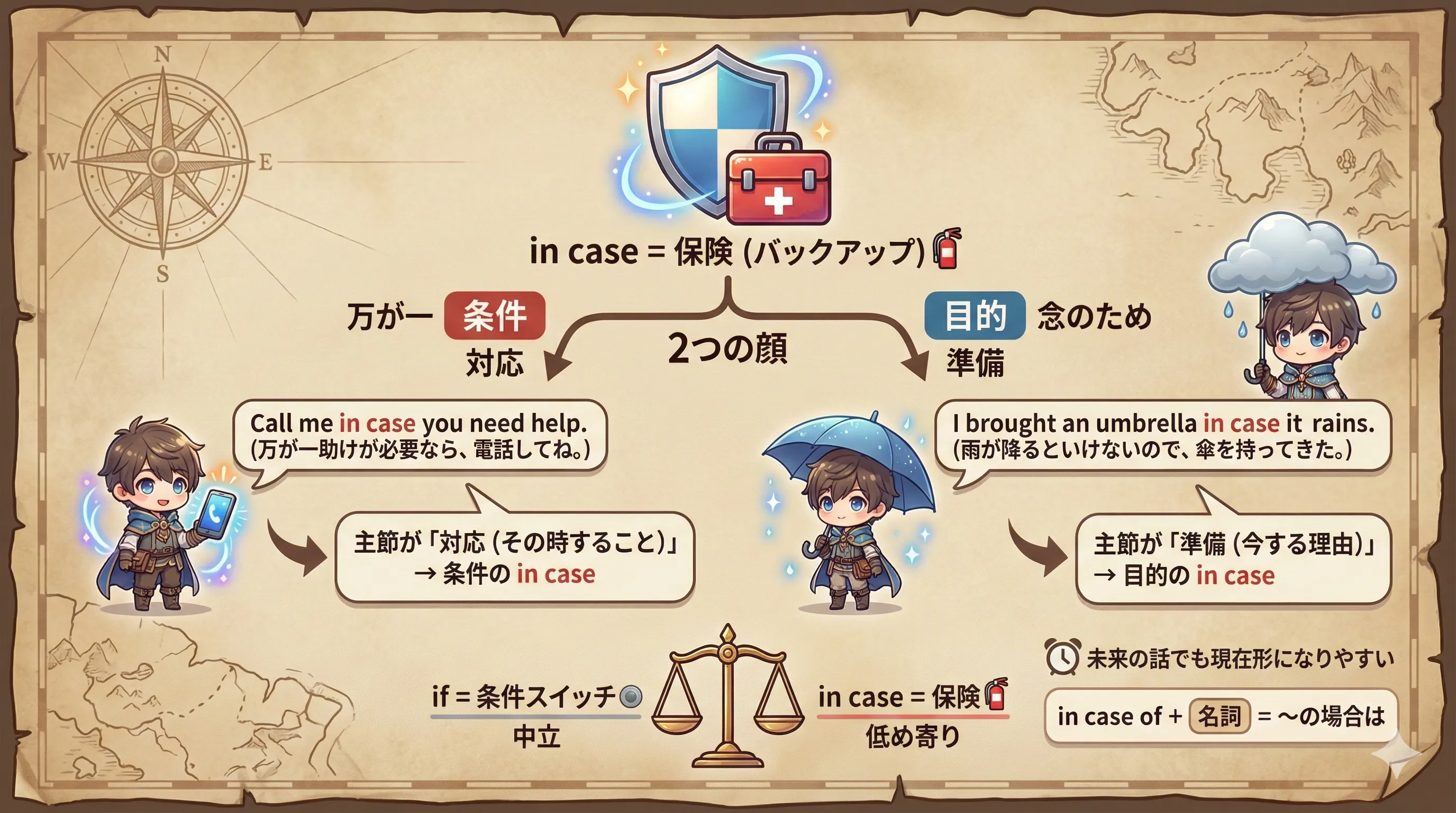
💡 if が「条件スイッチ🔘」なら、in case は「万が一に備える保険🧯」。
確率は低めでも、
起きたら困るから備える…という空気感がポイントです。
🎯
まずはコア:in case(条件)=「万が一〜なら(その時は)」
基本は in case + S + V(節=文のかたまり)です。
主節 + in case + S + V ...(主節=メインの文)
確率低め でも 起きたら困る から、 備える・対応する イメージです。
「2つの顔」を先に知っているだけで、
in case の迷いがグッと減ります😊
🔍
最重要:in case の2つの顔(条件 / 目的)を見分けよう
同じ in case でも、文の役割が2パターンあります。
(条件=その時のルール/目的=今する理由)
まずは「主節(メインの文)が何を言っているか」で判断するとラクです✨
「起きたら、その時こうしてね」という 対応(やること)が主節に来やすい。
Call me in case you need help.
(万が一助けが必要なら、電話してね。📞)
「起きるかもだから、今これをする」という 備え(準備)が主節に来やすい。
I brought an umbrella in case it rains.
(雨が降るといけないので、傘を持ってきた。☔)
主節が「対応(その時すること)」→ 条件の
in case主節が「準備(今する理由)」→ 目的の
in case
🧭
迷ったらこれ:in case 判定チャート(超かんたん)
「意味が見える」=「自信が出る」=「続く」…この流れが作れます😊
⚖️
if と in case の違い:スイッチ🔘 vs 保険🧯
どちらも「もし」っぽいですが、空気感が少し違います。
(空気感=文章から伝わる雰囲気)
| 表現 | イメージ | 確率感 | よく合う場面 |
|---|---|---|---|
| if | 条件スイッチ🔘(起きたらこう) | 中立(高い/低いは文次第) | 条件→結果、ルール、手順、一般的な「もし」 |
| in case | 保険🧯(起きたら困るから備える) | 低め寄り(ゼロじゃない) | 念のための準備、万が一の対応、予防線を張るとき |
if = 条件を言う/in case = 備える気持ちが混ざる
⏰
時制(時の形)の注意:未来の話でも in case 節は現在形になりやすい
条件節(条件を言う文のかたまり)では、未来の話でも
現在形がよく使われます。
(時制=現在・過去・未来の形)
... in case + S + V(現在形)
“未来”を言いたい気持ちでも、まずはこの形が基本です🔑
学習中は「in case 節に will を入れたくなる罠」に注意⚠️
迷ったら 現在形に戻すのが安全です。
ルールは “短いほど強い”。まずは「条件節は現在形が多い」を固定して進みましょう😊
➕
追加で便利:in case of + 名詞(〜の場合は)
節(S + V)ではなく、名詞で「〜の場合」を言う形もあります。
(名詞=人・物・ことの名前)
緊急時や注意書きで見かけやすい形です📌
in case of + 名詞例:
in case of emergency(緊急の場合)
- 注意書き・案内文(ルールの文章)
- 緊急時の連絡・手順
- 書類やメールの少し硬い表現
節なら
in case + S + V /
名詞なら in case of + 名詞
と分けるとスッキリします😊
💬 例文で感覚をつかもう!(in case)
Call me in case you need help.
(万が一助けが必要なら、電話してね。📞🧯)
🔍 見分け:主節が「対応(その時やること)」→ 条件の in case
🧠 近い言い換え:If you need help, call me.(ただし in case は「備え」の匂いが強め)
Keep this receipt in case you need a refund.
(万が一返金が必要になったら困るので、このレシートを取っておいてね。🧾)
💡 使いどころ:注意書き・アドバイスでよく出る(備えの空気)
🧩 ポイント:need の後ろは名詞(a refund)で「〜が必要」
I brought an umbrella in case it rains.
(雨が降るといけないので、傘を持ってきた。☔)
🔍 見分け:主節が「準備(今やる理由)」→ 目的の in case
⏰ 時制:未来の話でも in case 節は 現在形になりやすい(rains)
Save this file in case your computer crashes.
(パソコンが万が一クラッシュすると困るので、このファイルを保存しておいて。💾)
🧠 ニュアンス:起こる確率は高くないけど、起きたら困るから“保険”をかける。
🧩 語注:crash=(急に止まる/落ちる)
In case you get lost, take a screenshot of this map.
(万が一道に迷ったら困るので、この地図のスクショを撮っておいて。🗺️📱)
📌 前置き:In case ... を先に置くときはカンマで区切ると読みやすい。
🧩 語注:get lost=(迷子になる/道に迷う)
I wrote down your number in case my phone dies.
(携帯が万が一使えなくなるといけないので、番号をメモしたよ。📝)
🧩 語注:die(ここでは)=(電池が切れる)
💡 “備え” をサラッと言えると、英語がスマートに聞こえます✨
Suppose you can't reach me. In that case, email me.
(もし私に連絡できないなら、その場合はメールしてね。📧)
🧠 注意:in case(万が一)と in that case(その場合は)は別物。
🔎 in that case は「前の文を受けて “その場合は”」のつなぎ表現。
I'll keep your message, just in case I miss you.
(寂しくなったときのために、君のメッセージを残しておくよ。💗📱)
💡 just in case=「念のため(ちょっとだけ可能性があるから)」の定番フレーズ。
🧩 語注:miss you=(あなたが恋しい/会いたい)
主節が「準備(持つ・保存する)」→ 目的(念のため)
主節が「対応(電話して・連絡して)」→ 条件(万が一)
🧠 “保険🧯” の気持ちが入るのが
in case の特徴です。
➡️
次は 8-4:条件の「しばり」as long as へ
8-3 では「万が一(確率低め)に備える条件」を見ました。
次の 8-4 は、「〜する限り/〜さえすれば」という
必要条件(これがないとダメ)の“しばり”がテーマです🔒
(必要条件=絶対に必要な条件)
条件表現は「性格(確率・備え・しばり)」で覚えると、暗記じゃなく理解になります。
ここまで来たあなたは、もう“使い分けの地図”を持っています🗺️✨
8-4. as long as / so long as:~する限り・~さえすれば
as long as / so long as は、
「必要条件(これができればOK)」を作る表現です🔒✨
ざっくり言うと
「~さえすれば」
と
「~する限り」
の感覚。
まずは「条件(=しばり)」の意味を土台にして、使いどころをスッキリ整理しましょう。
⚠️ 注意:as long as には「期間(〜している間)」っぽい意味で使われることもあります。
(ここでは“条件の意味”が主役。期間の話は別セクションで切り分けます)
🎨
イメージでつかむ:as long as は「条件のカギ」🔑(この条件が満たせたらOK)

💡 if が「条件スイッチ🔘」なら、
as long as は
“合格ライン(最低条件)”を示す感じ。
「この条件を守るなら、あとはOKだよ😊」という空気が出やすいのが特徴です。
🔒
① つかみ:as long as は「必要条件のしばり」
as long as は
「これさえ満たせばOK」という
“しばり(条件のルール)” を作ります。
(必要条件=それがないとダメな条件)
- 許可(〜していいよ)
- 約束(〜ならやるよ)
- 条件提示(この条件ならOK)
必要条件
=「合格ライン」
(これを満たすなら、進んでOK)
You can use my laptop as long as you’re careful.
(気をつけて使うなら、私のノートPCを使っていいよ。💻)
まずは「合格ライン(必要条件)」のイメージがつかめれば、8-4は勝ちです😊
🎯
② コア:as long as / so long as =「~ならOK」
基本はこの形です👇
(節=文のかたまり。主節=メインの文)
S + V, as long as + S + VAs long as + S + V, S + V
先に置くときは、読みやすくするためにカンマで区切るのが基本です。
条件
「この条件が満たされるなら、OK」
= provided (that)(その条件なら)っぽい感覚にも近いです。
I’ll help you as long as you don’t give up.
(あきらめないなら、手伝うよ。💪)
as long as は“条件のカギ”になりやすいです🔑
🎛️
③ as long as と so long as の違い(深く悩まなくてOK)
結論:意味はほぼ同じで大丈夫です🙆♀️
迷ったら as long as を使えばOK。
(so long as は、会話っぽく感じることもありますが、意味は同じと考えてOK)
- どちらも「条件(必要条件)」を作れる
- 意味の差で減点されにくい
- まずは “使えること” が最優先
迷ったら
as long as
口調を軽く
so long as(と感じることも)
So long as you’re ready, let’s go.
(準備ができてるなら、行こう。🚀)
📌 ④ 用途別に覚えると一気に使える(許可・約束・交渉)
as long as は、日常でよくある「条件つきOK」を作るのが得意です✨
ここは “用途(どんな場面?)” でまとめると、暗記じゃなく運用になります。
You can stay here as long as you keep quiet.
(静かにするなら、ここにいていいよ。🤫)
I’ll go with you as long as it doesn’t take too long.
(あまり長くならないなら、一緒に行くよ。🚶♀️)
We can offer a discount as long as you pay today.
(今日支払うなら、割引できます。🏷️)
- 許可:〜していい(条件つきOK)
- 約束:〜ならやる(譲れる条件)
- 交渉:条件提示(合意のライン)
まずは「用途+1文」を積み上げると、脳が“使える知識”として覚えます😊
🗺️
⑤ 「条件表現の性格」を整理:if / unless / in case / as long as
条件表現は「意味が似てる」より、
性格(空気感)で覚えると迷いません😊
(空気感=文章から伝わる雰囲気)
| 表現 | イメージ | 得意な場面 |
|---|---|---|
| if | 条件スイッチ🔘(起きたらこう) | 手順・ルール・一般的な「もし」 |
| unless | 否定条件🚫(〜でない限り) | 「〜しないと困る」注意・忠告 |
| in case | 保険🧯(万が一に備える) | 念のための準備/万が一の対応 |
| as long as | しばり🔒(必要条件を満たせばOK) | 許可・約束・交渉(条件つきOK) |
if=スイッチ / unless=否定 / in case=保険 / as long as=しばり
⏰
⑥ 時制(時の形)の注意:未来の話でも as long as 節は現在形になりやすい
条件節(条件を言う文のかたまり)では、未来の話でも
現在形がよく使われます。
(時制=現在・過去・未来の形)
As long as + S + V(現在形), S + will + V ...
主節が未来でも、条件側(as long as 節)は現在形になりやすいのが基本です。
学習中は as long as 節に will を入れたくなりがち⚠️
迷ったら まず現在形に戻すのが安全です。
As long as you study a little every day, you’ll improve.
(毎日少し勉強する限り、上達するよ。📈)
ルールは “短いほど強い”。条件節=現在形 を先に固定すると、他の条件表現にも効きます😊
⚠️
⑦ 最大の混同ポイント:as long as は「条件」と「期間」がある
as long as は便利ですが、
文脈によって
「条件(必要条件)」と
「期間(〜している間)」
のどちらにも見えることがあります。
(混同=ごちゃまぜになって分からなくなること)
「〜ならOK」の意味。主節に 許可・約束・提案が来やすい。
You can borrow it as long as you return it by Friday.
(金曜までに返すなら、それを借りていいよ。📚)
「どれくらい続くか」の意味。主節が 滞在・継続などになりやすい。
I’ll stay here as long as I can.
(できる限り、ここにいるよ。⏳)
「〜ならOK」→ 条件(必要条件)
「〜している間/できる限り」→ 期間(長さ)
※期間の詳しい整理は 10-1(期間の
as long as)で扱うとスッキリします。
➡️
⑧ まとめ:as long as は「条件のカギ」🔑/次は suppose(仮に〜なら?)
- 条件(必要条件): 「この条件さえ満たせばOK」→ 許可・約束・交渉に強い🔒
- 時制: 未来でも条件節は現在形になりやすい⏰
- 混同: 「期間の as long as」は 10-1 で切り分け🧩
As long as you keep going, you’re winning.
(続ける限り、あなたは勝ってる。🏆)
suppose / supposing (that):「仮に〜なら?」という思考実験で、相談・提案・質問が一気にやりやすくなります😊
8-5. suppose / supposing (that):仮に~なら?
suppose は「仮に〜なら?」と、想像の話(思考実験)を始める合図です🧪✨
if よりも 会話をやわらかく始められるのが強み。
ここでは「型(形)」と「使いどころ(相談・提案)」を、ミニ例文で感覚ごとつかみましょう。
むずかしい言葉はこう覚えると安心です:
(思考実験=実際かどうかは置いて、仮の話をしてみること)
🎨
イメージでつかむ:suppose は「思考実験のスタートボタン」🧪

💡 suppose は「現実かどうか」をいったん横に置いて、仮の状況を置く表現。
だから質問・相談・提案の入り口として、とても便利です😊
🧪
① つかみ:suppose=「仮に〜なら?」(想像の話をスタート)
suppose は、相手に圧をかけずに「じゃあ、こうだったら?」と話を始められます。
(圧=強く言いすぎて相手が身構える感じ)
- アイデア出し(どうする?)
- 相談(困ったら?)
- 仮定の質問(その場合は?)
suppose
=「仮に」
(現実の話じゃなくてもOK)
Suppose you won the lottery. What would you do?
(仮に宝くじが当たったら、何をする?🎟️)
「仮の一言」を置けるだけで、会話は前に進みます😊
🧩
② コアの型:Suppose (that) + S + V/Supposing (that) + S + V
どちらも「仮に〜なら?」の導入です。迷ったら suppose でOK🙆♀️
(that は省略されることが多い)
Suppose (that) S + V, ...Supposing (that) S + V, ...
先頭に置くときは、読みやすくするためにカンマで区切ることが多いです。
suppose:基本。迷ったらこれ。supposing (that):同じ意味(少し文っぽく見えることも)。
Supposing (that) it rains tomorrow, we’ll switch to Plan B.
(仮に明日雨なら、プランBに切り替えよう。☔)
💬 ③ 使いどころ①:相談・問題解決の導入(会話が始めやすい)
suppose を使うと、「まだ起きてないけど、もしそうなったら?」を
やわらかく聞けます。
相手にとっても答えやすいので、相談がスムーズになります😊
- 遅れそう
- 連絡がつかない
- 予定変更
“仮の状況” を先に置くと、質問が丁寧に聞こえやすいです。
Suppose I can’t make it on time —should I call you?
(仮に時間に間に合わなかったら、電話したほうがいい?📞)
💡 ④ 使いどころ②:提案(やわらかいアイデア出し)
「こうしよう!」と強く言うより、suppose で
“アイデアとして置く”と、
相手も乗りやすくなります😊
(提案=こうしたらどう?というアイデア)
- 待ち合わせ時間を変える
- 別の案にする
- 小さく試す(まずやってみる)
いきなり決めずに「案を置く」と、相手の抵抗が下がりやすいです。
Suppose we meet at seven and leave together.
(仮に7時に会って、一緒に出発するのはどう?🕖🚶♀️)
How does that sound? を付けるのも便利です。
人は「完璧に分かってから」より、“少し分かった状態で使ってみる”ほうが定着します。
まずは
Suppose ... を1回言えたら勝ちです😊
🧭 ⑤ 使いどころ③:相手への“やさしい誘導”(軽い助言)
suppose は「こうしなよ!」と強く言わずに、
“ひとつの案”として提案できます😊
(助言=アドバイス。相手の自由も残す言い方)
- 相手が焦っているとき
- 選択肢を増やしたいとき
- 言い方をやわらかくしたいとき
“断定”より “提案” にすると、相手の抵抗が下がりやすいです。
(抵抗=反対したくなる気持ち)
Suppose you take a short break first.
(まず少し休憩してみたら?☕)
「提案の型」を1つ持つだけで、英語の会話がグッと楽になります😊
🗺️
⑥ 似ている表現との違い:if / what if / let’s say / suppose
似ている表現は「意味」より「性格(空気感)」で区別するとスッキリします✨
(空気感=話し手の気持ちのニュアンス)
| 表現 | イメージ | ミニ例文(意味) |
|---|---|---|
| if | 条件スイッチ🔘(起きたらこう) | If you’re free tomorrow, let’s grab lunch. (明日ヒマなら、ランチしよう。) |
| what if | もし〜だったらどうする?🤔(不安寄りにも) | What if it’s too expensive? (もし高すぎたらどうする?💸) |
| let’s say | 仮に〜としよう🧩(例として置く) | Let’s say we start at nine. (仮に9時スタートとしよう。) |
| suppose | 仮の状況を置いて会話開始🧪(やわらかい) | Suppose we start at nine—would that work for you? (仮に9時開始って、都合どう?) |
“相談・提案の入口”にしたい →
suppose が使いやすいです😊
⚠️
⑦ 混同注意:suppose は「仮に」だけじゃない
suppose は文の形で意味が変わりやすいので、ここで “事故” を防ぎます🚧
(混同=別の意味で覚えてしまうこと)
会話の導入で「仮の状況」を置く。
Suppose he says no—what then?
(仮に彼が断ったら、その次どうする?)
I suppose ... は「たぶん〜だと思う」。
I suppose he’s busy.
(たぶん彼は忙しいと思う。)
be supposed to は「規則・予定」寄り。
You’re supposed to wear a helmet here.
(ここではヘルメットを着用することになっている。⛑️)
Suppose ...=仮の話(導入)/
I suppose ...=たぶん/
be supposed to=〜することになっている
➡️
⑧ まとめ:suppose は「会話をやわらかく始める」/次は “条件を硬く明示” へ
-
supposeは「仮の状況」を置いて、相談・提案を始められる🧪 - 各項にミニ例文で、使いどころが一気に見えるようになる✨
-
混同防止:
I suppose(たぶん)/be supposed to(〜することになっている)
Suppose we change the plan —are you okay with that?
(仮に予定を変えたら、それでも大丈夫?🗓️)
“仮の一文” を言えると、英語は「勉強」から「会話」へ進みます😊✨
次の 8-6 は
providing / provided (that):条件を きっちり明示する硬め表現です。
8-6. providing / provided (that):その条件なら(やや文語)
provided (that) は「〜という条件で」を表す、
条件の明文化(きっちり書く)が得意な表現です📄✨
as long as より少し硬めで、案内・規則・サービス条件にぴったり。
まずは「その条件ならOK」の感覚と、よく出るシーンをミニ例文でつかみましょう。
むずかしい言葉はこう覚えると安心です:
(明文化=条件をはっきり文章にして示すこと)
(文語=会話より文章で見かけやすい言い方)
🎨
イメージでつかむ:provided (that) は「条件つきOKのスタンプ」✅📄
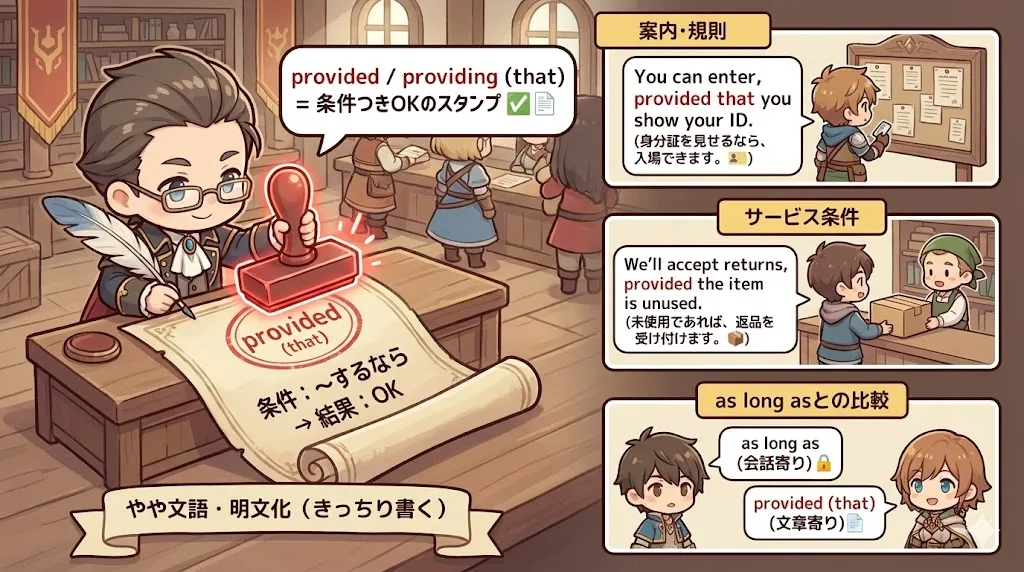
💡 provided (that) は
「条件を満たすならOK」を、
文章でスッキリ示すときに強い表現です。
「注意書き」「ルール」「サービスの条件」っぽい場面でよく出ます📌
📌
① つかみ:provided (that)=「その条件ならOK」
ポイントはこれだけ👇
provided (that)
= 〜という条件で(条件をはっきり書く)📄
- 入場・利用ルール
- 返金・交換の条件
- 撮影・持ち込みの注意書き
条件 を満たしたら OK ✅ (条件つきの許可・対応)
You can enter, provided that you show your ID.
(身分証を見せるなら、入場できます。🪪)
“条件つきOK” を言えると、英語が一気に大人っぽく見えます😊✨
🧩
② コア:providing (that) / provided (that) はほぼ同じ意味
どちらも「〜という条件で」。迷ったら provided (that) を使うと安心です🙆♀️
(that は省略されることも多い)
provided (that) = providing (that)「〜という条件で」
学習初期は provided (that) を主役にしてOK。
やや文語
条件を“文章として”はっきり示す感じ📄
(会話でも使えるけど、案内文・規約で特によく見ます)
We’ll accept returns, provided the item is unused.
(未使用であれば、返品を受け付けます。📦)
that が省略されている形(provided (that))もよく出ます。
🧱 ③ 型:前に置く/後ろに置く(読みやすさのコツ)
provided (that) 節は、前にも後ろにも置けます。
先に置くときは カンマ を入れると読みやすいです😊
Provided (that) S + V, S + V ...
Provided that you submit the form by Friday, we can process it quickly.
(金曜までに書類を提出してくれれば、すぐ処理できます。🗂️)
S + V ..., provided (that) S + V
We can ship today, provided that payment is confirmed.
(支払い確認が取れれば、本日発送できます。🚚)
📢 ④ 使いどころ①:ルール・案内・注意書き(硬めの文章で映える)
provided (that) は “条件をはっきり示す” ので、
注意書き・規則・案内にピッタリです📌
文章のトーンが自然に「きちんと」見えます。
- 撮影ルール
- 入場条件
- 利用条件(Wi-Fi / 施設など)
明文化 「条件を文章で示す」→ 規約っぽい空気📄
Photography is allowed, provided that you don’t use a flash.
(フラッシュを使わない限り、撮影は可能です。📷)
“文章っぽい例文” を1つ覚えると、同じ型でいくらでも作れます😊
まずは allowed / accepted / shipped あたりから増やすのがおすすめです。
🤝 ⑤ 使いどころ②:取引・サービス対応(条件つきの約束)
provided (that) は「条件が満たされるなら、こちらはこう対応します」という
条件つきの対応をきれいに書けます📄✨
(対応=返金する・交換する・発送するなど)
- レシートがある
- 未使用である
- 期限内である
- 支払い確認が取れている
条件
をクリア → 対応します、という形が作れます。
文章が “きちんと” 見えるのが強みです😊
We’ll refund you, provided that you have the receipt.
(レシートがあれば、返金します。🧾)
refund / exchange / ship など “対応動詞” と一緒に覚えると、すぐ使えます😊
🎛️
⑥ as long as と何が違う?:provided (that) は“条件を明文化”する
どちらも「条件」ですが、空気感が違います👇
as long as
=会話でも自然(やわらかい)🔒
provided (that)
=案内・規則・規約っぽい(きっちり)📄
You can borrow it as long as you return it by Friday.
(金曜までに返すなら、それを借りていいよ。📚)
You may borrow it, provided that it is returned by Friday.
(金曜までに返却されることを条件に、借りることができます。📄)
同じ意味でも “場面で言い方を変える” と、英語が一気に上級っぽくなります😊✨
⚠️
⑦ 混同注意:provided (that) と provide(提供する)は別もの
見た目が似ているので要注意🚧
provided (that)=条件(〜という条件で)
provide=提供する(サービスを出す)
The hotel provides free Wi-Fi.
(そのホテルは無料Wi-Fiを提供している。📶)
You can use the Wi-Fi, provided that you accept the terms.
(規約に同意するなら、そのWi-Fiを使えます。✅)
provide=提供する(動詞)/ provided (that)=〜という条件で(条件を足す)
➡️
⑧ まとめ:provided (that) は“条件をきっちり明示”/次はさらに契約っぽく
-
provided (that)は「〜という条件で」=条件つきOKを明文化📄 - 案内・規則・サービス条件に強い(文章で映える)📌
-
provide(提供する)との混同に注意⚠️
We’ll go ahead, provided that everyone agrees.
(全員が同意するなら、進めます。👍)
条件表現は「場面ごとに言い方が変わる」と理解した時点で、もう一段レベルが上がっています😊✨
次の 8-7 は
on condition (that):さらに 契約・取り決め感 が強い表現です🧾
8-7. on condition (that):~という条件で(取り決め感)
on condition (that) は「~という条件で」を表しますが、
ただの条件ではなく 合意・取り決め(約束のルール)の空気が出ます🧾✨
provided (that) よりもさらに「契約っぽい/交渉っぽい」トーンになりやすいのが特徴です。
ここでは「取り決め感の理由」と「よく使う場面(貸す/値下げ/承認など)」をミニ例文で体感しましょう。
むずかしい言葉はこう覚えると安心です:
(取り決め=お互いに守ると約束したルール)
(交渉=条件を出し合って決めること)
🎨
イメージでつかむ:on condition (that) は「条件付きの約束スタンプ」🧾✅
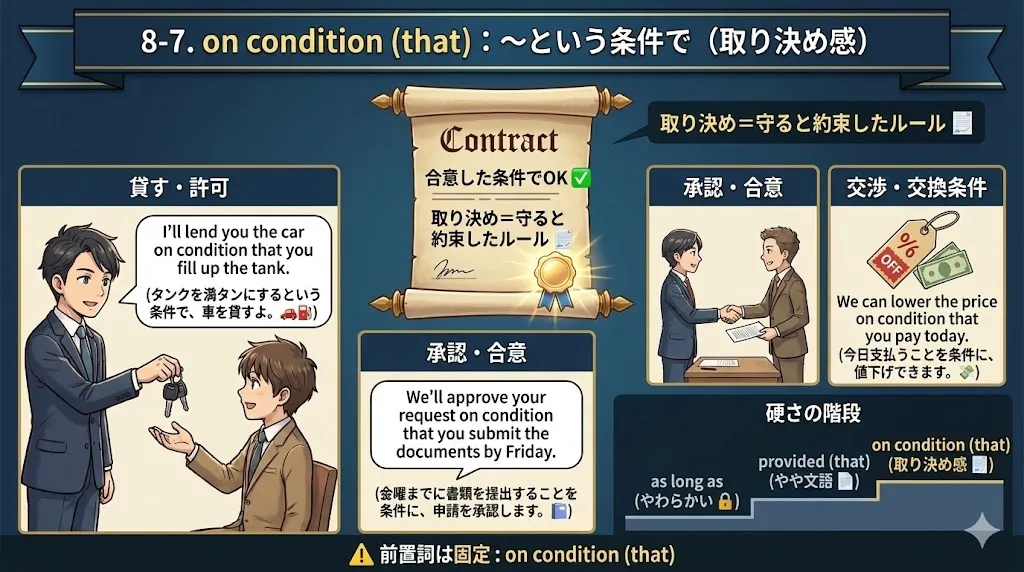
💡 on condition (that) は
「その条件ならOK(取り決めとして)」を表す言い方。
だから「貸す」「承認する」「値下げする」など、合意の場面で特に活躍します🤝
🧾
① つかみ:on condition (that)=「合意した条件でOK」
if みたいに「もし〜なら」よりも、
“守る約束の条件”として提示する感じが強いです。
(約束=守ると決めたこと)
- 貸す・許可する(条件つき)
- 承認する(条件つき)
- 値下げ・契約(条件つき)
on condition
=「その条件で(取り決め)」🧾
“条件をルールとして置く”感じ
I’ll lend you the car on condition that you fill up the tank.
(タンクを満タンにするという条件で、車を貸すよ。🚗⛽)
“条件つきOK” を言い分けられると、英語が一気に大人っぽく見えます😊✨
📌 ② コア意味:条件を“条件として”提示する(契約・約束の香り)
on condition (that) は、条件を 取り決めとして明言します。
案内文・メール・交渉の文でよく使われます📩
- approve(承認する)
- allow(許可する)
- agree(同意する)
「条件が満たされるなら対応する」よりも、
“この条件で合意する”感じが強いです。
We’ll approve your request on condition that you submit the documents by Friday.
(金曜までに書類を提出することを条件に、申請を承認します。🗂️)
🧱
③ 型:on condition (that) + S + V(that は省略されることも)
型はシンプルです👇
on condition (that) + 主語 + 動詞
(that は省略されることもあります)
「許可・承諾・合意」の文のあとに続けて入れると自然です。
例:You may / We will / I’ll ...
文の前半で「OK」を出して、後半で「条件」を置くと読みやすい📌
You may enter on condition that you wear a badge.
(バッジを着けるという条件で、入場できます。🏷️)
🤝 ④ 使いどころ①:交渉・合意(譲る代わりに条件を出す)
ここが on condition (that) の本領です🔥
「OKする代わりに、これを守ってね」という
交換条件が作れます。
(交換条件=これをするなら、こちらもこうする)
- 値下げ
- 支払い条件
- 締切(今日中ならOKなど)
先に “対応” を言って、後ろで “条件” を言うと、交渉文が一気に整います📄
We can lower the price on condition that you pay today.
(今日支払うことを条件に、値下げできます。💸)
交渉文は “型” が命。We can ... on condition that ... を丸ごと覚えると応用が爆増します😊
📄 ⑤ 使いどころ②:ルール・規約・取り決め(文章で映える)
on condition (that) は「条件を提示する」だけでなく、
“取り決めとして明言する”空気が強いので、
ルール文・規約文にとても合います🧾
(規約=サービスのルールをまとめた文章)
- 施設利用の条件
- 安全ルールの遵守
- 利用者の義務(ルール)
取り決め 「守る前提のルール」を置くので、文章が一気に “契約っぽく” 見えます。
Students can use the lab on condition that they follow the safety rules.
(安全ルールに従うことを条件に、学生は実験室を利用できます。🧪)
“規約っぽい動詞” allow / permit / approve とセットで覚えると応用が爆増します😊
🎛️
⑥ “硬さの階段”で整理:as long as → provided (that) → on condition (that)
セクション8の条件表現は、硬さ(距離感)で整理すると迷いません😊
(距離感=会話っぽい/文章っぽいの違い)
| 表現 | 空気感 | 得意な場面 |
|---|---|---|
| as long as | 会話でも自然(やわらかい)🔒 | 友だち同士の「条件つきOK」/カジュアルな許可 |
| provided (that) | やや文語(明文化)📄 | 案内・規則・サービス条件の提示(きっちり) |
| on condition (that) | 取り決め感(合意・契約)🧾 | 交渉・合意・契約の文章/交換条件をはっきり宣言 |
“友だちの許可”→ as long as / “規約っぽい条件”→ provided / “合意・契約の条件”→ on condition
You can borrow it as long as you return it by Friday.
(金曜までに返すなら、借りていいよ。)
You may borrow it provided (that) it is returned by Friday.
(金曜までに返却されるなら、借りられます。)
You may borrow it on condition that it is returned by Friday.
(金曜までに返却されることを条件に、借りられます。)
⚠️
⑦ よくあるミス:in the condition that などにしない(前置詞の固定)
形が少し長いので、学習者が “それっぽく” 作ってしまいがちです🚧
でもこの表現は 固定フレーズとして覚えるのが安全です。
- ×
in the condition that ... - ×
on conditions that ...(基本は単数)
正解はこれ👇(まるごと暗記でOK)
on condition (that) + S + V
I’ll help you on condition that you try your best.
(全力でやるという条件で、手伝うよ。💪)
on condition (that) は “セット表現” として丸ごと覚えるのが一番安全です。
🏁
⑧ まとめ:on condition (that)=“取り決めとしての条件”/セクション8のゴールへ
-
on condition (that)は「〜という条件で」でも、特に 合意・取り決めの空気が強い🧾 - 交渉・規約・交換条件で大活躍(文章で映える)📄
- 前置詞は固定:on を変えない⚠️
We’ll proceed on condition that both sides agree.
(双方が同意することを条件に、進めます。✅)
条件表現を「意味」だけでなく、場面(会話/規約/交渉)で選べるようになったら実力は本物です😊✨
ここまで来たあなたは、もう “使える条件表現” を手に入れています。
9. 様態を表す(as / like / as if)の使い分け(まずは全体像)
ここは「どんなふうに?(やり方・見え方)」を説明する 3点セット🎭
as=その通りに(方法) / like=〜みたいに(似てる) /
as if=まるで〜みたいに(見え方) を、まずはざっくり整理します。
ここでは詳しい説明に入る前に、「まずはイメージをつかむ」ことが目標です😊
むずかしい言葉は、やさしく言い換えます:
(様態=どんなふうにするか/どう見えるか)
(仮定法=本当には起きていない、想像の話をする文)
🎨
イメージでつかむ:as / like / as if のちがい🎭
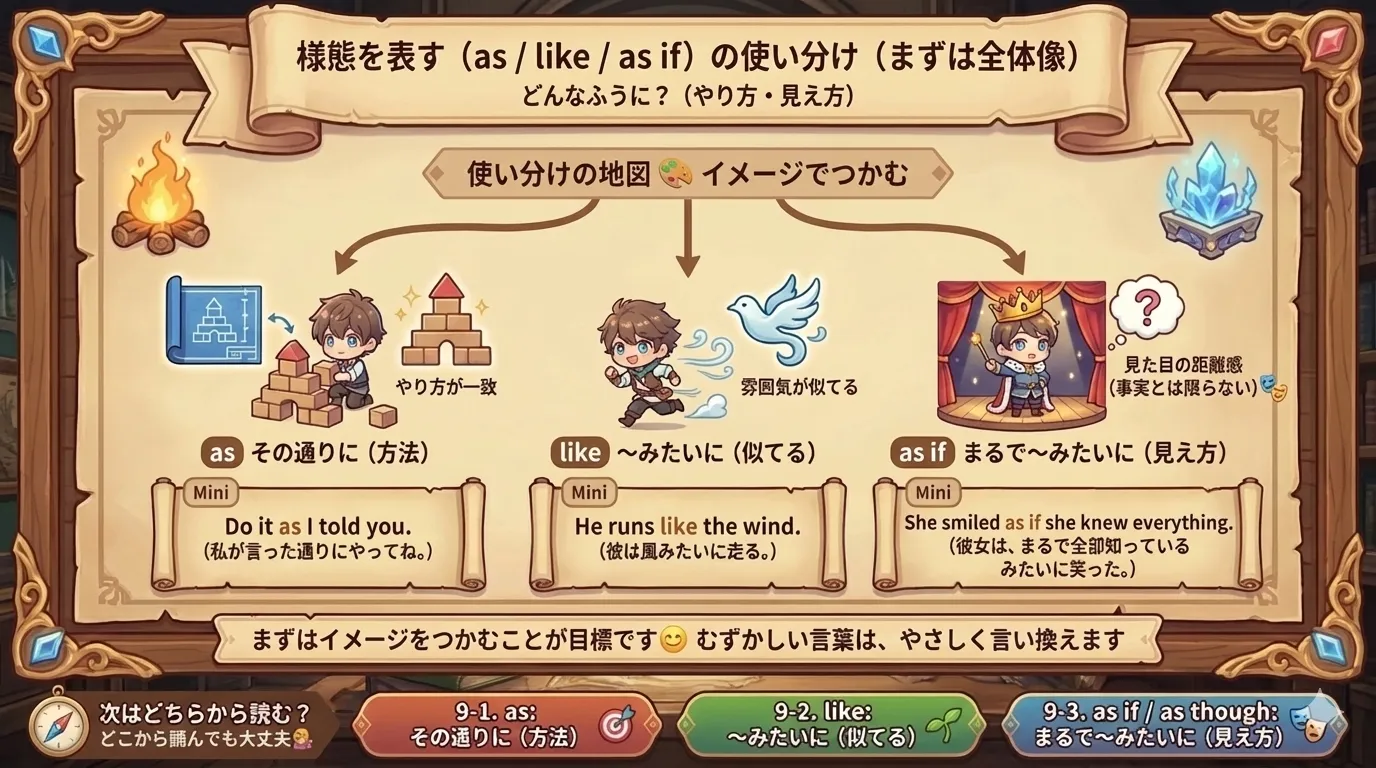
- as その通りに(方法) =やり方が一致
- like 〜みたいに(似てる) =雰囲気が似てる
- as if まるで〜みたいに(見え方) =見た目の距離感(事実とは限らない)
💡 この図は「使い分けの地図」です。次の 9-1〜9-3 で、カードごとに具体例を増やしていきます😊
🧭 次はどちらから読む? 9-1 ~ 9-3 へのナビゲーション
9-1~9-3 は、どこから読んでも大丈夫です🙆♀️
「今まさに使いたい」ものから進めると、学びがスッと入ります。
(順番にこだわりすぎない方が、続きやすいです)
- as その通りに(方法) =やり方が一致
- like 〜みたいに(似てる) =雰囲気が似てる
- as if まるで〜みたいに(見え方) =見た目の距離感
Do it as I told you.
(私が言った通りにやってね。)
He runs like the wind.
(彼は風みたいに走る。)
She smiled as if she knew everything.
(彼女は、まるで全部知っているみたいに笑った。)
as if は「事実かどうかは別だけど、そう見える」という距離感が出ます(この続きは 9-3 で!)
人は「完璧に分かってから始める」よりも、 「だいたい分かった状態でまず使ってみる」 方が記憶に残りやすく、学習が続きやすいです。
✅ ここまで読めたあなたは、もう準備はバッチリです。次は気になるカードからどうぞ😊✨
9-1. as:その通りに(方法・手順)
as は「〜のように」でも、ここでの主役は
“その通りに(やり方が一致)”です📋✨
「言われた通りに」「書いてある通りに」「いつも通りに」など、
手順(やる順番)・方法(やり方)の一致をスッキリ言えます。
まずは “as=方法のコピー” の感覚を、ミニ例文で体に入れましょう😊
むずかしい言葉はこう言い換えます:
(方法=やり方)
(手順=やる順番)
🎨
イメージでつかむ:as は「やり方をコピーする」📋
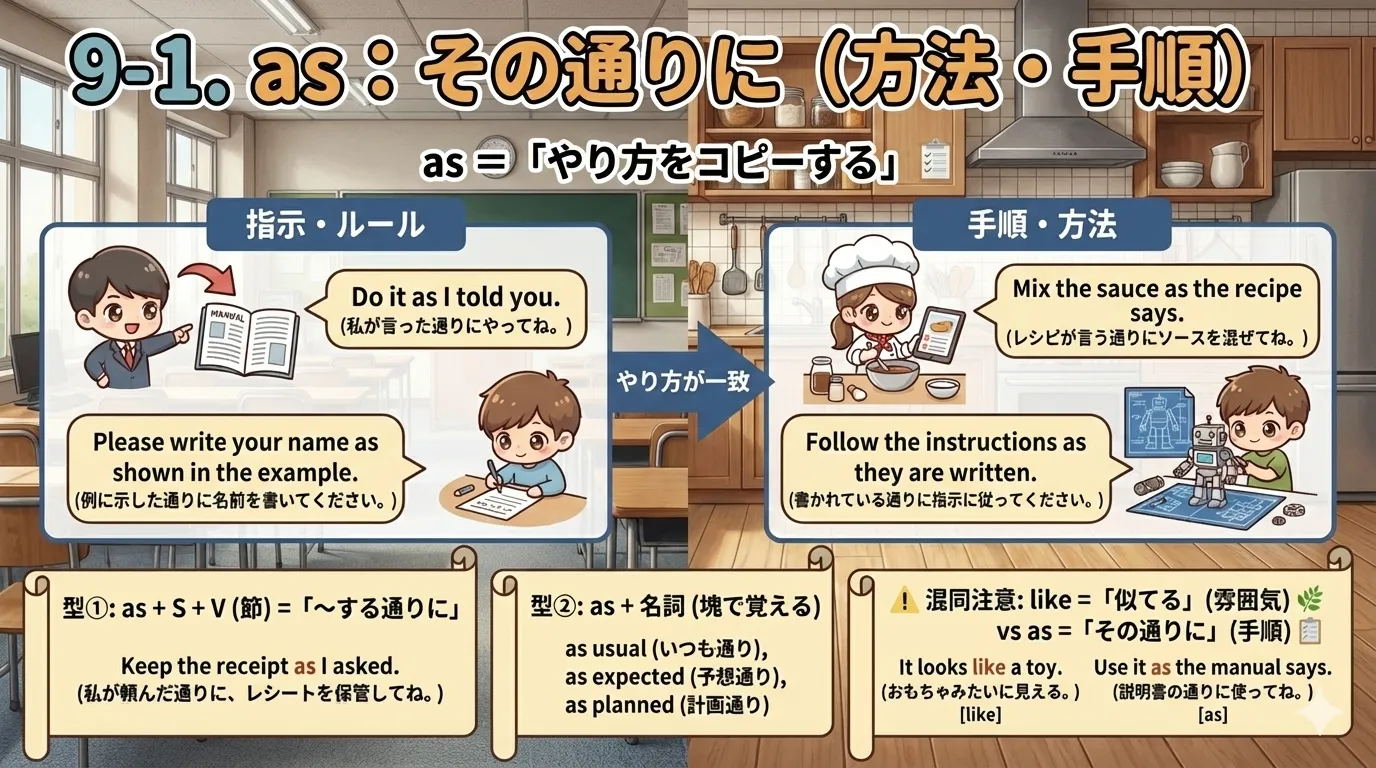
💡 as は「似てる(like)」ではなく、
“やり方が同じ”を伝えるスイッチです。
まずはこの感覚だけ掴めばOKです😊
📌
① つかみ:as=「その通りに」=やり方のコピー
まずはこれを固定します👇
as
= 言われた通りに/書いてある通りに(やり方が一致)📋
- 指示に従う
- 説明書の通りに操作
- ルール通りに行動
as = how(どんなふうに?)の答え
「やり方」を一致させる合図です。
Do it as I told you.
(私が言った通りにやってね。)
Please write your name as shown in the example.
(例に示した通りに名前を書いてください。)
as shown ... は「示されている通りに」=手順に沿う感じが強いです。
🛠️
② コア:as は「方法・手順が一致」= how の答え
as は「どんなふうに?(how)」に対して、
“そのやり方で”と答えるイメージです。
レシピ・説明書・ルールの文と相性バツグン🍳📘
as the recipe says(レシピの通り)as instructed(指示通り)as written(書かれた通り)
as
は “ルールの矢印” 🧭
「やり方」を指して「その通りに」と導く感じです。
Follow the instructions as they are written.
(書かれている通りに指示に従ってください。)
Mix the sauce as the recipe says.
(レシピが言う通りにソースを混ぜてね。)
as の王道です。
🧱
③ 型①:as + S + V(節)=「〜する通りに」
9-1 の核はこの型👇
as + 主語 + 動詞
=「(主語が)〜する通りに」
“人の指示” でも “物の状態” でも使える万能型です✨
told(言った)asked(頼んだ)explained(説明した)
まず「やってほしいこと」を言って、後ろで as ... を足すと読みやすいです📌
Keep the receipt as I asked.
(私が頼んだ通りに、レシートを保管してね。)
Leave the box as it is.
(そのまま箱を置いておいて。)
as it is は「今の状態のまま」=手順より “状態の一致” を出す定番です。
🧩
④ 型②:as + 名詞(慣用)= as usual / as expected など
ここは “塊で覚えるゾーン”です✨
手順というより「状況が一致」=「いつも通り」「予想通り」と言いたいときに便利です。
as usual(いつも通り)as expected(予想通り)as planned(計画通り)
「一致してる」を一言で言えるので、文章がスッキリします📌
(一致=同じになること)
As usual, he was late.
(いつも通り、彼は遅刻した。)
As expected, the test was difficult.
(予想通り、そのテストは難しかった。)
as expected の気持ちいい使いどころ。
as usual / as expected / as planned は “1単語” のつもりで覚えるとラクです😊
🚧
⑤ 最重要:as と like の境界線(混同を防ぐ)
ここが 9-1 の最大のつまずきポイントです⚠️
as=やり方が一致(その通りに)(how の答え)
like=似てる(雰囲気・見た目)(similar の感じ)
Do it as I do.
(私がやる通りにやって。)
Use it as the manual says.
(説明書の通りに使ってね。)
It looks like a toy.
(それ、おもちゃみたいに見える。)
He runs like the wind.
(彼は風みたいに走る。)
「手順=as」 / 「見た目・雰囲気=like」
📩
⑥ 場面別:仕事・日常で即使える as パターン(案内・操作・提出)
as は「説明の通りに」を自然に言えるので、案内文・メールで大活躍します😊
(案内=ルールや手順を説明する文)
as instructed(指示通り)as required(必要な通り)as requested(依頼通り)
先に「やってほしいこと」→ 後ろに as ... を足すとスッキリします📌
Please fill out the form as instructed.
(指示された通りにフォームに記入してください。)
Set your password as required.
(必要な通りにパスワードを設定してください。)
Please send the file as requested.
(依頼した通りにファイルを送ってください。)
⚠️
⑦ 注意:as を “別の as” と混ぜない(as for / as of)
9-1 の as は「その通りに(方法)」が主役ですが、
as には別の決まった形もあります。
ここでは“別物として見分ける”だけでOKです😊
as for は「〜については」=話題を切り替える合図🔁
As for me, I’m fine.
(私のことなら、大丈夫だよ。)
As for the plan, we’ll discuss it tomorrow.
(計画については、明日話し合おう。)
as of は「〜の時点で」=日付・時点の合図📅
As of today, the policy has changed.
(本日付で、その方針は変わりました。)
As of 9 a.m., the store is open.
(午前9時の時点で、その店は営業しています。)
9-1 は as=その通りに(方法) が主役。
as for(話題)と as of(時点)は “別の決まった形” として見分けましょう。
🏁
⑧ まとめ:as=「指示・手順の一致」→ 次は like / as if へ
-
asは 方法・手順が一致=「その通りに」📋 -
likeは 似てる(雰囲気)=「〜みたい」🌿 -
as ifは 見え方(まるで)=距離感🎭
Do it as planned.
(計画通りにやろう。)
Please respond as soon as possible.
(できるだけ早く返信してください。)
as soon as possible は “塊” で覚えると超便利です📩
ここまで読めたあなたは、もう準備はバッチリです😊✨
次は「似てる」を軽く言える 9-2
like、
そして「まるで」を描写できる 9-3 as if へ進みましょう!
9-2. like:〜みたいに(似てる・雰囲気)
like は「〜みたいに」=
雰囲気が似てる(同じじゃないけど近い)を表す便利表現🌿
特に 名詞(人・物) と相性が良く、
「おもちゃみたい」「家みたいに落ち着く」などをサクッと言えます。
ここでは “like=似てる” の感覚を、例文でしっかり体に入れましょう😊
むずかしい言葉はこう言い換えます:
(雰囲気=空気・感じ)
(名詞=ものの名前)
🎨
イメージでつかむ:like は「似てる(雰囲気コピー)」🌿

💡 like は「まったく同じ」ではなく、
“近い・それっぽい” を言うスイッチです。
📌
① つかみ:like=「似てる」=雰囲気のコピー
まずはこれを固定👇
like
= 〜みたいに(似てる・感じが近い)🌿
見た目・味・音など、「それっぽい!」を言うのが得意です。
It looks like a toy.
(それ、おもちゃみたいに見える。)
look + like が超定番。
This tastes like lemon.
(これ、レモンみたいな味がする。)
like の得意技です。
“同じ(same)じゃないけど、近い” と感じたら
like を選ぶと自然です😊
🧱
② 基本型:like + 名詞(like a / like the)
like は 名詞(人・物) とくっつくと最強です。
「Aみたい(名詞)」が言えると、会話の表現力が一気に上がります✨
He swims like a fish.
(彼は魚みたいに泳ぐ。)
like a ... で言いやすいです。
She has eyes like the sea.
(彼女は海みたいな目をしている。)
like は強いです。
like + 名詞 =「名詞みたい(似てる)」。
まずはこの形だけでOKです😊
👀
③ 五感系:look / sound / smell / taste / feel + like
like は 五感(見る・聞く・におう・味・触る) と相性バツグン!
「〜みたいに感じる」を、短く自然に言えます😊
It sounds like rain.
(雨みたいな音がする。)
sound like の王道。
It smells like coffee.
(コーヒーみたいな匂いがする。)
It feels like silk.
(絹みたいな手触りだ。)
look / sound / smell / taste / feel の後ろに
like を置くと「〜っぽい」が作れます😊
🎭
④ “雰囲気”に強い:外見だけじゃなく、行動・空気・感じも like
like は「見た目」だけじゃなく、
振る舞い(行動)や
空気(雰囲気)にも使えます。
大人っぽい表現が一気に増えるゾーンです✨
He acts like a leader.
(彼はリーダーみたいに振る舞う。)
like の守備範囲です。
This place feels like home.
(ここは家みたいに落ち着く。)
like = 似てる(雰囲気) が言えるようになると、 日常会話の「それっぽい!」がスラスラ出ます😊✨
🚧
⑤ 決定的な違い:as(手順) vs like(雰囲気)
ここを押さえると、迷いが一気に減ります✅
as=その通りに(方法・手順の一致)📋
like=〜みたいに(似てる・雰囲気)🌿
Do it as I told you.
(私が言った通りにやってね。)
Use it as the manual says.
(説明書の通りに使ってね。)
as が自然です。
Do it like this.
(こんな感じでやって。)
It looks like a toy.
(それ、おもちゃみたいに見える。)
like。
手順=as / 雰囲気=like
🗣️
⑥ 会話チート集:like this / like that / something like that
会話で「こんな感じ」「そんな感じ」と言いたいとき、
like は最強です✨
(チート=便利な近道)
Do it like this.
(こんな感じでやって。)
I want something like that.
(そんな感じのが欲しい。)
It was like that.
(そんな感じだったよ。)
「全部説明できないけど、だいたいこんな感じ!」を英語で言えると会話が止まりません😊
💬
⑦ 補足:口語の be like(「〜って感じ」「〜って言ってた」)
9-2 の主役は前置詞 like ですが、会話では
be like
もよく出ます。
(引用=人の言葉をそのまま持ってくること)
He was like, "No way!"
(彼、「ありえない!」って感じだった。)
I was like, "Really?"
(私は「え、本当に?」って感じだった。)
be like。
✅ この項は “おまけ” です。まずは like=似てる を固めればOK😊
🏁
⑧ まとめ:like=雰囲気の「似てる」/次は as if(見え方)へ
-
like: 雰囲気・見た目・感じが似てる🌿 -
as: 方法・手順が一致(その通りに)📋 -
次の
as ifは 「まるで〜みたいに(見え方)」🎭
You look like a pro.
(プロみたいだよ。)
It feels like a dream.
(夢みたいに感じる。)
like は強いです。
「使い分け」は、最初から完璧にしなくてOKです😊
“手順なら as / それっぽさなら like” の2択ができた時点で、もう大前進!
ここまで読めたあなたは、もう準備はバッチリです✨ 次は 9-3 へどうぞ🎭
9-3. as if / as though:まるで〜みたいに(見え方・距離感)
as if / as though は「まるで〜みたいに」🎭
ポイントは、ただ「似てる」だけではなく
“そう見える/そう感じる(見え方の演出)”を言えること。
しかも 本当とは限らない という
距離感(ほんとっぽい/ちがうかも)も出せます。
ここでは「見え方」を言葉にする練習をして、表現力を一段アップさせましょう😊
むずかしい言葉はこう言い換えます:
(距離感=ほんとっぽい/ほんとじゃないかも、の感じ)
(演出=そう見せる・そう感じさせる)
🎨
イメージでつかむ:as if は「そう見える」+「本当とは限らない」🎭

💡 like が「似てる(比較)」なら、as if は
“そういう状況みたいに見える/感じる” の表現です。
📌
① つかみ:as if / as though=「まるで〜みたい」=見え方の演出🎭
まずはこれを固定👇
as if
as though
= まるで〜みたいに(そう見える/そう感じる)
※ as if と as though は、意味はほぼ同じです。
He talks as if he knows everything.
(彼は何でも知っているみたいに話す。)
She looked at me as though she was surprised.
(彼女は驚いたみたいに私を見た。)
as if = 「そう見える/そう感じる」(本当かどうかは別)🎭
🧱
② 基本形:主節 + as if / as though + 節(S + V)
形はシンプルです👇
... as if + S + V /
... as though + S + V
「〜するみたいに」「〜だったみたいに」を、描写として追加できます✨
It smells as if something is burning.
(何かが燃えているみたいな匂いがする。)
He behaves as though he owns the place.
(彼は自分の店みたいに振る舞う。)
as if/as though の後ろは、基本は 文(S+V)。
「そういう状況みたい」と付け足す感覚です😊
🚦 ③ 距離感の肝:本当っぽい(現在形) vs 本当じゃない寄り(過去形っぽい)
as if は “距離感” を出せるのが強みです。
近い=本当にそうかも(現実に近い)
遠い=実際は違うかも(仮定法っぽい)
(仮定法=本当には起きていない想像の話)
It looks as if it is going to rain.
(雨が降りそうに見える。)
He sounds as though he is sick.
(彼は具合が悪そうな声だ。)
He talks as if he were the boss.
(彼はまるで上司みたいに話す。)
She treated me as though she knew me.
(彼女は私を知ってるみたいに接した。)
本当っぽい → 現在形 / 本当じゃない寄り → 過去形っぽい
※最初は “距離感のイメージ” がつかめれば十分です😊
🧠
④ 相性のいい動詞:look / sound / feel / act / talk / treat
as if は「見え方・感じ方」を説明するので、
“感覚系” の動詞とよく組みます👀🎧💭
(相性=一緒に使うと自然な組み合わせ)
You look as if you haven’t slept.
(寝てないみたいだね。)
It feels as though time stopped.
(時間が止まったみたいに感じた。)
「見た目」「声」「感じ」から “そうだと判断” するときに、
as if/as though を足すと表現が一段深くなります😊
次は ⑤ で
like との違いを、2列比較でスッキリ整理します🎭
📸
⑤ like との違い:比較(似てる) vs 見え方(状況みたい)
9-2 の like は「似てる(比較)」🌿
9-3 の as if は「そういう状況みたいに見える/感じる」🎭
つまり as if の方が “物語(状況)” が出しやすいです。
He’s like a robot.
(彼はロボットみたいだ。)
It’s like a dream.
(夢みたいだ。)
He acts as if he were a robot.
(彼はまるでロボットみたいに振る舞う。)
It felt as if I were dreaming.
(夢を見ているみたいに感じた。)
like=似てる(比較) / as if=そういう状況みたい(見え方)
😤
⑥ 口語:As if!(ありえない!)— ツッコミの定番
会話でよく出る短いリアクションが As if! です。
「そんなわけない」 を一言で言えます⚡
(口語=会話でよく使う言い方)
As if!
(ありえない!/そんなわけない!)
Yeah, as if that would happen.
(うん、そんなこと起きるわけないでしょ。)
As if I would say that.
(私がそんなこと言うわけないでしょ。)
As if! は強めに聞こえることがあります。まずは「意味がわかる」だけでも十分です😊
🧩
⑦ 上級寄り:as if to / as though to(〜するかのように)
ときどき as if の後ろが “文” ではなく
不定詞(to + 動詞) になることがあります。
意味は「〜するかのように」。見かけてもビビらない用です😊
(不定詞=to + 動詞の形)
He raised his hand as if to say something.
(彼は何か言いたいかのように手を挙げた。)
She paused, as though to think.
(彼女は考えるかのように一瞬止まった。)
基本は as if + 文。
たまに as if to + 動詞(〜するかのように)が出る、と覚えればOKです😊
🏁
⑧ まとめ:as / like / as if の3点セットで完成
-
as: 手順・方法が一致(その通りに)📋 -
like: 似てる(雰囲気・比較)🌿 -
as if: そういう状況みたい(見え方+距離感)🎭
Do it as I said.
(私が言った通りにやって。)
He spoke as if he knew the answer.
(彼は答えを知ってるみたいに話した。)
It’s like a dream.
(夢みたいだ。)
人は「ちょっと分かる」を何回も積み重ねるほど、記憶が強くなります😊
完璧を目指すより、使えるフレーズを1つ増やす方が伸びが早いです。
ここまで読めたあなたは、もう準備はバッチリです✨
10. 制限や範囲を表す(as long as / as far as)
セクション10は「どこまで?どれくらいまで?」を決める 範囲しばり の話📏
as long as は 期間のレンジ(〜の間ずっと)、
as far as は 知識・到達・可能な範囲(知ってる限り/できる限り) が得意です。
ここでは詳しい説明に入る前に、
「まずはざっくりイメージをつかむ」ことを目標にしましょう😊
むずかしい言葉はこう言い換えます:
(範囲=どこまでOKかの“線引き”)
(期間=時間の長さ)
(到達=行けるところまで)
🎨
イメージでつかむ:as long as(期間)と as far as(範囲)📏⏳
セクション10は「条件」よりも レンジ(どこまで/どれくらいまで) を決める話です。
as long as は 時間の長さ(期間)、
as far as は 知識・到達・可能な範囲 が得意です。

-
⏳
as long as:「〜の間ずっと」(どれくらいの期間?) -
📏
as far as:「〜する限り/知ってる限り」(どこまで?)
🧭 次はどちらから読む? 10-1 ~ 10-2 へのナビゲーション
セクション10は 「期間」 と 「範囲」 の2ルートです。
先に気になる方から進めてOK!読みながら「これは期間?それとも範囲?」と
意味で判定できるようになるのがゴールです😊
As far as I know, he’s on vacation.
(私が知ってる限り、彼は休暇中です。)
I’ll stay here as long as I can.
(できる限り、ここにいるよ。)
人は「完璧に分かってから始める」よりも、 「だいたい分かった状態でまず使ってみる」 方が記憶に残りやすいです😊
ここまで読めたあなたは、もう準備はバッチリです✨
10-1. as long as(範囲):~の間ずっと(期間レンジ)
as long as の「範囲」は、ここでは 期間のレンジ(時間の線) のこと⏳📏
「いつからいつまで?」を決めて、その間は ずっと 〜すると言えます。
8-4 の条件(〜する限り)と形が同じでも、10-1 は 時間の話 が土台です😊
むずかしい言葉はこう言い換えます:
(期間=時間の長さ)
(レンジ=どこまでOKかの線引き)
🎨
イメージでつかむ:as long as は「時間の線(その間ずっと)」⏳
期間レンジの as long as は、“ある期間の間ずっと” を表します。
(線=いつからいつまでの区切り)

✅ 合言葉:「時間の話なら 10-1」。
まずは “期間レンジ” の感覚をしっかり土台にしましょう😊
📌
① つかみ:as long as(期間)=「〜の間ずっと」⏳
まずはこの1行を固定します👇
as long as + 文 =「〜の間ずっと」
(文=主語+動詞のかたまり)
You can stay here as long as you want.
(好きなだけここにいていいよ。)
I’ll support you as long as you need me.
(必要な間ずっと、あなたを支えるよ。)
as long as=その期間の間ずっと と覚えればOKです😊
🧱
② 形の確認:主節 + as long as + 節(S + V)
as long as の後ろは、基本は 文(S+V) が来ます。
「〜の間ずっと」を 後ろから付け足す イメージです。
I’ll wait as long as it takes.
(かかるだけ待つよ。)
We can talk as long as you’re free.
(あなたが空いている間なら話せるよ。)
as long as の後ろは 文 が基本。
「主節」+「期間レンジ」を セットで覚える とスムーズです😊
📏 ③ “期間レンジ” の見え方:長さを感じる場面と相性◎
as long as は「続く・保つ・開いてる」など、
“継続” が見える内容と相性がいいです。
(相性=一緒に使うと自然な組み合わせ)
As long as you keep trying, you’ll improve.
(努力を続ける間は、上達するよ。)
As long as the store is open, we can go in.
(店が開いている間は入れる。)
“続いている間” を言いたいときは
as long as がハマりやすいです😊
🧩
④ for + 期間 と使い分け:言うだけ vs レンジでしばる
ここで一気にスッキリします👇
for=「期間を言うだけ」
as long as=「その期間の間ずっと(レンジでしばる)」
(しばる=範囲を決める)
I studied for three hours.
(私は3時間勉強した。)
It rained for a week.
(1週間雨が降った。)
I studied as long as I could.
(できるだけの間ずっと勉強した。)
It rained as long as we stayed there.
(私たちがそこにいる間ずっと雨だった。)
人は「違い」を比べると一気に覚えやすくなります😊
for=数字 / as long as=レンジ(その間ずっと) とセットで記憶しましょう✨
ここまで読めたあなたは、もう準備はバッチリです!
🚦 ⑤ 最大の混同ポイント:8-4(条件)との区別は「意味で判定」
as long as は、8-4 でも出てきましたね。形が同じなので、
話しているテーマで見分けます👇
期間(10-1)=いつからいつまで?(時間の線)⏳
条件(8-4)=ルールとしてOK?(約束・前提)📌
Stay here as long as I’m gone.
(私がいない間ずっと、ここにいて。)
I’ll be happy as long as you’re here.
(あなたがここにいる間ずっと幸せだよ。)
You can use my car as long as you drive carefully.
(注意して運転するなら、私の車を使っていいよ。)
It’s fine as long as you tell the truth.
(本当のことを言うなら大丈夫。)
🗣️ ⑥ 定番パターン:会話で即使える3セット(覚えると強い!)
ここは “定番の型” をそのまま覚えると最短で伸びます✨
as long as I can
as long as it takes
as long as you want
(定番=よく出る形)
I’ll keep going as long as I can.
(できる限り続けるよ。)
I’ll stay here as long as I can.
(できる限りここにいる。)
We’ll wait as long as it takes.
(必要なだけ待つよ。)
You can rest as long as you want.
(好きなだけ休んでいいよ。)
“型” を先に覚えると、文章を作るスピードが一気に上がります😊
🔮 ⑦ 未来っぽく見えてもOK:ここでは「期間レンジ」が主役
「これからの話」に見えても、as long as が
“時間の線” を作っているなら、期間レンジとして自然です。
(主役=いちばん大事なポイント)
I’ll stay as long as you’re working.
(あなたが仕事している間は、ずっといるよ。)
We’ll wait as long as the meeting lasts.
(会議が続く間は待つよ。)
Let’s stay inside as long as it’s raining.
(雨が降っている間は中にいよう。)
“未来っぽい” かどうかより、時間の線(期間レンジ)があるか を見るのがコツです😊
🏁 ⑧ まとめ:3秒チェックで迷わない(期間レンジの完成)
- ⏳ 「いつからいつまで?」の話なら → 10-1(期間)
- 📌 「〜するならOK(ルール)」の話なら → 8-4(条件)
I’ll be here as long as you need me.
(必要な間ずっとここにいるよ。)
We’ll stay as long as the hotel is open.
(ホテルが開いている間は、ずっと滞在する。)
You’re fine as long as you follow the rules.
(ルールを守る限り大丈夫。)
We can go as long as you’re ready.
(準備ができているなら行けるよ。)
いきなり完璧を狙わなくてOK。“判定の合言葉(時間?ルール?)” を思い出せたら勝ちです😊
ここまで読めたあなたは、もう準備はバッチリです✨
10-2. as / so far as(範囲):知ってる限り・できる限り
10-2 は「どこまで?」を決める 範囲の線引き📏 の話です。
as far as I know は「知ってる範囲(知識レンジ)」、
as far as possible は「できる範囲(最大努力レンジ)」が得意です。
10-1(as long as)が 時間の線 ⏳ なら、10-2 は 範囲の線 📏 です😊
むずかしい言葉はこう言い換えます:
(範囲=ここまでOKの線)
(線引き=どこまでか決めること)
(観点=どの話題について見るか)
🎨
イメージでつかむ:as far as は「どこまで?」の線📏
far は「遠い」のイメージ。そこから「到達できる範囲」「知っている範囲」へ広がります。
(到達=行けるところまで)

✅ 合言葉:「どこまで? → as far as」。
まずは定番フレーズで“範囲レンジ”の感覚をつかみましょう😊
📌
① つかみ:as far as =「〜する限り(範囲)」📏
as far as は「どこまで?」を 控えめに線引き できる便利表現。
As far as I know(私が知ってる範囲では)
のように、断言を避けて “安全に” 話せます😊
As far as I know, the meeting is canceled.
(私が知ってる限り、会議は中止です。)
As far as I can tell, this plan will work.
(私が見た限りでは、この計画はうまくいきそうです。)
🧠
② 最頻出:as far as I know / remember / can tell(知識レンジ)
ここは “定番3兄弟” をセットで覚えると強いです✨
I know
I remember
I can tell
(remember=覚えている)
As far as I know, she lives in Osaka.
(私が知ってる限り、彼女は大阪に住んでいます。)
As far as I remember, we met in April.
(私の記憶では、私たちは4月に会いました。)
As far as I can tell, he isn’t lying.
(見た限りでは、彼はウソをついていないと思います。)
I know / remember / can tell が「ものさし(範囲の基準)」になります😊
💪
③ 超定番:as far as possible / as far as we can(最大努力レンジ)
possible は「可能な範囲」=できる限り を作るキーワード🔑
“最大努力” をやわらかく言えるので、仕事でも使いやすい表現です😊
Please come as early as possible.
(できるだけ早く来てください。)
We’ll help you as far as possible.
(できる限りお手伝いします。)
Let’s go as far as we can today.
(今日は行けるところまで行こう。)
possible が見えたら「可能な範囲=できる限り」を連想すると覚えやすいです😊
🗺️
④ 元の意味:far=距離(物理レンジ)もOK
as far as はもともと “遠さ” の表現。
だから「駅まで」「見えるところまで」など、物理的な範囲 でも自然に使えます👀
We walked as far as the station.
(私たちは駅まで歩きました。)
As far as the eye can see, it’s all snow.
(見渡す限り、雪です。)
知識の範囲 と できる範囲、そして 距離の範囲 の3つが見えれば十分です😊
⚠️
⑤ so far as は硬め/so far(今のところ)と混同しない!
ここがいちばんの落とし穴です😵💫
so far as=「〜する限り(範囲)」※やや書き言葉寄り📘
so far=「今のところ」※別物です⏱️
(混同=ごちゃまぜにすること)
So far as I know, he hasn’t replied yet.
(私が知ってる限り、彼はまだ返信していません。)
So far as possible, keep it simple.
(できる限り、シンプルにしてください。)
as far as とほぼ同じ。文章が少し硬くなります。
So far, everything is fine.
(今のところ、すべて順調です。)
So far, I’ve learned a lot.
(今のところ、たくさん学んだ。)
so far は「ここまでのところ」。時間の流れの話です⏱️
so far(今のところ) は “時間” ⏱️ / so far as(〜する限り) は “範囲” 📏
🧭
⑥ as far as ... is concerned:観点レンジ(〜に関する限り)
「何についての話?」を限定できる便利表現です。
観点=「どの話題を見ているか」
(限定=範囲を狭くして話すこと)
As far as I’m concerned, this is a good idea.
(私としては、これはいい案です。)
As far as the budget is concerned, we’re okay.
(予算に関しては、問題ありません。)
As far as safety is concerned, we need a better plan.
(安全面では、もっといい計画が必要です。)
🙅
⑦ 短い返事の定番:Not as far as I know(知ってる限りでは違う)
これは会話で超便利✨ 断言を避けながら、やわらかく否定できます。
(否定=No と言う)
(やわらかく=きつく聞こえない)
Not as far as I know.
(知ってる限りでは、違います。)
Not as far as I know, he’s not coming.
(知ってる限り、彼は来ないと思います。)
Not as far as I can remember.
(記憶の限りでは、そうじゃないです。)
Not as far as I can tell.
(見た限りでは、違います。)
“No.” だけより、Not as far as I know の方が丁寧で角が立ちにくいです😊
🏁 ⑧ まとめ:3秒チェック「時間?範囲?」で迷わない
- 📏 「どこまで?」→ as far as(10-2)
- ⏳ 「いつまで?」→ as long as(10-1)
As far as I know, he’s busy today.
(知ってる限り、彼は今日忙しいです。)
Please keep it simple as far as possible.
(できる限り、シンプルにしてください。)
I’ll stay as long as I can.
(できる限り(時間の許す限り)滞在します。)
We’ll wait as long as it takes.
(必要なだけ待ちます。)
人は「完璧に分かってから」よりも、「だいたい分かった状態で使ってみる」 方が覚えやすいです😊
ここまで進めたあなたは、もう準備はバッチリです✨
まとめ:副詞節を導く従位接続詞(全体整理)
このレッスンは「副詞節(文に“追加情報”を足すパーツ)」を、
従位接続詞
でスムーズにつなぐ練習でした✨
まとめでは、理由 / 条件 / 時間 / 譲歩 などの用途(何を足す?)で整理して、
迷いポイントを一気に回収します😊
※ むずかしい言葉はこう言い換えます:
(用途=何のために使う?)
(譲歩=そうだけど…)
🗺️ まずは全体像:従位接続詞は「副詞節の入口(スタート)」🚪
イメージはこれでOK👇
主節=メインの文(言いたいことの本体)
副詞節=理由・条件・時間などの“追加情報”
そして 従位接続詞 が、副詞節の「入口」になります😊

🎯 ① ゴール再提示:副詞節は「主節に追加情報を足す」パーツ
主節(メイン)に、副詞節(追加情報)をくっつけるだけで、文が一気にわかりやすくなります✨
まずは「追加情報の種類」を意識しましょう:理由
条件
時間
譲歩
If it rains, I’ll stay home.
(もし雨が降ったら、家にいます。)
Because I was tired, I went to bed early.
(疲れていたので、早く寝ました。)
I smiled when I saw you.
(あなたを見たとき、私は笑顔になりました。)
文を作るとき、まず主節を書いて、次に「追加情報(理由?条件?時間?)」を足すだけで、英語が一気に自然になります😊
🧩 ② 用途別マップ:接続詞は「何を足すか」で選ぶ
迷ったらここに戻ればOK😊
理由 because / since / as
条件 if / unless / in case
時間 when / while / before / after / until
譲歩 though / although / even if
(譲歩=そうだけど…と一歩ゆずる感じ)
I stayed home because it was cold.
(寒かったので、家にいました。)
Because it was cold, I stayed home.
(寒かったので、家にいました。)
Call me when you arrive.
(着いたら電話してね。)
Wait here until I come back.
(私が戻るまで、ここで待っていて。)
If you need help, call me.
(もし助けが必要なら、電話して。)
I’ll go with you if you want.
(よければ一緒に行くよ。)
I went out even though it was raining.
(雨が降っていたのに、出かけました。)
Even though I was tired, I kept studying.
(疲れていたのに、勉強を続けました。)
🚧 ③ 混同ペア:似てるけど意味が違う(ここで一気に回収!)
「形が似てる」ほど迷いやすいです。ここでは
違いが出るポイントだけを押さえます😊
(混同=ごちゃまぜにすること)
✅ 覚え方:
条件=「万が一〜なら」
念のため=「〜するといけないから(準備)」
Take an umbrella in case it rains.
(万が一雨が降ったらいけないので、傘を持って行って。)
I wrote it down in case I forget.
(忘れたらいけないので、書き留めました。)
✅ 覚え方:
条件=「〜するならOK(ルール)」📌
期間=「〜の間ずっと(時間の線)」⏳
You can use my laptop as long as you’re careful.
(丁寧に扱うなら、私のノートPCを使っていいよ。)
I’ll wait here as long as you’re inside.
(あなたが中にいる間は、ずっとここで待つよ。)
人は「違い」をセットで見ると記憶に残りやすいです。似てるペアを“まとめて覚える”のが近道😊
🧱 ④ 文の作り方:3ステップで「副詞節」を足せるようにする
難しいことは抜きでOK😊 まずはこの“型”だけで作れます。
(型=いつも同じ作り方のルール)
- 主節(言いたいことの本体)を先に書く (主節=メインの文)
- 足したい情報を決める: 理由 条件 時間 譲歩
- それに合う 従位接続詞 を選んで副詞節を足す
I’ll call you🧩 Step 2 足す情報:条件(もし時間があれば)
🧩 Step 3 接続詞:
if
I’ll call you if I have time.
(時間があれば、電話するね。)
I stayed home🧩 Step 2 足す情報:理由(雨だった)
🧩 Step 3 接続詞:
because
I stayed home because it was raining.
(雨が降っていたので、家にいました。)
⏱️
⑤ 時制の注意:if / when などの副詞節は「未来でも現在形」が定番
ここは英語の大定番ポイント🔑
条件節・時間節(if, when, until など)は、
未来の話でも 現在形 を使うことが多いです。
(定番=よくある形)
If it rains, I’ll stay home.
(もし雨が降ったら、家にいます。)
I’ll be happy if you come.
(あなたが来てくれたら、うれしいです。)
rains / come(現在形)になりやすい。
Call me when you arrive.
(着いたら電話してね。)
I’ll wait until you come back.
(あなたが戻るまで待ちます。)
「主節は未来(will)」でも、副詞節は現在形 が基本パターンです😊
✅ ⑥ 1分セルフチェック:「この副詞節は何を足してる?」を当てよう
ここは “答えを作る” より “見分ける” トレーニング💡
まずは 用途(理由・条件・時間・譲歩) を当てられれば勝ちです😊
🤔 この副詞節は「理由 / 条件 / 時間 / 譲歩」のどれ?
If you want, I can help you.
(よければ、手伝えるよ。)
🤔 この副詞節は「理由 / 条件 / 時間 / 譲歩」のどれ?
I kept studying even though I was tired.
(疲れていたのに、勉強を続けました。)
まず用途が当たれば、接続詞の選び分けが一気に楽になります😊
🔥 ⑦ モチベーション:完璧より「使った回数」が勝つ
従位接続詞は、暗記よりも「使って慣れる」が最短ルートです😊
(慣れる=自然に出るようになる)
You don’t need perfection; you need practice.
(完璧はいりません。必要なのは練習です。)
Small steps every day make big progress.
(毎日の小さな一歩が、大きな成長になります。)
ここまで来たあなたは、もう土台はできています😊 あとは 「用途で選ぶ」→「短い文で使う」 を繰り返すだけです!
🔁 次におすすめのレッスン
今日の学びを「使える形」にするには、次の一歩がいちばん効きます😊
気になるものから 1 つ選べばOKです(完璧に決めなくて大丈夫)✨
人は「全部わかってから進む」より、 「だいたいわかった状態で次へ進む」方が記憶が定着しやすいです😊 まずは 1 レッスンだけでもOK!
